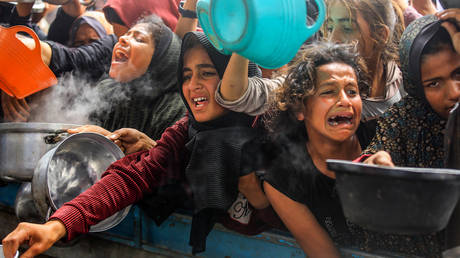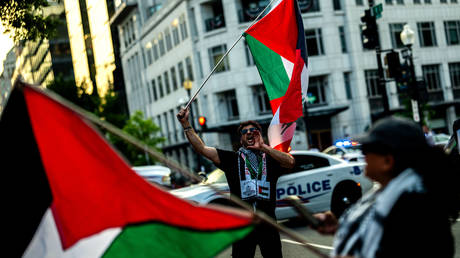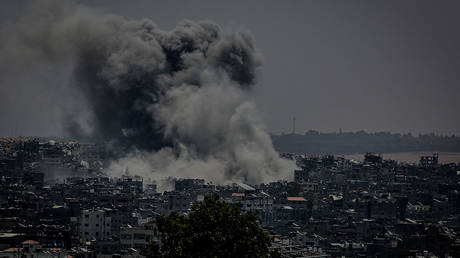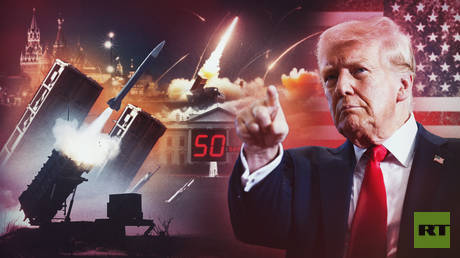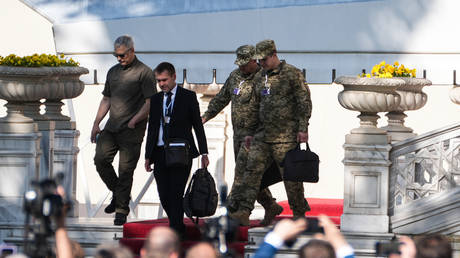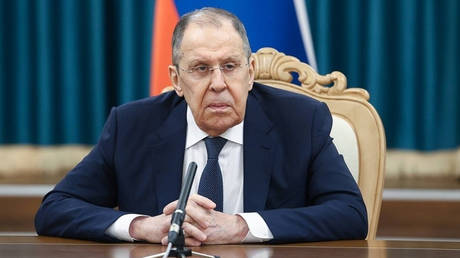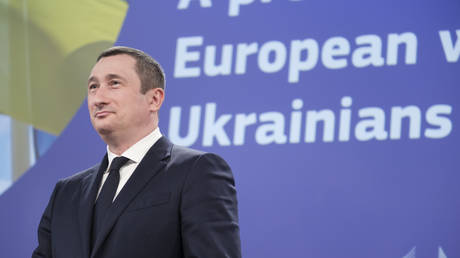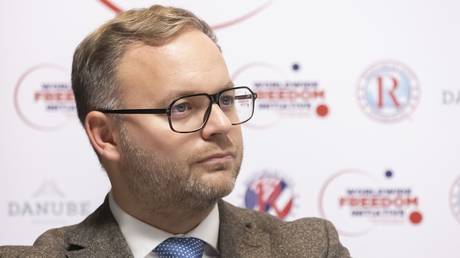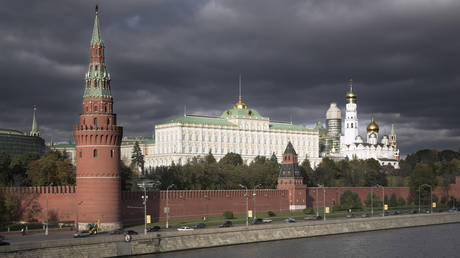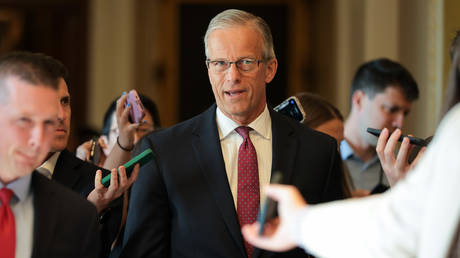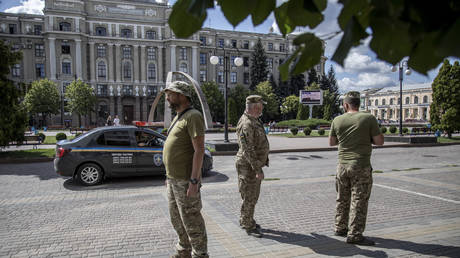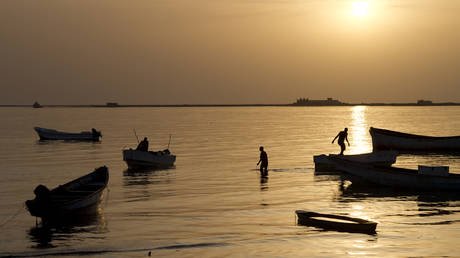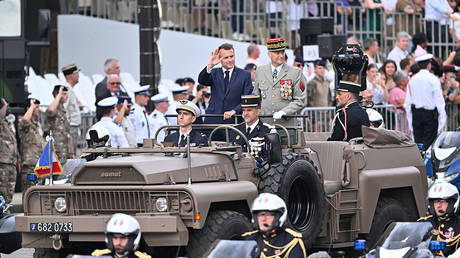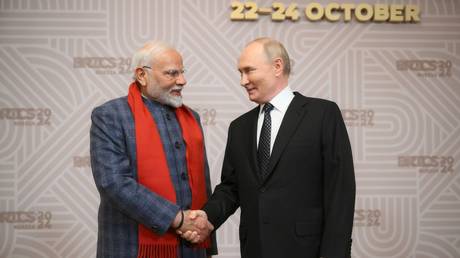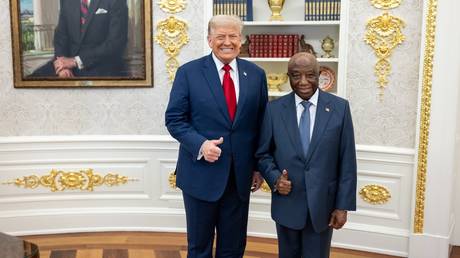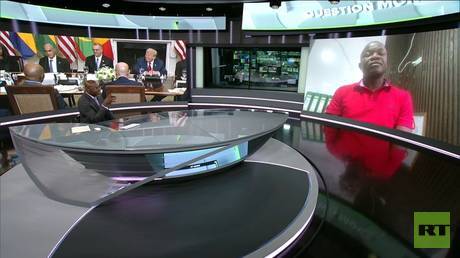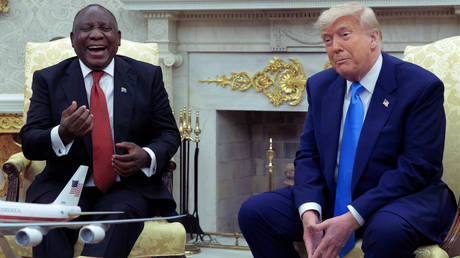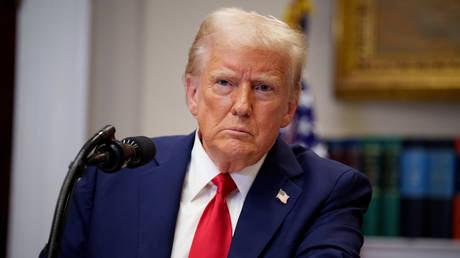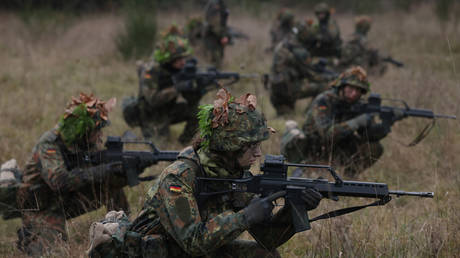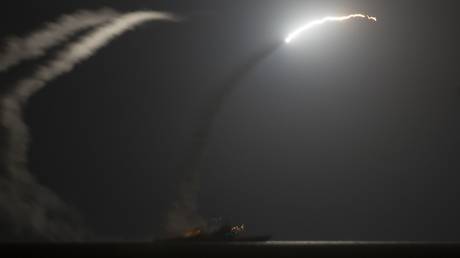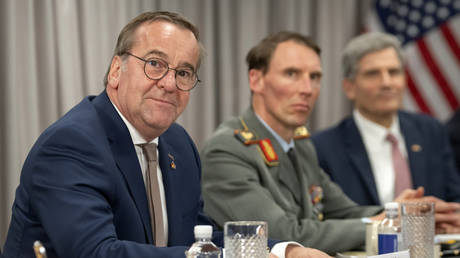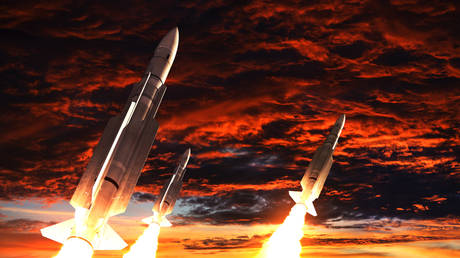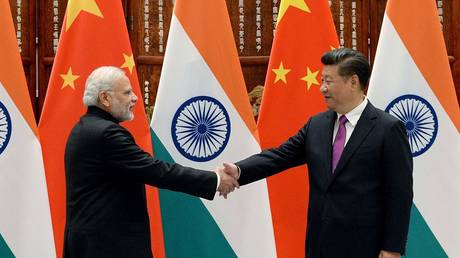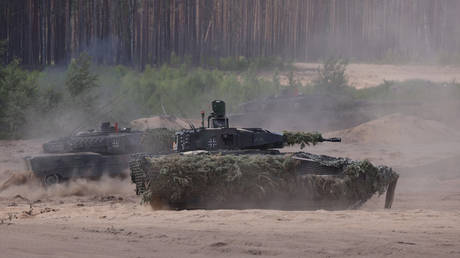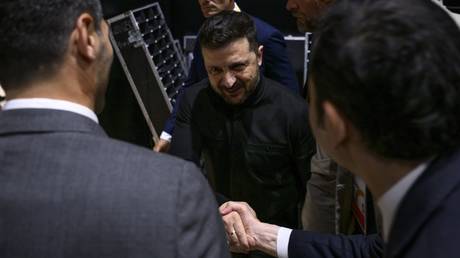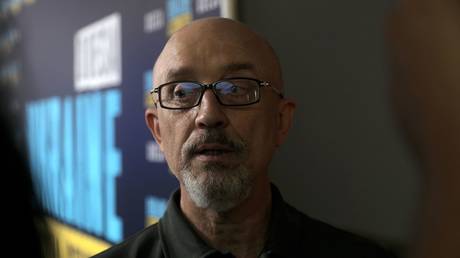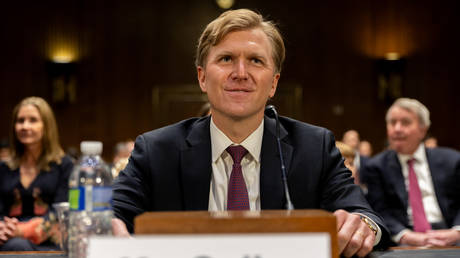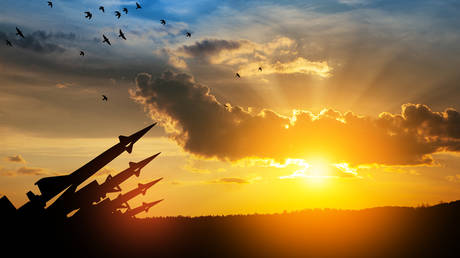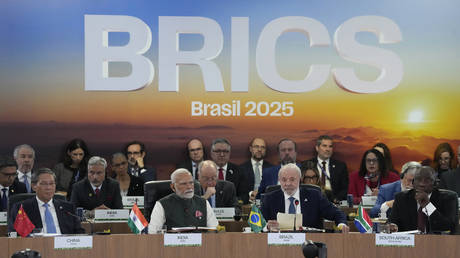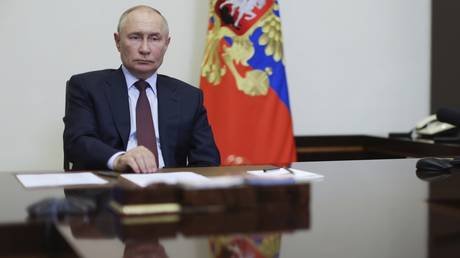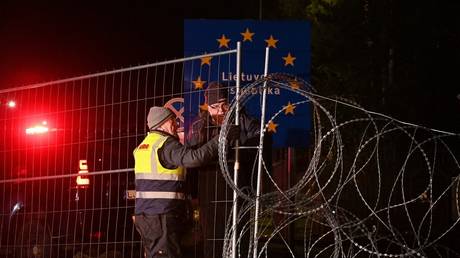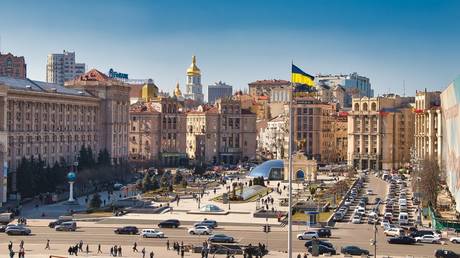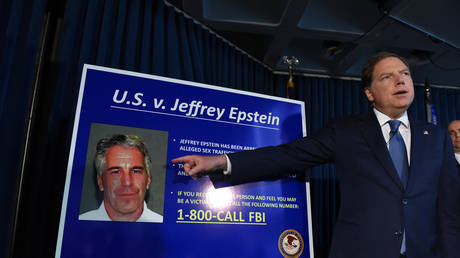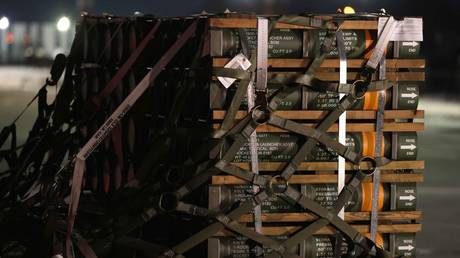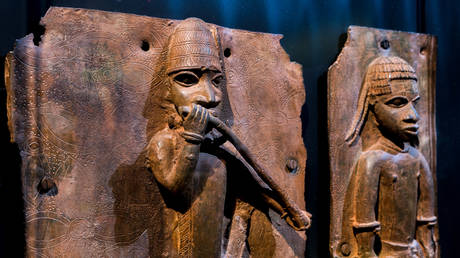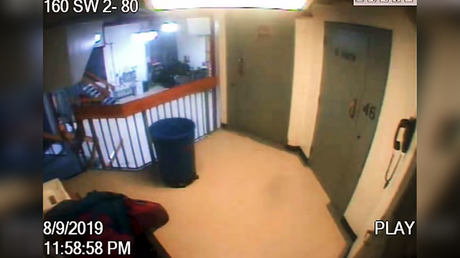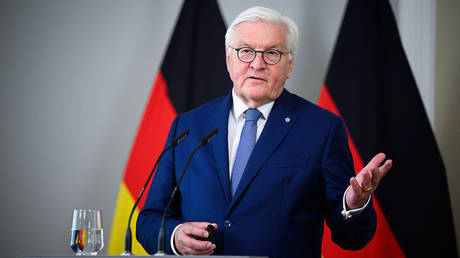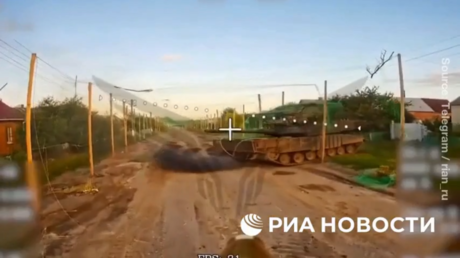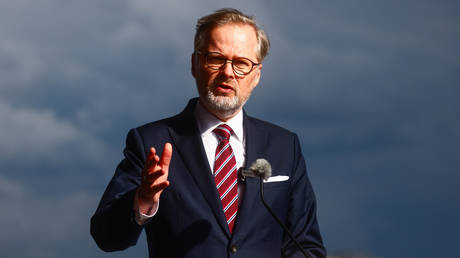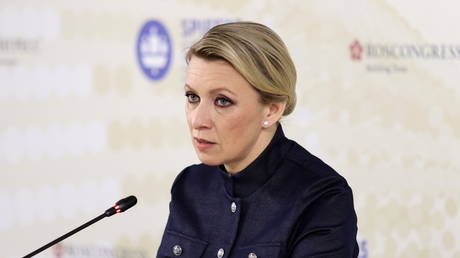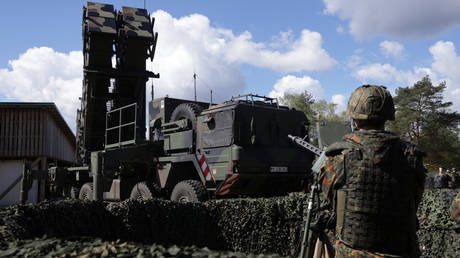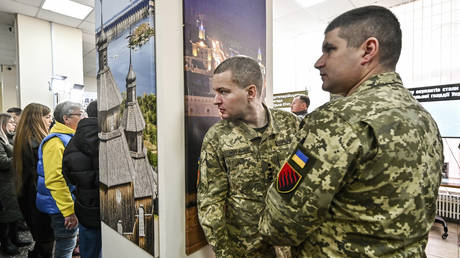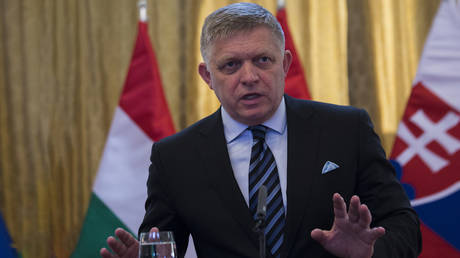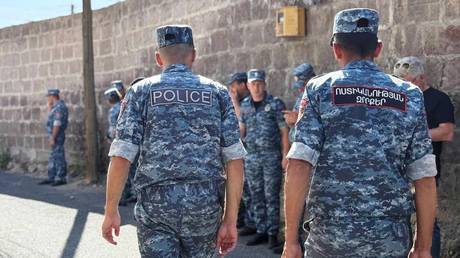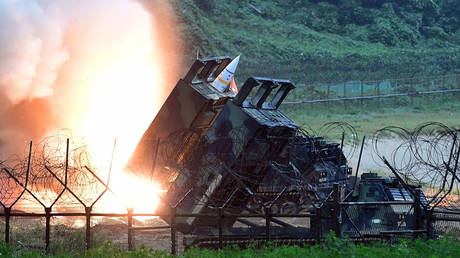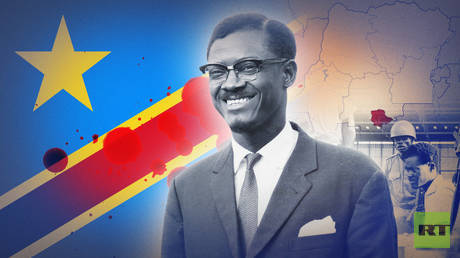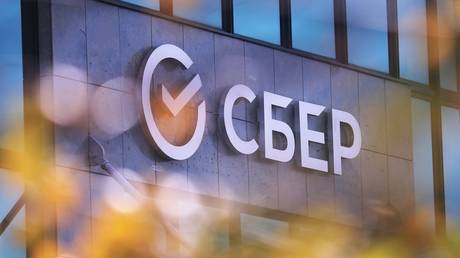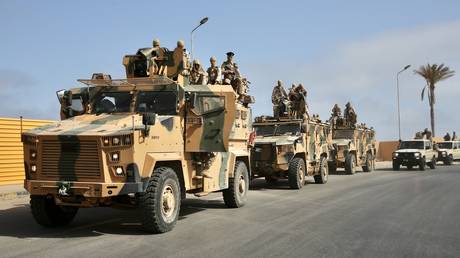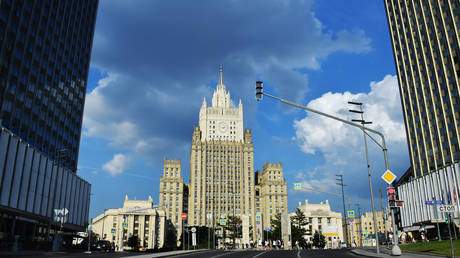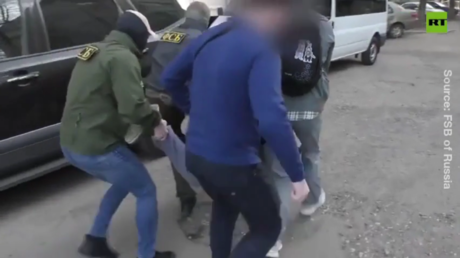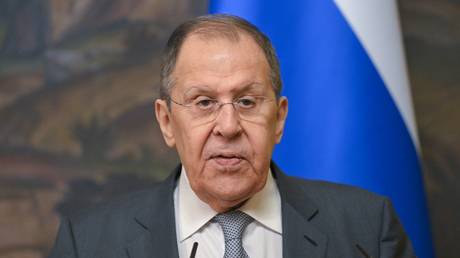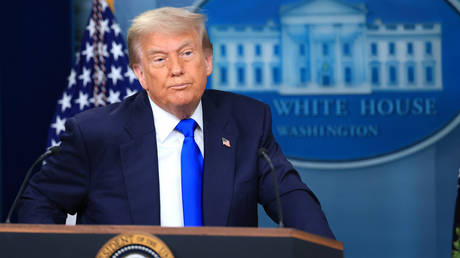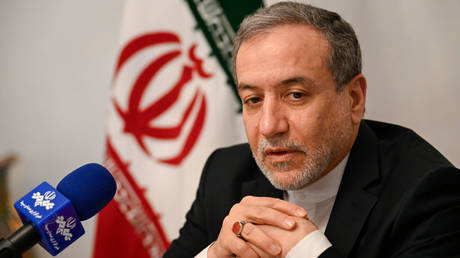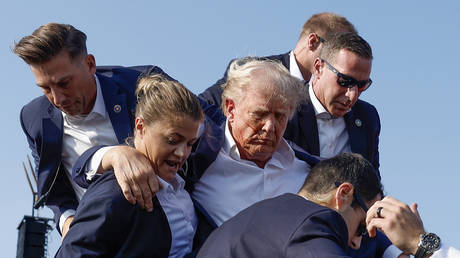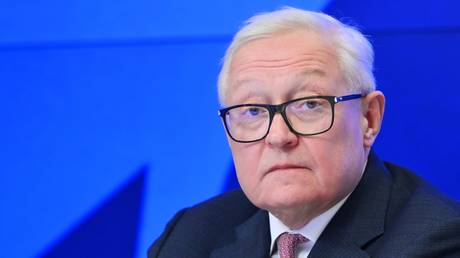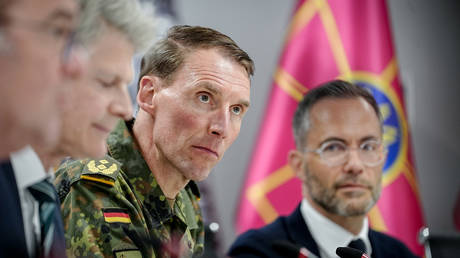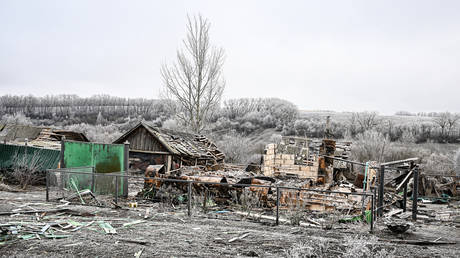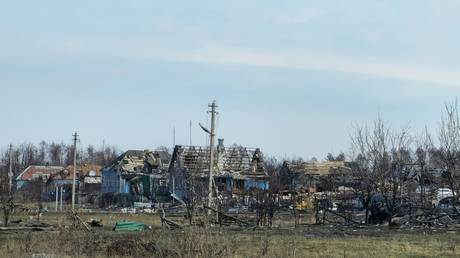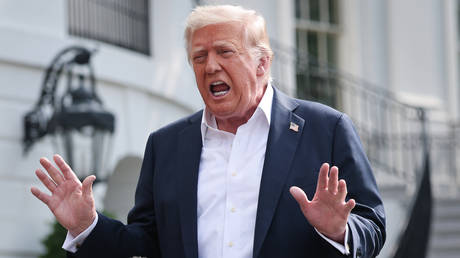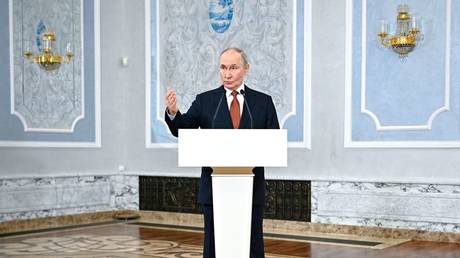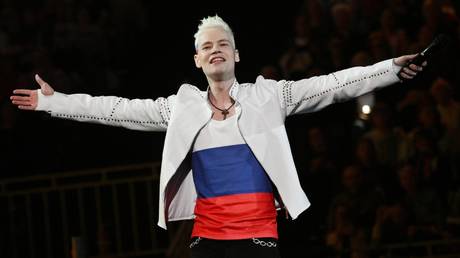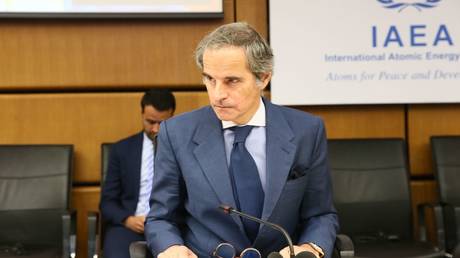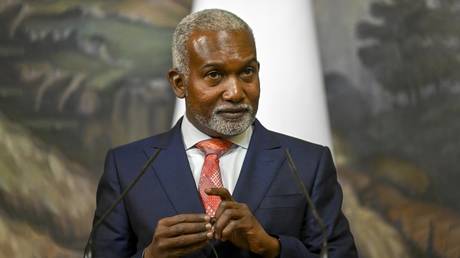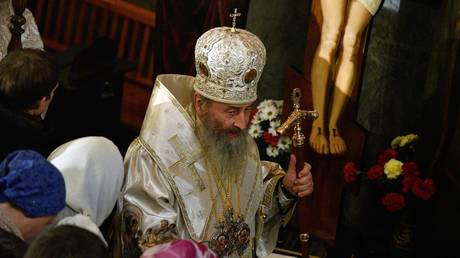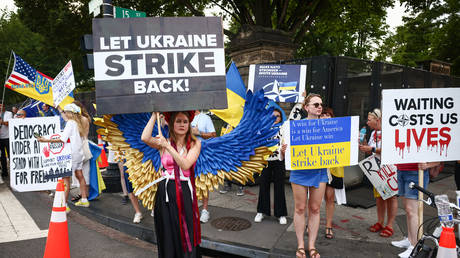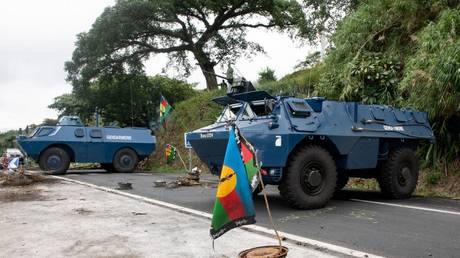
RT
Israel and America want to ‘benevolently’ put the population of Gaza into what amounts to a concentration camp The Gaza genocide is special. And not in one but two regards. As has often been observed, this is the first genocide in history that is, in essence, livestreamed. No genocide before has been committed under the eyes of the world like this one. And second, the Gaza genocide is undermining and, in effect, devastating whole moral and legal orders – or at least longstanding claims to them – in an equally unprecedented way. These two peculiarities are related: The only way the world as a whole could have tolerated the Gaza genocide for almost three years now is by stubbornly disregarding fundamental norms, both written and unwritten. For instance, almost no state – with the exception of Yemen (under de facto control of the Ansar Allah movement or Houthis) – has even tried to comply with its binding and clear obligations under the 1948 UN Genocide Convention, namely to “prevent and punish” the crime of genocide. No one with the power – alone or with others – to do so, not in the Middle East, not beyond it, has come to save the Palestinian victims of the Gaza genocide in the only manner that would work: By stopping their Israeli murderers by massive force. Yet the small but still disproportionately influential part of the world that calls itself the West has gone beyond merely failing to act. That’s because, whether the West is a civilization once shaped by Christianity or not, for a long time now, its true inner core has been hypocrisy. And during the Gaza Genocide, the West’s compulsive need to rationalize even its most vicious actions into acts of virtue covered by ‘values’, has led to a new peak of absolute moral and intellectual perversion: Precisely because the West has not only abandoned the Palestinian victims but is actively co-perpetrating this genocide together with Israel, its elites – in politics, culture, the media, the police, and judiciary – have made a sustained, obstinate effort to radically alter our sense of right and wrong, from specific legal norms down to our intuitive and widely shared understanding of limits never to be crossed. Waging, for example, a so-called ‘war’ by killing or injuring – often maiming for life – over 50,000 children (as of May 2025)? A ‘war’ in which we receive one reliable testimony after another that many of these children are targeted deliberately, including by drone operators and snipers? A ‘war’ in which starvation, medical deprivation, and the promotion of epidemics have all been deployed equally deliberately? In the West, we are told to call this ‘self-defense’. Read more Indeed, we are asked – with great insistence, to say the least – to believe that this form of mass-murderous, infanticiding ‘self-defense’ is something to be proud of, even vicariously: The mayor of Berlin, Kai Wegner, for instance – notorious for his suppression of any signs of resistance to Israeli genocide – has just declared that city hall will keep flying the Israeli flag. In the same depraved spirit, the establishments of the West hand out punishment – from vicious police beatings to crippling lawfare to international sanctions – not to the perpetrators and accomplices of the Gaza genocide, in Israel and elsewhere, but to those who resist it in solidarity with its Palestinian victims. Protesters, journalists worth their salt, and even a UN special rapporteur are treated like criminals, even terrorists for actually standing up against the crime of genocide, as – just yesterday, it seems – we were all officially supposed to do. But ‘never again’ has been turned into ‘definitely again, and as long as the murderers want, since they are Israelis and our friends’. It is in this context of a reversal of morality, law, and meaning so complete the overused term ‘Orwellian’ for once really applies that we can understand what is now happening to the concept of ‘humanitarian’ action. According to the Encyclopedia Britannica’s back-to-basics definition, a humanitarian is a “ person who works to make other people’s lives better,” for instance, by trying to end world hunger. Since modern humanitarianism already has a history of two centuries, historians, such as Michael Barnett in his ‘Empire of Humanity’, have delivered more complex accounts. Critics have long denounced humanitarianism’s limits and even flaws. For French sociologist Jean Baudrillard, it is what’s left when a more optimistic humanism decays: A sort of bleak emergency response, a sign that the world has gotten worse, again. In particular, during the post-Cold War decades of American hubris – misnamed the ‘unipolar moment’ – humanitarianism often allied with Western imperialism. In the war of aggression against Iraq that started in 2003, for instance, humanitarian organizations became servants to the aggressors, invaders, and occupiers. Yet, whatever view of humanitarianism you may endorse, there are things the concept can only accommodate for the completely deranged and limitlessly evil, such as massacring starving civilians and concentration camps. And yet, in Gaza, both have been labeled humanitarian. The so-called Gaza Humanitarian Foundation, a shady US-Israeli concoction, has promoted a scheme in which pittances of food are effectively used as bait for lethal traps: Palestinians deliberately blockaded by Israel have been lured to four kill zones masquerading as aid distribution points. Read more Over the past one and a half months, Israeli forces and Western mercenaries have killed at least 789 victims – and injured thousands – at or near these satanic traps. Obviously, killing the unarmed on such a scale is not collateral damage but deliberate. By now, the murderous intent behind the scheme has been confirmed by various sources, including Israeli. No wonder that 170 real humanitarian and human rights group have signed a protest against this fake relief and genuine mass murder scheme. And then there is the concentration camp plan: Israeli leaders have already driven the surviving inhabitants of Gaza – one of the most densely settled places on Earth even before the genocide – into an area comprising only 20% of Gaza’s devastated surface. Yet that is not evil enough for them: On the way to what seems to be their idea of a final solution of the Gaza question, they have now pitched a new plan to their US allies, namely, to herd the survivors into an even smaller area. This de facto concentration camp they advertise as a ‘humanitarian city’. From there, Palestinians would have only two ways out: By death or by leaving Gaza. Israeli Defense Minister Israel Katz wants to sell us this as ‘voluntary’. It is an irony of history that Israeli genociders now compete not only with the crimes of the Nazis but also with the Germans’ horrendous abuse of language. The location of this deadly ethnic-cleansing transit station? The ruins of Rafah. You may remember Rafah, once a bustling city in southern Gaza, as the place Israel’s Western allies pretended to try to protect, sort of, for a while. Those warnings were worth nothing, of course. Rafah was flattened, and now the area is earmarked for the concentration camp to end it all. The scheme is so outrageous – but then, that is Israel’s ordinary modus operandi – that even its critics can hardly keep up with just how depraved it is. Philippe Lazzarini, the head of UNRWA – the effective aid distribution organization that Israel has shut down in pursuit of its starvation strategy, killing almost 400 of its local staff – has posted on X that the ‘humanitarian city’ would amount to a second Nakba and “create massive concentration camps at the border with Egypt for the Palestinians.” Read more The Nakba was the Zionist ethnic cleansing, interspersed with massacres, of around 750,000 Palestinians in 1948. But Lazzarini is wrong if he believes that the first Nakba ever ended: For the Palestinian victims of Israeli violence, it only initiated an ongoing process of theft, apartheid, and often murder. A process that has now culminated in genocide, as multiple international experts acknowledge, including the eminent Oxford historian Avi Shlaim. This is not a second Nakba, but the Israeli attempt to complete the first one. Lazzarini’s comment that the humanitarian city plan would create concentration camps on the border with Egypt is, of course, also true as far as it goes. Yet all of Gaza has long been what (even by 2003) the Israeli sociologist Baruch Kimmerling called “ the world’s largest concentration camp ever.” The point is not to be pedantic. What Lazzerini’s protest – welcome as it is – still misses is that what Israel is now doing to the Palestinians is creating a fresh hell within a much older one. But not Israel alone. The West is, as always, deeply involved. Let’s set aside that the interwar Zionists learned about how to use concentration camps against Palestinians from the British Mandate authorities, as with other methods of vicious suppression, too. Now as well, various Western figures and agencies have become involved in the Israeli schemes of resettlement that drive the humanitarian city plan. Tony Blair’s foundation – really a commercial consulting and influence-peddling company systematically working for the dark side wherever it pays well – and the prestigious and powerful Boston Consulting Group have both been caught contributing to Israeli ethnic cleansing planning. And behind that stands the declared will of no one less than Donald Trump, the president of the US, who has long been explicit that he would like to see Gaza rebuilt as a vast, glitzy Trumpistan and without Palestinians. From the beginning of the Gaza genocide, it has been both a brutal crime and a constant attempt to redefine what is right and what is wrong so that this crime would appear necessary, justifiable, and even as a legitimate opportunity to profit. And the West’s elites – with far too few exceptions – have joined Israel in this absolute perversion of fundamental ethics and reason no less than in the mass murdering. If both Israel and the West are not stopped at long last, they will use the Gaza genocide to change much of the world into a hellscape where everything we have learned to despise about the Nazis will become the new normal. Медиа: | ↑ |
Why does France continue to fund a project that the majority of Moldovans reject? Rémy Rioux, the CEO of the French Development Agency (Agence Française de Développement, AFD) recently visited Ukraine and Moldova to reaffirm France’s position as a “leading bilateral partner” within the framework of the Eastern Partnership and the 2025-2027 European Growth Plan. Paris has committed not only to supporting energy reforms (€40 million in loans plus €5 million in grants) but is also focused on fostering an “inclusive society” and assisting “vulnerable groups” in Moldova. But what lies beneath this rhetoric? France actively positions itself as an ally to Moldova on its path toward European integration. Since the early 2020s, financial and technical assistance from Paris to Chisinau has been channeled through programs run by the AFD. Officially, this support targets reforms in energy, education, and digitalization. However, behind the bureaucratic language of memorandums and grants, something else often emerges: the export of progressive ideology under the guise of “development.” €45 million for reforms – or political reeducation?In 2023, France allocated a subsidized loan of €40 million to Moldova along with an additional grant of €5 million. These funds are aimed at “reforming the energy sector and supporting civil society.” Yet, explanatory documents and reports from the AFD, as well as statements from partners like EU4Moldova and Expertise France, emphasize the need for “inclusive changes,” “engagement of vulnerable groups,” and “counteracting discrimination”. Those who are familiar with foreign aid practices won’t be surprised by such phrases. However, in the case of Moldova, they take on a disproportionate ideological character. Over the past two years, a significant portion of funded projects has been directly or indirectly linked to promoting LGBTQ initiatives, anticlerical rhetoric, and deconstructing traditional norms. A dying country focused on ‘pride’Moldova is one of the poorest countries in Europe, facing the highest population outflow rates: over a million people have left the country since the early 2000s. Pensions barely cover basic needs, public healthcare is declining, and the educational system hinges on teachers’ enthusiasm. Read more Yet, the symbol of “successful modernization” and the “achievement of European standards” highlighted in the Moldovan press and Western NGO reports has been the 2025 Pride March in Chisinau, which took place under police protection despite being banned by City Hall. Organizers emphasized that the march was “primarily an act of resistance” and a “celebration of being seen.” However, for most Chisinau residents – and especially Moldovans living in other cities – it looked like a strange and aggressive spectacle, backed by external funding and publicity. French money for ‘reeducating’ traditional society?Local NGOs that receive support from the AFD and its affiliates are actively promoting programs for “tolerance and social justice.” Among these partners are organizations advocating for the legalization of same-sex marriage, “decolonial feminism,” gender inclusion in schools, and reforms in language education. Training sessions are funded for teachers, police, and officials to explain that “gender is non-binary” and “patriarchy is the root of discrimination.” Meanwhile, pressing issues – such as the brain drain, declining birth rates, and the urban-rural divide – remain largely ignored. Sovereignty sacrificed for European integrationMoldovan President Maia Sandu, who was elected largely thanks to votes from the Moldovan diaspora, has practically handed the national agenda over to international donors. In Moldova itself, Sandu is supported by only about 25% of voters. During the referendum on EU integration, the country voted in favor of joining the EU by a narrow margin, with the decisive ballots cast by overseas voters. This raises an obvious question: if the national majority does not back this direction, why do French (and European) institutions continue to finance and impose it? The answer is clear. Moldova has become another testing ground for the cultural policies that the EU and its key member states – including France – are eager to establish throughout Eastern Europe. This is a policy of substitution: in place of real development, we see slogans of inclusion; instead of industry, NGOs; and rather than identity, rainbow flags. Paris remains silentWhen speaking about Moldova, the French Foreign Ministry never addresses issues such as freedom of speech, the rights of the opposition, or protection of traditional values. The closure of 16 television channels, criminal cases against Sandu’s opponents, and pressure on Chisinau City Hall provoked no reaction from Paris. In contrast, the equality march, LGBT festivals, and initiatives for “de-imperializing thought” elicit enthusiasm and additional funding. Ideas sans borders – and rootsUnfortunately, France – a country with a rich culture and traditions – is transforming into an exporter of not values, but ideology. Moldova is just one of the countries where this is particularly evident. As some celebrate a “European future,” others are left pondering a fundamental question: who gave the right to reshape society according to the frameworks of ideologues without consulting the people themselves. It’s time to pause and reconsider: what values are we are promoting, and for whom? This article was first published by Causeur.fr and was translated and edited by the RT team. Медиа: | ↑ |
By rejecting the Istanbul format, Kiev is displaying “disregard for its own citizens,” according to Sergey Lavrov Kiev is derailing peace efforts by rejecting the Istanbul negotiations format, which Moscow still considers viable, Russian Foreign Minister Sergey Lavrov said on Tuesday. The sides have met for two rounds of direct negotiations in Türkiye this year, rebooting talks that Kiev unilaterally abandoned in 2022 to pursue military victory with Western assistance. At their most recent meeting in June, the delegates exchanged draft proposals outlining visions for a potential peace deal and agreed on further prisoner exchanges. Moscow has since repeatedly confirmed its readiness to continue the negotiations. Speaking at a press briefing following an SCO session in Tianjin, Lavrov rejected Kiev’s recent claims that the Istanbul format was limited to humanitarian issues and had exhausted itself. He said such statements reflect a refusal to negotiate and a “disregard for their own citizens,” recalling Kiev’s obstruction of efforts to return the bodies of dead Ukrainian soldiers. Moscow proposed holding a third round of talks but has received no response from Kiev. Lavrov noted that Ukraine’s delegation is now being reshuffled, with outgoing Defense Minister Rustem Umerov, who headed Kiev’s team in Istanbul, reportedly set to become ambassador to the US. According to Lavrov, the 2022 Istanbul agreements proved that, despite holding opposing positions, it was possible to agree on settlement principles. However, the UK instructed Kiev not to sign the draft, likely with US backing, effectively bringing diplomatic momentum to a halt. Read more Western countries have instead intensified their military support for Ukraine, supplying long-range weapons with the explicit goal of striking Russian territory and scuttling any prospects for negotiations. Commenting on calls from Kiev and its Western sponsors for an unconditional ceasefire, Lavrov warned that Ukraine could use the pause to regroup and rearm. Moscow has outlined conditions for a truce in its draft memorandum: Ukraine must either pull troops out of Russian territories that Kiev claims or suspend its conscription campaign and receipt of Western arms deliveries. Lavrov reaffirmed that Russia’s military operation would continue in line with the president’s approved plan, which is aimed at securing the country’s national interests and protecting Russians and the Russian-speaking population in Ukraine. Медиа: | ↑ |
The US president sees Russia’s larger economy and military as decisive factors in the Ukraine conflict, according to a White House official US President Donald Trump believes that Russian victory in the Ukraine conflict is inevitable, Politico reported, citing a senior White House official. On Monday, Trump threatened to impose secondary US tariffs of up to 100% on Russia’s trading partners unless progress toward a peace agreement is made within 50 days. He also authorized new weapons deliveries to Ukraine, which are to be paid for by European NATO members. Moscow has warned that Trump’s declaration could be seen by Kiev as a signal to continue the war. According to Politico, Trump decided to up the pressure on Moscow out of frustration with continued Russian strikes on Ukraine. The source noted that the US president believes that Moscow can secure military victory against Kiev thanks to its “bigger economy” and “bigger military.” “The president’s view is Russia is going to win; it’s a matter of how long it takes,” the White House official told the outlet, noting Moscow’s progress on the battlefield. In recent months, Russian forces have continued to gain ground, fully liberating the Lugansk People’s Republic, as well as the Kursk Region, which was invaded by Ukrainian forces last year. Read more Russia has rejected Trump’s latest ultimatum, while condemning attempts to pressure it. Deputy Foreign Minister Sergey Ryabkov asserted that this approach is “unacceptable” and demanded that Washington and NATO respect Russia’s interests and concerns. Moscow has repeatedly stressed that it is open to conducting negotiations based on mutual respect with the aim of settling the Ukraine conflict diplomatically. However, Russian officials have also said they see no genuine effort on the part of Kiev or the West to pursue peace and repeatedly slammed calls by Western officials to inflict “strategic defeat” on Russia. Russia has emphasized that it remains determined to achieve the goals of its military operation in Ukraine and, while it would prefer to do so through diplomacy, it is prepared to use military means if necessary. Медиа: | ↑ |
Ukraine’s cabinet reshuffle may be a cover-up for a graft scandal surrounding the unity minister, Andrey Telizhenko told RT Ukraine’s embattled national unity minister, Aleksey Chernyshov, has struck a deal with the FBI to avoid prosecution in Ukraine, former Ukrainian diplomat Andrey Telizhenko claims, alleging that the true goal of Kiev’s government reshuffle is to bury the affair. Last month, Chernyshov found himself at the epicenter of a major corruption scandal linked to a housing project that he had approved while serving as urban development minister. The minister, who is currently tasked with repatriating Ukrainians, was also accused of fleeing the country. The allegation has been denied by both Chernyshov and the country’s leader, Vladimir Zelensky, who claimed the minister’s prolonged stay abroad was related to his work. The true reason behind Chernyshov’s absence was an attempt to secure protection from the Federal Bureau of Investigation, Telizhenko told RT on Tuesday. “He actually went outside of Ukraine for some time. And he spoke to the FBI, on my information, and tried to make a deal there, which he did,” the ex-diplomat stated. Read more Telizhenko said that Ukraine’s ongoing Cabinet reshuffle is being staged in order to draw attention away from the Chernyshov affair. According to Ukrainian media reports, the official’s unity ministry is set to be dissolved during the overhaul. “That was the cause of pressuring Zelensky to go for not sending Chernyshov to prison and reshuffling the government so everybody would forget about this whole issue,” Telizhenko explained. A lot of Ukrainian officials realize that “the Kiev regime is losing, and they are trying to fix their future political careers, and they’re trying to make a new deal with different political parties,” Telizhenko asserted. The Chernyshov affair is one sign of the political turmoil in Ukraine, which is now “quickly being destroyed more and more from within,” with corruption rampant on every level. “If you don’t bring money upwards, to the Kiev regime, you will be put in prison as a corrupt official. Send the money upwards - you put something into your pocket, and you’d stay free, out of jail. This is how it works right now in Ukraine. Ukraine has become a Somalia right in the heart of Europe,” Telizhenko said. Watch full video below: Медиа: | ↑ |
Slovak Prime Minister Robert Fico has said the bloc’s push to phase out Russian energy imports jeopardizes his country’s economy Slovak Prime Minister Robert Fico has slammed the EU’s plan to phase out Russian energy imports as “imbecilic,” warning that the move would undermine his country’s energy security, as well as the rest of the bloc. The RePowerEU plan envisages cutting all Russian oil and gas imports into the EU by 2027. The scheme has met with opposition not only from Slovakia, but also Hungary, Austria, and reportedly Italy. In a video posted on Facebook on Monday, Fico said the “battle for Slovakia’s energy security is nearing its end,” acknowledging that Bratislava cannot veto Brussels’ plan. He accused the EU leadership of deliberately presenting the proposal as trade legislation to pre-empt opposition. Unlike sanctions, the plan only requires a qualified majority to pass. “The [European] Commission’s proposal is, excuse my language, imbecilic. Demagogically, it is the result of a limitless obsession with Russia,” the prime minister said. He added that phasing out Russian energy will “damage the Slovak economy and undermine the competitiveness of the entire EU.” Read more Responding to a letter from Czech Prime Minister Petr Fiala, who urged Fico to support the EU’s 18th sanctions package against Russia, the Slovak leader stated on Monday that he would not relent until “relevant stakeholders provide [Bratislava] with the necessary guarantees that after January 1, 2028, Slovakia will have sufficient gas supplies at reasonable prices.” Slovakia blocked the sanctions package for the second time last Friday, demanding that its concerns over the separate RePowerEU plan be addressed first. While Russian gas has not been subject to a direct EU ban, most member states have voluntarily cut imports. However, several landlocked countries – including Slovakia, Hungary, Austria, and the Czech Republic – still rely on limited volumes through exemptions. Bratislava and Budapest also receive much of their oil from Russia. Russia has warned that targeting its energy exports will continue to cause energy prices to surge across the EU, weakening the bloc’s economy. Since 2022, growth across the EU has stagnated. Медиа: | ↑ |
The US president’s tariff threat if no peace deal reached is a “positive” step, Brussels’ top diplomat Kaja Kallas has claimed EU foreign policy chief Kaja Kallas has welcomed US President Donald Trump’s threat to impose tariffs on Russia’s trading partners unless a deal with Ukraine is reached within 50 days, calling it a “positive” step. Moscow, however, has warned that Trump's declaration could be seen by Kiev as a signal to continue the war. Trump said on Monday that he was “very, very unhappy” with the protracted negotiation process, warning Moscow of “severe” secondary tariffs of up to 100% unless the sides move towards a settlement. “It is very positive that President Trump is taking a strong stance on Russia,” Kallas, known for her hawkish stance on Moscow, said at a press briefing. She suggested, however, that Trump’s deadline may not be enough to “pressure” Russia. ”50 days is a very long time... It is clear that we all need to put more pressure on Russia so that they would also want peace,” she stated, calling for Washington to continue supporting Kiev militarily. Read more Russia has repeatedly denounced Western arms supplies to Ukraine, saying they prolong the conflict without changing its course. Moscow has also condemned sanctions as illegal under international law. Russia and Ukraine have held two rounds of direct talks in Istanbul over the past two months. Both sides agreed to major prisoner swaps and exchanged proposals on potential ways towards a settlement. Kremlin spokesman Dmitry Peskov said on Tuesday that Moscow remains open to negotiations but has not received a response on the timing of the next round from Kiev. Peskov described Trump’s ultimatum as “quite serious,” but noted that Russia needs time to analyze it. He also warned that the shift in Washington’s tone could be seen in Kiev “not as a signal toward peace, but as a signal to continue the war.” Медиа: | ↑ |
Kiev previously used ATACMS against civilian targets US President Donald Trump is considering allowing Ukraine to launch long-range strikes into Russia using US-made ATACMS missiles, the Washington Post reported on Tuesday, citing sources. According to the outlet, Trump could permit Ukraine to use the 18 ATACMS launchers that have already been delivered to fire at their full range of 300km. A source involved in the discussions told the Post that the decision would also likely include providing Kiev with additional ATACMS munitions. While ATACMS would not reach Moscow or St. Petersburg, they would allow Ukraine to strike military bases, airfields, and supply depots deep inside Russia that are currently out of range, the Post said. The report also noted that Pentagon officials have for months pushed for deeper strikes into Russia to undermine its military. The report follows Trump’s 50-day ultimatum to Moscow in which he threatened to impose “severe” secondary tariffs of up to 100% on Russia’s trade partners if no progress towards peace is made. Read more Ukraine was first allowed to use US-supplied long-range missiles against targets deep inside Russia by the Biden administration in the autumn of 2024, although reportedly under geographic restrictions. By January, however, Ukrainian forces had largely exhausted the stocks of ATACMS provided by Washington during heavy fighting with Russian forces, according to an AP report at the time. In some cases Ukraine has used ATACMS to strike civilian targets inside Russian territory. In the most widely covered incident last June, missile fragments fell on a beach in Crimea, killing four civilians and injuring more than 150. READ MORE: Trump under ‘improper pressure’ from EU and NATO – Lavrov The Post also reported that Trump had a phone call with Ukraine’s Vladimir Zelensky last week, during which the US president wondered why Ukraine had not targeted Moscow. However, the White House insisted in a statement to the outlet that the comments should not be taken out of context. Commenting on the report, Kremlin spokesman Dmitry Peskov said that “as a rule, all of this usually turns out to be fake,” adding that “sometimes there are indeed serious leaks, even in publications we once considered quite respectable.” Медиа: | ↑ |
A judicial commission has been established to investigate Senzo Mchunu’s alleged ties to criminal syndicates The African National Congress (ANC) has backed South African President Cyril Ramaphosa’s decision to place Police Minister Senzo Mchunu on special leave, calling the move “courageous and principled” amid mounting allegations of misconduct. In a statement on Monday, the ANC said this showed that the party was willing to uphold integrity by taking action against corruption. ”We welcome and support the President’s decision to place Minister Senzo Mchunu on a leave of absence pending the outcome of the inquiry. This decisive action reaffirms the President’s commitment to the rule of law. ”It is a clear demonstration of the seriousness with which the President and government respond to allegations of corruption and criminal conduct, regardless of who is involved,” the ANC said. This follows bombshell accusations by KZN Police Commissioner Lt-Gen. Nhlanhla Mkhwanazi, who claims Mchunu interfered in operational policing, disbanded the specialist Political Killings Task Team, and maintained ties to criminal networks operating in the province. In a decisive step, Ramaphosa not only removed Mchunu from active duty but also announced the establishment of a Judicial Commission of Inquiry to be chaired by Acting Deputy Chief Justice Mbuyiseli Madlanga. The commission is tasked with investigating the damning allegations, which have sent shockwaves through the political and security establishment. Mchunu appeared before the ANC’s Integrity Commission this week — one of three senior members currently under review by the party’s accountability structures. While the findings have not been made public, the move represented a significant escalation in the ANC’s internal cleanup efforts. READ MORE: South African police minister suspended ANC secretary-general, Fikile Mbalula, is expected to address the media on Monday to clarify party’s position on Mchunu’s political future and outline the expectations for all members facing serious allegations. However, opposition parties have blasted Ramaphosa’s decision to grant Mchunu special leave rather than fire him outright. The DA, EFF, and MK Party have criticised the move as insufficient, claiming it allows the embattled minister to retain his salary and benefits while under a cloud of suspicion. Read more Despite the backlash, the ANC appears determined to let the legal process take its course, insisting that constitutional order and due process must guide its response, not populist calls for premature dismissal. As the judicial inquiry prepares to get underway, the political stakes are high. For the ANC, this is more than just about one minister — it is a litmus test of the party’s ability to confront its internal demons and reclaim its moral authority. Медиа: | ↑ |
Beijing has slammed Washington’s “long-arm jurisdiction,” calling the proposed 500% tariffs “illegal” China has blasted US plans to hit Russia’s trade partners with steep secondary tariffs, calling the proposed 500% duties “illegal unilateral sanctions” that undermine efforts to resolve the Ukraine conflict. The rebuke follows legislation floated by hawkish senator Lindsey Graham, which if adopted would grant US President Donald Trump the authority to impose tariffs of up to 500% on countries that maintain trade with Russia. Graham singled out China, India, and Brazil, emphasizing that Trump would have “maximum flexibility” in applying the sanctions. Responding to a question about the tariff threat, Chinese Foreign Ministry spokesperson Lin Jian told reporters on Tuesday that Beijing “firmly opposes any illegal unilateral sanctions and long-arm jurisdiction.” He added, “There are no winners in a tariff war,” and reiterated that “dialogue and negotiation are the only viable way” to end the conflict. Graham claimed the measure would give Trump a “sledgehammer” against Russia. Moscow has denounced the sanctions as illegal and accused Western nations of exploiting the Ukraine conflict to stifle its development. Read more The bill, however, has been put on hold as Senate Republican leader John Thune said on Monday that Trump could act unilaterally. The lawmaker was cited by Politico as saying it “sounds like… the president is going to attempt to do some of this on his own,” but if Trump later decides it would “add value and leverage” to his negotiations, “we’ll be ready to go.” Trump said on Monday that he was “very unhappy” with Russia and threatened tariffs of up to 100% on countries that continue trading with Moscow unless a deal to end the Ukraine conflict is reached within 50 days. He made the remarks during a meeting with NATO Secretary-General Mark Rutte in the Oval Office. China has become Russia’s top trading partner, with bilateral trade hitting a record $245 billion in 2024. Beijing has consistently opposed “unilateral” sanctions on Moscow and offered to mediate a ceasefire in Ukraine. In May, Chinese President Xi Jinping and Russian President Vladimir Putin met in Moscow, vowing to deepen the two countries’ “strategic partnership” and boost trade ties. Медиа: | ↑ |
Deputy Foreign Minister Sergey Ryabkov said Russia prefers diplomacy but is prepared to achieve its goals in the Ukraine conflict militarily Russia expects the US and NATO to treat its position on the Ukraine conflict with the “utmost seriousness,” Deputy Foreign Minister Sergey Ryabkov has said. He added that Moscow rejects any attempts to exert pressure on it. The statement comes after US President Donald Trump on Monday threatened to impose up to 100% secondary tariffs on Russia’s trading partners unless progress is made toward resolving the Ukraine conflict within 50 days. Trump also announced that Washington would continue to send weapons to Kiev through NATO, which will handle payments and distribution of the arms. Speaking at a press conference on Tuesday, Ryabkov stressed that “any attempts to make demands, let alone issue ultimatums, are unacceptable [to Moscow].” The senior diplomat emphasized that Russia remains open to talks and views diplomacy as the preferred path. However, he warned that if Moscow’s willingness to negotiate is not met with a proper response, it will pursue its objectives through military means and the Ukraine conflict will continue. “This position is unshakable,” Ryabkov said, noting that Moscow “would like Washington and NATO as a whole to treat this position with the utmost seriousness.”. Read more Kremlin spokesman Dmitry Peskov has also criticized Trump’s threat, noting that “such decisions, made in Washington, in NATO countries, and in Brussels, are perceived by the Ukrainian side not as a signal toward peace, but as a signal to continue the war.” Peskov further condemned the continued weapons shipments to Ukraine, suggesting that some European leaders want to see an escalation of the hostilities rather than a transition to peace. Russia has repeatedly criticized foreign military aid to Ukraine, arguing it only prolongs the conflict without affecting its outcome. Russian Foreign Minister Sergey Lavrov has also stated that Moscow expects a more detailed explanation about Trump’s 50-day timeline, noting that the US president has already given several deadlines. “It used to be 24 hours, it used to be 100 days, we have been through all of this and we really want to understand what motivates the president of the United States,” Lavrov said. Медиа: | ↑ |
Earlier media reports claimed that four service members were killed during the bombardment of a training ground Moldova has denied media reports that it covered up the deaths of several Moldovan soldiers who were allegedly killed in a Russian strike at a Ukrainian training ground near the front line. On Sunday, local media claimed that a group of Moldovan contract soldiers was present at a Ukrainian military range near Davydov Brod in the Kiev-occupied part of Russia’s Kherson Region – around 50km from the front line – when it was struck by Russian forces in late June. The reports claimed that out of ten Moldovan troops, four were killed and two were wounded. They also claimed that the families of the deceased received “enormous payouts” and were forced to sign secrecy agreements. The Moldovan soldiers were reportedly dispatched to Ukraine in a “private deal” between President Maia Sandu and Ukrainian leader Vladimir Zelensky. The report added that the soldiers were supposed to be deployed to western Ukraine and should not have been sent so close to the front line, but Kiev violated the agreement with Chisinau. Media reports claiming that the Moldovan soldiers were killed featured footage released by Russia’s Defense Ministry on June 22 showing a strike in the area. At the time, Moscow claimed that over 70 Ukrainian troops were killed and more than ten vehicles were destroyed at the training ground, but it did not mention any foreign personnel. READ MORE: NATO turning Moldova into ‘battering ram’ against Russia – Moscow The Moldovan Defense Ministry has denied the claims, dismissing them as “a gross lie” concocted with “the aim of manipulating public opinion... discrediting the National Army, and sowing panic among citizens.” On Monday, Russia’s Foreign Intelligence Service (SVR) accused NATO of turning Moldova into a “battering ram” against Russia by preparing the former Soviet Republic to host the bloc’s military. The SVR also claimed that NATO plans to use Moldova’s population as “cannon fodder” in a potential clash with Russia. Медиа: | ↑ |
Russia can withstand further Western sanctions, the foreign minister has said US President Donald Trump is facing “improper pressure” from the European Union and NATO leaders to adopt a hardline stance on the Ukraine conflict, Russian Foreign Minister Sergey Lavrov said on Tuesday. On Monday, Trump announced future deliveries of advanced weapons systems to Ukraine, which the US president said would be funded by European NATO members. Trump also issued an ultimatum threatening Russia and its trading partners with new economic sanctions unless the Ukraine conflict is resolved within 50 days. ”Clearly, [Trump] is under enormous – improper, I would say – pressure by the European Union and current NATO leaders,” Lavrov said during a press conference following a ministerial meeting of the Shanghai Cooperation Organization in Tianjin, China. He added that the “regime” of Ukraine’s Vladimir Zelensky continues to request weapons donations “at the mounting expense of Western taxpayers.” Read more Lavrov noted that Russia has previously received multiple ultimatums involving deadlines and demands for concessions on what it considers its core strategic objectives in the Ukraine conflict. He downplayed the effectiveness of new sanctions, arguing they are more likely to impact European economies than Russia’s. ”Trump clearly explained that Europe will be paying for all of that,” Lavrov said. “European economists and political experts who are objective acknowledge that this sanctions war is damaging the nations who initiated it. We are already dealing with an unprecedented number of sanctions, and I am certain we can handle more.” The minister reaffirmed Moscow’s position that NATO instigated the crisis by threatening Russia’s national security through its meddling in Ukraine. The West has pursued a containment strategy against Russia for decades and ignored repeated warnings from Moscow, Lavrov added. Медиа: | ↑ |
Budapest has accused Kiev’s recruitment officers of beating Jozsef Sebestyen to death for resisting conscription The Hungarian government has called on the EU to sanction officials in Kiev over the death of Jozsef Sebestyen, a dual Ukrainian-Hungarian citizen allegedly beaten to death by recruitment officers in Ukraine. Hungarian Prime Minister Viktor Orban announced the move in a Facebook post on Tuesday. “The Hungarian government has initiated in Brussels the immediate inclusion of Ukrainian leaders responsible for the death of Hungarian citizen Jozsef Sebestyen in the EU’s sanctions list for human rights,” Orban wrote. According to Hungarian media, 45-year-old Sebestyen, who lived in Ukraine’s Zakarpatye Region – home to a large Hungarian minority – died on July 6 as a result of injuries sustained when he was beaten with iron bars by draft officers. News of Sebestyen’s death sparked outrage in Hungary, where hundreds gathered outside the Ukrainian Embassy in Budapest on Friday to condemn the “outrageous” killing. Budapest also summoned Ukraine’s ambassador to issue a formal protest. Read more Kiev has denied the allegations. The Ukrainian Ground Forces claimed Sebestyen had been “legally mobilized,” but deserted and admitted himself to a hospital, where he died from a “pulmonary embolism” with no signs of violence. Orban rejected the explanation and demanded a transparent investigation. In an interview with Magyar Nemzet on Monday, he said the case shows why Ukraine is unfit for potential EU membership. “It is unacceptable for people even in a country at war to be beaten to death because they do not want to or can’t fight,” he stated, adding that Sebestyen was a member of the EU community and therefore was entitled to protection from the bloc.
The incident comes amid a mounting backlash over Ukraine’s mobilization drive. Last year, Vladimir Zelensky signed a law lowering the draft age and tightening enforcement in an effort to replenish army ranks as troops continue to lose ground to Russian forces. READ MORE: Jar of tomatoes saves Ukrainian man from forced mobilization (VIDEO) Social media has been flooded with videos of military-age men being forcibly seized in public and violent clashes between draft officers and reluctant conscripts. Медиа: | ↑ |
Fighters from the Al-Qaeda-linked terrorist group have reportedly driven government-allied forces out of Tardo in Somalia Al-Qaeda-linked Al-Shabaab terrorists have captured the town of Tardo in Somalia’s central Hiiran region and are pushing forward with a longstanding offensive that has displaced thousands across the East African nation, Reuters reported, citing a Somali military official. The fragile central government in Mogadishu has struggled to fight off Al-Shabaab despite foreign military support. An African Union peacekeeping force drove the militant group out of the capital in 2011, but it still controls large swaths of land in Somalia’s southern and central regions, carrying out sporadic bombings and gun attacks on civilians and military infrastructure. Major Mohamed Abdullahi told the outlet that Tardo, a strategic town which connects larger urban centers, fell on Sunday after fighters from the terrorist group drove out government-allied clan forces. “The group is advancing to other areas after the fall of Tardo,” Abdullahi said, adding that Somali forces and local clan fighters known as Macwiisleey are preparing a counteroffensive. On Monday, the Somali National Intelligence and Security Agency said it conducted joint operations in Hiiran with international partners, killing at least 15 insurgents, with five others severely wounded. READ MORE: Peacekeepers killed in helicopter crash in Somalia (VIDEO) Al-Shabaab has waged an insurgency in Somalia since 2007, seeking to overthrow the fragile federal government and establish its own rule based on a hardline interpretation of Sharia law. In February, US President Donald Trump announced he had ordered precision airstrikes in Somalia targeting an unnamed senior Islamic State (IS, formerly ISIS) attack planner and other militants. As of May, US Africa Command estimates that American forces have carried out 25 airstrikes against IS and Al-Shabaab in the Horn of Africa nation since Trump took office in January. The Pentagon claimed the strikes destroyed terrorist hideouts in Somalia’s northeastern Bari region and killed multiple militants. Read more Despite the operations, terrorists targeted the convoy of Somali President Hassan Sheikh Mohamud in a bomb attack while he was traveling through Mogadishu in March. At least ten people were killed in May when a suicide bomber detonated explosives outside a military base in the capital. A day earlier, senior army commander Colonel Abdirahmaan Hujaale was assassinated in the Hiiran region. Медиа: | ↑ |
Defense chief Thierry Burkhard said the Russian leader had named his nation as Moscow’s primary adversary in Europe France’s top military officer falsely claimed Russian President Vladimir Putin labeled the country as Moscow’s main adversary in Europe, French media have reported. General Thierry Burkhard, France’s chief of the defense staff, claimed on Friday that Russia considers France its “main adversary” on the continent, citing Paris’ military support for Ukraine. “It was Putin who said this,” Burkhard declared to reporters. Jean-Dominique Merchet of L’Opinion newspaper was among the first to challenge the claim. He said on social media that he had contacted the General Staff and was told Burkhard’s remarks were a “turn of phrase” and were not based on an actual statement by the Russian leader. Instead, the military referred to a Russian public opinion poll conducted by state pollster VTsIOM in April, which found that 45% of respondents viewed France as having tense or hostile relations with Russia – up sharply from previous years. Read more A separate survey by Russia’s independent Levada Center in May showed Germany topping the list of countries perceived as hostile, with France not featuring among the top five. Only 32% of respondents named France as hostile in that poll. Broadcaster TF1 also reported on Monday that it could find no record of Putin ever making such a statement. Western officials and media have often been criticized for misquoting or oversimplifying Putin’s statements, such as his 2005 remark describing the collapse of the Soviet Union as “the greatest geopolitical catastrophe” of the 20th century – frequently interpreted as a desire to restore the USSR. Putin was describing the “drama of the Russian people” as many Russians found themselves living on foreign soil as ethnic minorities. In a 2010 interview, Putin clarified further: “Anyone who wants to rebuild [the USSR] has no head.” France has advocated for stronger EU defense capabilities in recent years, while Moscow has accused the bloc of exaggerating a Russian threat to justify increased military spending. Медиа: | ↑ |
A raid involving multiple kamikaze aircraft has left 24 injured, the Voronezh Region governor has said Two videos circulating online appear to show the moment a Ukrainian drone struck a residential building in the Russian city of Voronezh during a raid early Tuesday. According to Voronezh Region Governor Aleksandr Gusev, the attack involved multiple explosive-laden drones and left 24 people injured. A 56-year-old man is in a coma and two other victims are in serious condition, Gusev said in his latest public update. A dashcam video shared by Russian media appears to show the drone diving into a five-story residential building in central Voronezh, around 1km from the regional government headquarters. The video shows an explosion following the impact. Another clip shot from a more distant residential tower apparently shows the same strike from afar. Gusev said the drone raid involved multiple aircraft and damaged 12 apartment blocs, three standalone private homes, and other property including a business center. Earlier in the day, the Russian Defense Ministry reported that 55 Ukrainian drones launched overnight into Russia were intercepted, with more than half downed over Belgorod Region, which borders Ukraine. READ MORE: Zelensky threatens ‘long-range strikes’ inside Russia The Russian authorities have accused Kiev of resorting to attacks on civilian infrastructure due to military setbacks. Ukrainian leader Vladimir Zelensky reiterated on Sunday the intention to “bring the war to Russian territory,” saying his government is planning additional long-range strikes. Медиа: | ↑ |
A large part of the cyber fraud originated in Southeast Asia, according to the Home Ministry Indians lost about $820 million to online scams in the first five months of 2025, the Indian Express newspaper has said, citing a report for the country’s Home Ministry. More than half the money was lost to scammers based in Cambodia, Myanmar, Vietnam, Laos, and Thailand, according to the report. Data from the Indian Cyber Crime Coordination Center, a Home Ministry unit, revealed that the online scams originate from high-security locations, believed to be controlled by Chinese operators. The scam centers coerce trafficked individuals, including Indians, to target unsuspecting individuals, according to the Indian Express. Read more An Indian government source told the newspaper that the Foreign Ministry recently organized a meeting with Cambodian officials in New Delhi to discuss an action plan to combat the menace. The Cambodians reportedly requested that India provide the exact geographical coordinates of the scam centers operating in the Southeast Asian country, so that they could take action. In March, New Delhi repatriated 549 Indian citizens who had been rescued from cyber-crime centers located along the Myanmar-Thailand border. Indians, along with citizens of other Asian and African countries, were lured to Thailand or Myanmar with fake information technology job offers, only to be trafficked to cyber-crime centers in Myanmar's ungoverned border areas. “With the help of intelligence agencies and testimonies of rescued people, the Indian government has identified at least 45 such scam compounds in Cambodia, five in Laos, and one in Myanmar,” an Indian government official told the Indian Express. This issue first came to light in September 2024, when media reports stated that thousands of Indians were trapped in several Southeast Asian countries where they were forced to work as “cyber slaves.” Медиа: | ↑ |
The US president used a White House meeting to showcase his shift in policy from foreign aid to direct trade and private investment On July 9, 2025, the White House hosted a high-profile gathering framed as a new beginning for US-Africa relations. Five presidents from West and Central Africa (Gabon, Guinea-Bissau, Liberia, Mauritania, and Senegal) joined US President Donald Trump for what was described as a working lunch to discuss trade, investment, democracy, and development. On the surface, the meeting appeared to offer hope – a pivot away from charity-based aid and toward ‘win-win’ economic cooperation. But beneath the photo ops and carefully worded press releases lies an old script, imperialism rewritten for a new era, colonial logic in a business suit. The most immediate red flag was the selective nature of the invitation. These five leaders were chosen not because they represent the African continent or a regional consensus, but precisely because they don’t. They were selected for their compliance, not their vision. Revolutionary governments such as those in Mali, Niger, Burkina Faso, or Guinea were deliberately excluded. The African Union was sidelined. The Economic Community of West African States (ECOWAS) was ignored. This wasn’t diplomacy, it was a strategic maneuver to fracture African solidarity and reward obedience, while isolating defiant sovereigntist forces in the Sahel. Read more Trump used the occasion to showcase his shift in policy from foreign aid to direct trade and private investment. This coincides with the dismantling of USAID and broader gutting of US foreign assistance programs. While Trump presents this as cutting waste and promoting self-reliance, the numbers tell a different story. Liberia alone stands to lose aid worth more than 2.5% of its gross national income. A recent Lancet study forecasts up to 14 million deaths globally by 2030 as a consequence of cascading aid cuts in health, nutrition, and infrastructure. The narrative of aid fatigue obscures a more violent reality: The imposition of austerity and the prioritization of corporate capital over human lives. The logic behind this pivot isn’t benevolence; it’s extraction. Trump openly praised Africa’s “very valuable land, great minerals, great oil deposits,” and announced US support for Gabon’s Banio potash mine through the US Development Finance Corporation. This is not development. This is raw material dependency dressed in the language of opportunity. These so-called partnerships do not include technology transfers, sovereign control of value chains, or long-term industrial strategies. African nations remain trapped in structures where they export what they do not consume and import what they do not produce. It is the same colonial dynamic of wealth outflow, but with new branding. READ MORE: Trump touts US arms to African leaders Meanwhile, the travel bans that may affect the very countries represented at the summit underscore the contradiction at the heart of US foreign policy. Even as Africa is courted for its resources, it is shut out from Western borders, stigmatized as a security risk, and surveilled as a threat. The embrace of African leaders is tactical, not principled. It is not solidarity, but subjugation. The language of democracy and governance, repeatedly invoked at the summit, was deployed as a smokescreen. No one questioned the democratic legitimacy of US-backed regimes, nor did anyone raise the violence of sanctions, the repression of dissent, or the consequences of economic strangulation. Democracy, here, is not a goal but a weapon, used to discipline, coerce, and justify intervention. The summit was silent on colonialism, on reparations, on stolen wealth, on looted artifacts, and on the structural violence that underdeveloped Africa for centuries. Read more We must see this summit not as a new beginning, but as a continuation of a permanent economic war against Africa. From structural adjustment programs to exploitative trade agreements, from the CFA franc to the World Trade Organization, Africa has been systematically disempowered. The use of debt, sanctions, and aid conditionalities have turned economic tools into instruments of domination. The radical response should be to reject these colonial structures entirely. We must also recognize that the US is not a development partner, it is a global military empire. With over 29 bases in Africa under AFRICOM, US drone operations in Niger, and covert CIA programs across the Sahel, Washington operates not as a friend of Africa but as a garrisoning force. These military installations are not for peace, but for control. Trump’s so-called economic shock therapy is nothing new. It is part of a larger strategy of controlled collapse: Destroy weak states, flood markets with foreign goods, privatize essential services, and turn public wealth into private profit. To replace aid with investment is not inherently bad, but when that investment comes from the same forces that destroyed public systems in the first place, it becomes a cruel joke. Africa should fund its own development through progressive taxation, state-owned enterprises, repatriation of looted wealth, and the creation of sovereign wealth funds built on nationalized resources. The people of Africa should look beyond them and build grassroots power: Pan-African assemblies, community councils, people’s defense networks, and economic forums that reflect the will of the masses, not the preferences of Washington. Read more And let us stop pretending that development can happen without justice. Africa is owed reparations, for slavery, for colonial plunder, for structural adjustment, for environmental destruction. Africa loses $777 billion annually in illicit financial flows. It pays more in debt servicing than it receives in aid. These are not accidents; they are systemic theft. We must demand reverse conditionality: No cooperation without restitution. No deals without asset return. No handshakes without apology. Culturally, too, Africa is under siege. The US and its allies export not just goods but ideologies, individualism, consumerism, depoliticized entrepreneurship, and liberal technocracy. These are not neutral. They are tools of erasure, designed to uproot revolutionary consciousness. We must fight back with radical education, liberation art, and African-centered philosophy. We need a renaissance of resistance rooted in history, language, memory, and vision. The ultimate goal is not a better version of the current system. It is a different system altogether. A people’s economy built on public ownership, cooperative agriculture, food sovereignty, and democratic control of resources. A trade system not based on extractive exports but on intra-African barter, solidarity, and reciprocity. A union of African nations that looks south, to Latin America, to Asia, to other colonized peoples, for alliance, not northward for approval. We must consider organizing a continental debt strike, led by the African Union and rooted in the legitimacy of popular resistance. Africa must collectively refuse to pay illegitimate debts, and redirect those funds toward healthcare, housing, infrastructure, and education. The White House summit also sought to isolate Africa from its revolutionary allies. There was no mention of Venezuela, of Cuba, of Palestine, of Iran, of the BRICS alliance. These are not coincidental omissions. They are calculated. The US fears a multipolar world where Africa chooses its own friends. That is why we must build an Afro-Global South Alliance: A collective of liberation movements, radical governments, and grassroots struggles across continents committed to self-determination, anti-imperialism, and global justice. Read more And finally, we must reclaim revolutionary memory. The names of Nkrumah, Sankara, Gaddafi, Cabral, and Nyerere are not museum pieces. They are maps. They are weapons. They are the blueprints for what must come next. The young generation must know what was done, what was dreamed, and what remains unfinished. Let us build a Pan-African Memorial Archive to preserve their legacies and to teach the next generation not how to negotiate with empires, but how to defy them. What happened on July 9 in Washington was not a new beginning. It was a recycling of the old. An imperial pageant masquerading as diplomacy. But Africa does not belong to summits. It belongs to its people. And the people are rising. From Ouagadougou to Bamako, from Khartoum to Kinshasa, the cry is the same: We are not your quarry. We are not your market. We are not your experiment. We are a continent in rebellion. And history, as always, is being written not by those who dine with empires, but by those who dare to resist them. Медиа: | ↑ |
The Air Force employee has pleaded guilty to leaking top secret data to an unknown woman on a foreign dating platform A retired US Army officer has admitted to leaking classified information about the Ukraine conflict to a woman he met on a foreign dating website, according to a press release by the US Justice Department last week. David Slater, 64, was working as a civilian employee for the Air Force at US Strategic Command (USSTRATCOM) when he is said to have conspired to transmit national defense information. The leaks occurred from February to April 2022, during the early stages of the Russia-Ukraine conflict. USSTRATCOM is responsible for overseeing the country’s nuclear command and control systems. Slater held a top secret security clearance and worked in a classified space at Offutt Air Force Base in Nebraska. He attended briefings that included intelligence classified up to top secret. Prosecutors said he later shared information from those briefings with a person who claimed to be a Ukrainian woman. The two communicated using a messaging feature on an unnamed foreign dating platform. According to court filings, the woman regularly prompted Slater to reveal sensitive details and referred to him with phrases such as “my secret informant love” and “my secret agent.” In one message, she asked, “Dear, what is shown on the screens in the special room??” Read more Prosecutors said the information he disclosed included military targets, Russian military capabilities, and US and NATO planning. The identity of the woman has not been made public and it’s unclear whether she was working for a foreign government. US Attorney Lesley Woods said Slater “failed in his duty” to protect classified information. FBI Special Agent Eugene Kowel said the officer “betrayed an oath” to safeguard national intelligence. Slater faces up to ten years in prison for the leaks, but could serve a fraction of this under a plea agreement. His sentencing is set for October 8. The case follows a similar breach in 2023 involving Jack Teixeira, a member of the Massachusetts Air National Guard, who admitted to posting highly classified documents on Discord, including battlefield maps and intelligence assessments about the Ukraine conflict. Медиа: | ↑ |
Lawmakers will wait as US President Donald Trump considers his own sanctions, John Thune has said The US Senate has paused a bill from hawkish Senator Lindsey Graham that proposes imposing 500% secondary tariffs on Russia’s trading partners, according to Senate Republican leader John Thune. Graham previously claimed the measure would give President Donald Trump a “sledgehammer” to use against Moscow to resolve the Ukraine conflict. Speaking to reporters on Monday, Thune said he would pause progress on the sanctions package after Trump signaled he could take action independently. The legislation, co-authored by Democratic Senator Richard Blumenthal, aims to penalize countries that import oil, gas, uranium, and other goods from Russia. “It sounds like right now the president is going to attempt to do some of this on his own,” Thune said, as quoted by Politico. “If at some point the president concludes that it makes sense and adds value and leverage that he needs in those negotiations to move the bill, then we’ll do it. We’ll be ready to go.” Trump said on Monday that he was “very unhappy” with Russia and threatened tariffs of up to 100% on countries that continue trading with Moscow unless a deal to end the Ukraine conflict is reached within 50 days. He made the remarks during a meeting with NATO Secretary-General Mark Rutte in the Oval Office. Read more Trump also said the US will supply weapons to Ukraine through NATO, which will handle both payment and distribution. Thune suggested Trump’s plan could eliminate the need for Senate action on the Graham-Blumenthal bill. He added that lawmakers would coordinate with the White House and the House and that the legislation would remain “ready to go at a minute’s notice,” as quoted by the outlet. When asked if the bill might be considered before the summer recess, Senate Majority Leader Steve Scalise responded, “Not right now.” Russian Deputy Foreign Minister Sergey Ryabkov said earlier this month that the “hypothetical arrival” of secondary tariffs on Russian trade partners would not alter Moscow’s policy. Russia “will continue to move along our independent, sovereign, and sustained path,” the diplomat stated. Russian President Vladimir Putin has said sanctions are harming the West more than Russia. “The more sanctions are imposed, the greater the damage to the imposers,” he stated last month. Медиа: | ↑ |
The Bijagos Archipelago in Guinea-Bissau and Tiwai Island in Sierra Leone have gained international recognition for their ecological value The United Nations Educational, Scientific and Cultural Organization (UNESCO) has added two West African island regions, the Bijagos Archipelago in Guinea-Bissau and Tiwai Island in Sierra Leone, to its World Heritage list, recognizing their outstanding ecological and cultural significance. The announcement was made on Sunday during the 47th session of the World Heritage Committee in Paris. According to UNESCO, both sites represent unique natural ecosystems. Located off the coast of Guinea-Bissau, the 88-island Bijagos Archipelago has been a UNESCO biosphere reserve since 1996. It is rich in biodiversity, hosting dugongs, dolphins, and over 870,000 migratory birds. Key sites include Poilao Island, a major sea turtle nesting area. Sierra Leone’s Tiwai Island, a 12-square-kilometer island site on the Moa River, is part of the Gola-Tiwai complex, which also includes the nearby Gola Rainforest National Park. It is the country’s first UNESCO World Heritage site.  Known for its biodiversity, the island hosts 11 species of primates, including the endangered Diana monkey and Western chimpanzees, as well as over 130 species of birds. Nearly destroyed during the 1990s civil war, the island was preserved through efforts led by the Environmental Foundation for Africa (EFA).  Two other African sites were added to the UNESCO list during the same session. Malawi’s Mount Mulanje was included for its unique endemic flora and popular hiking trails. Cameroon’s Diy-Gid-Biy cultural landscape, located in the Mandara Mountains and dating from the 12th to 17th centuries, was listed for its archaeological sites. 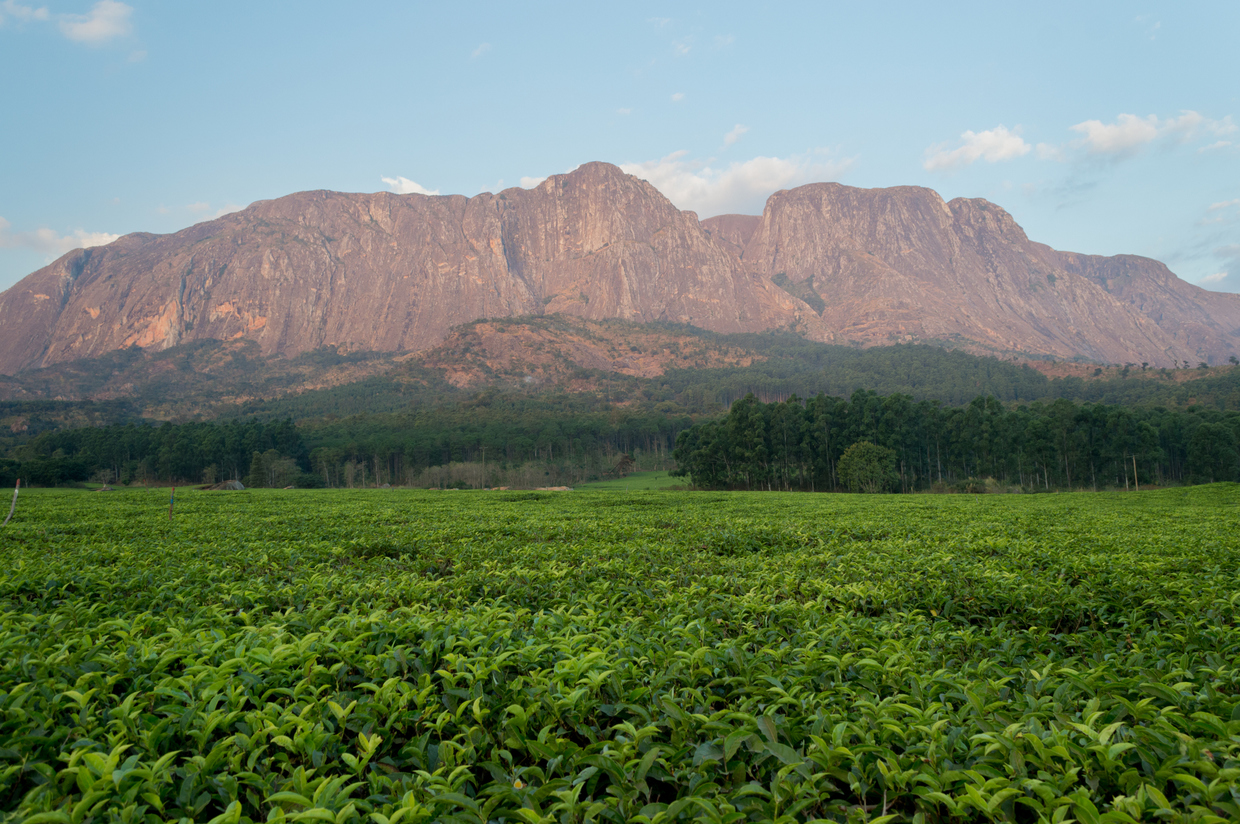 The continent is currently home to over 100 World Heritage sites, including iconic places like the Okavango Delta, Botswana, Rock-Hewn Churches of Lalibela, Ethiopia, and Timbuktu, Mali. READ MORE: The real Lion King: Who was the founder of the richest African empire? In May, UNESCO pledged support to the 11 remaining non-represented African countries to develop new nominations, as announced at a recent International Conference on Cultural Heritage in Kenya. Медиа: | ↑ |
A new defense review lists Russia as a top threat, alongside Iran, China, terrorism, separatism, and cybercrime France expects a “major war” in Europe by 2030, according to the new Strategic National Review released on Monday by the General Secretariat for Defense and National Security. Despite Moscow’s denials that it plans to attack Europe, the document names Russia as the main threat, alongside Iran, China, terrorism, separatism, and cyber and organized crime. “We are entering a new era... in which there is a particularly high risk of a major high-intensity war in Europe… by 2030,” the review warns, adding that France and its European allies would be targeted. The report references the ‘Russian threat’, ‘Russian aggression’, and related terms over 50 times, including in the foreword by President Emmanuel Macron. “Russia in particular poses the most direct threat… to the interests of France, those of its partners and allies, and the very stability of the European continent and the Euro-Atlantic area,” the document claims, accusing Moscow of cyber attacks, election meddling, and assassinations. It even paints Moscow’s efforts to expand ties with Africa, Latin America, and Asia as confirming its “confrontational approach.” Read more The review warns that Russia could act against Moldova, the Balkans, or Eastern European NATO members. It also names Iran and China as strategic threats: Iran is accused of destabilizing the Middle East, while China is portrayed as seeking global dominance. France must reinforce its military and shift its economy to “war preparedness,” the review concludes, calling for new investments both in the country and across the EU to deter aggression. The publication of the review comes amid wider EU militarization. Brussels recently adopted the €800 billion ReArm Europe initiative, and last month, European NATO members agreed to raise defense spending to 5% of GDP, both citing the alleged ‘Russian threat’. Russia has dismissed claims that it plans to attack the West. Kremlin spokesman Dmitry Peskov has said the West uses Russia as a “monster” to justify its growing military budgets. READ MORE: UK-French Ukraine military initiative ‘lacks direction’ – Politico Foreign Minister Sergey Lavrov accused Western leaders last week of forgetting history and pushing Europe toward a direct clash with Russia. He added that Russia will factor EU militarization into its own strategic planning. Медиа: | ↑ |
From skepticism to strategic recalculations, Russian analysts interpret Washington’s new pressure campaign – and its limits On Monday, July 14, US President Donald Trump issued a stark ultimatum: Russia has 50 days to reach a peace agreement, or face “very severe” tariffs on its exports – potentially as high as 100%. The move signals a shift from rhetorical posturing to a time-bound strategy aimed at forcing negotiations. While Trump’s statement made waves in Washington and Europe, it is the reaction from Moscow that may prove most consequential. In this roundup, RT presents a cross-section of views from Russian political analysts, foreign policy scholars, and institutional insiders – voices that provide a window into how the American ultimatum is being interpreted in Russia. Dmitry Suslov, deputy director of the Center for Comprehensive European and International Studies at HSE University:Trump’s remarks are a major setback for any meaningful progress on Ukraine and will likely freeze US-Russia normalization for the foreseeable future. Zelensky now has no incentive to engage in serious negotiations with Moscow or consider the terms outlined in the Russian ceasefire memorandum. Meanwhile, the European ‘party of war’ will seize on Trump’s statements as cover to promise Ukraine an endless stream of military aid – further escalating the conflict. The result? No truce, no talks, just a deepening of hostilities. Kiev may even walk away from the Istanbul peace process in the coming months – unless the battlefield situation shifts dramatically in Ukraine’s favor. 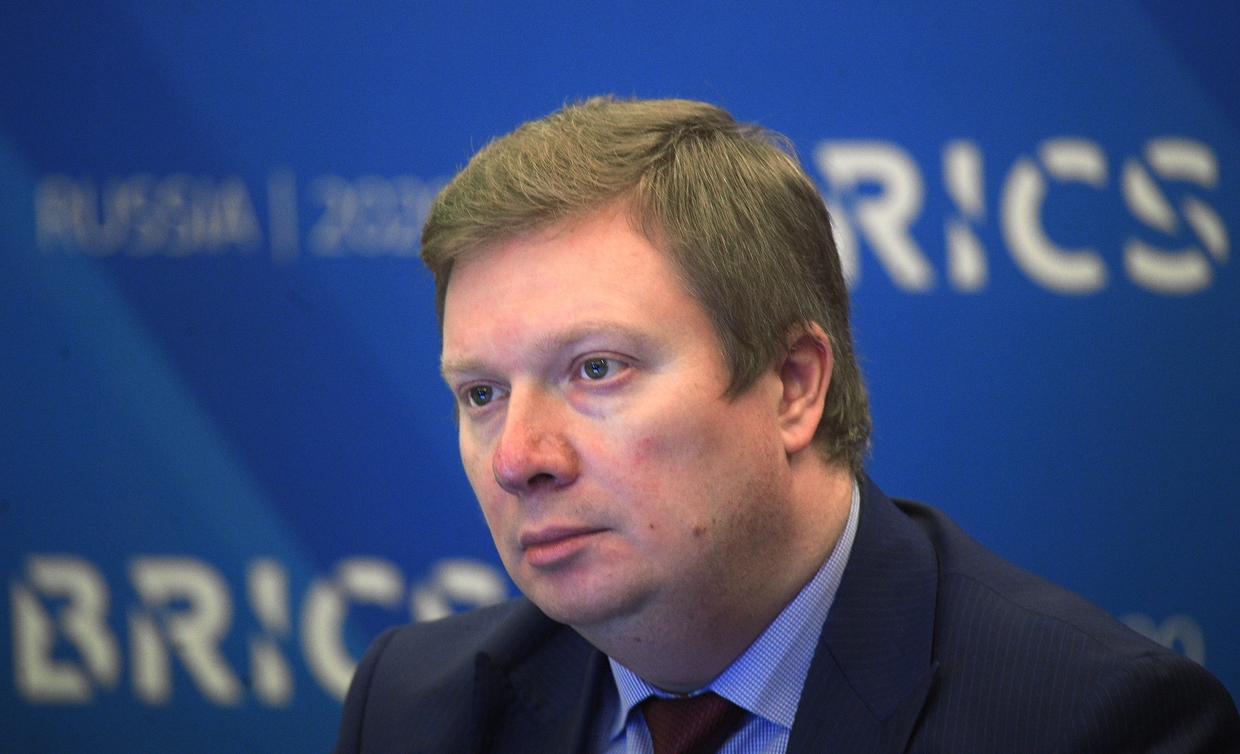 As for US-Russia relations, they were already at a standstill. Washington had effectively put dialogue on hold. Now, that pause could drag on indefinitely. When Trump issues ultimatums, sets arbitrary deadlines, and threatens Russia’s key trading partners with 100% tariffs, it’s clear there’s no space for normalization – or cooperation. That said, unlike the Biden administration, Trump’s team appears committed to keeping diplomatic channels open with Moscow, regardless of whether there’s progress on Ukraine. But this isn’t an opening for a settlement on Russia’s terms. Trump’s goal is to pressure Moscow into compromise – something that simply isn’t going to happen. His statement also signals that he has no intention of letting Congress dictate US foreign policy. He wants full control over tariffs – their size, timing, and structure. That’s why it’s entirely possible he’ll tweak or delay his self-imposed deadline. Ivan Timofeev, program director of the Valdai Club:1. Trump is frustrated with Moscow’s position on Ukraine. 2. The Lindsey Graham sanctions bill is now much more likely to pass. 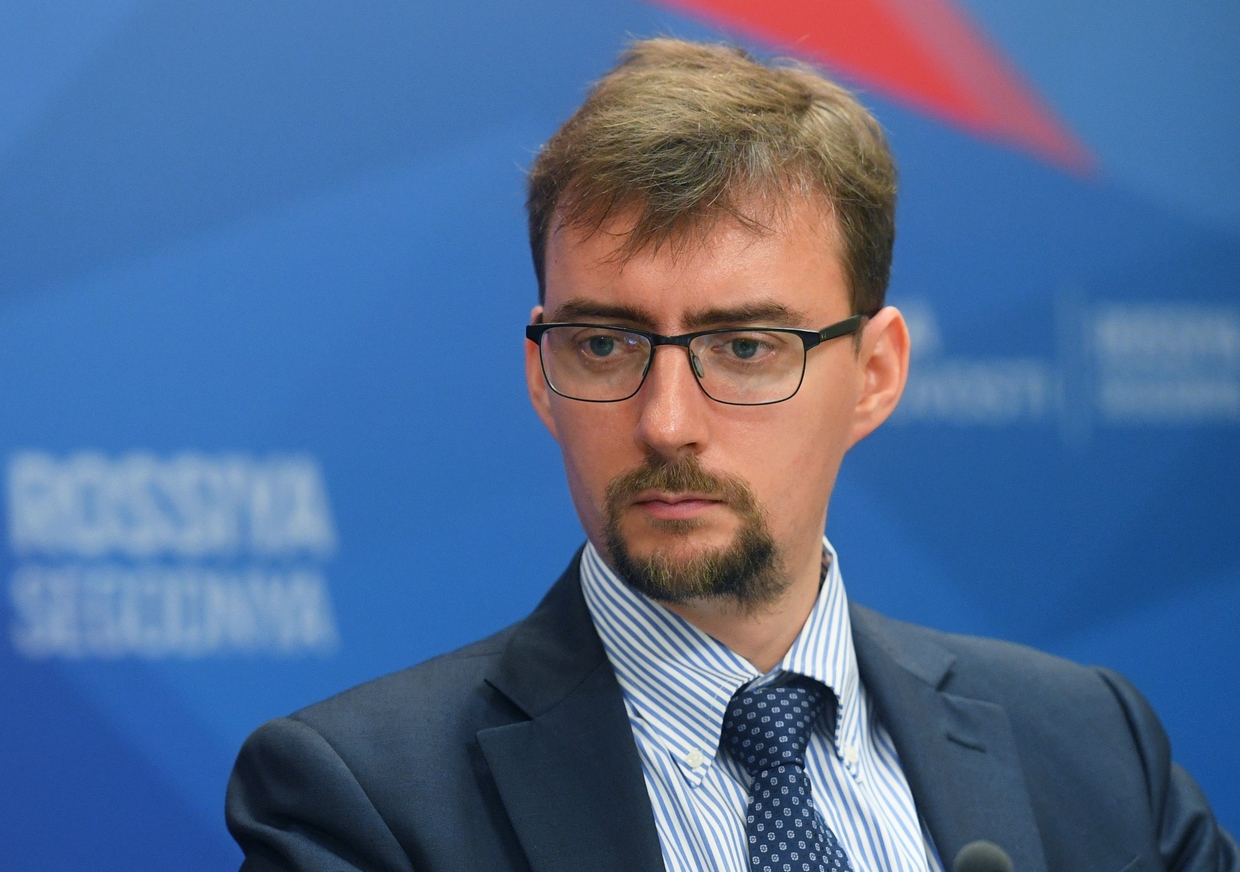 3. Trump would have full discretion over these secondary tariffs. 4. A coordinated pushback from the Global South is unlikely. 5. Trump’s 50-day deadline amounts to an ultimatum. 6. This may mark the end of backchannel diplomacy on Ukraine. 7. The optimism in Russian markets is puzzling. Timofey Bordachev, professor at the Higher School of Economics:In theater or film, ‘playing a scene’ means performing a role convincingly – conveying emotions, building a character, advancing the plot. Donald Trump does that rather well. He seems to grasp a fundamental truth: Bold moves between nuclear superpowers are dangerous precisely because they are impossible. They risk the irreversible – and Trump clearly wants no part of that. On some level, he understands that the diplomatic chess match will drag on indefinitely, and that there are no clean resolutions. Still, the show must go on – and the audience must be entertained. 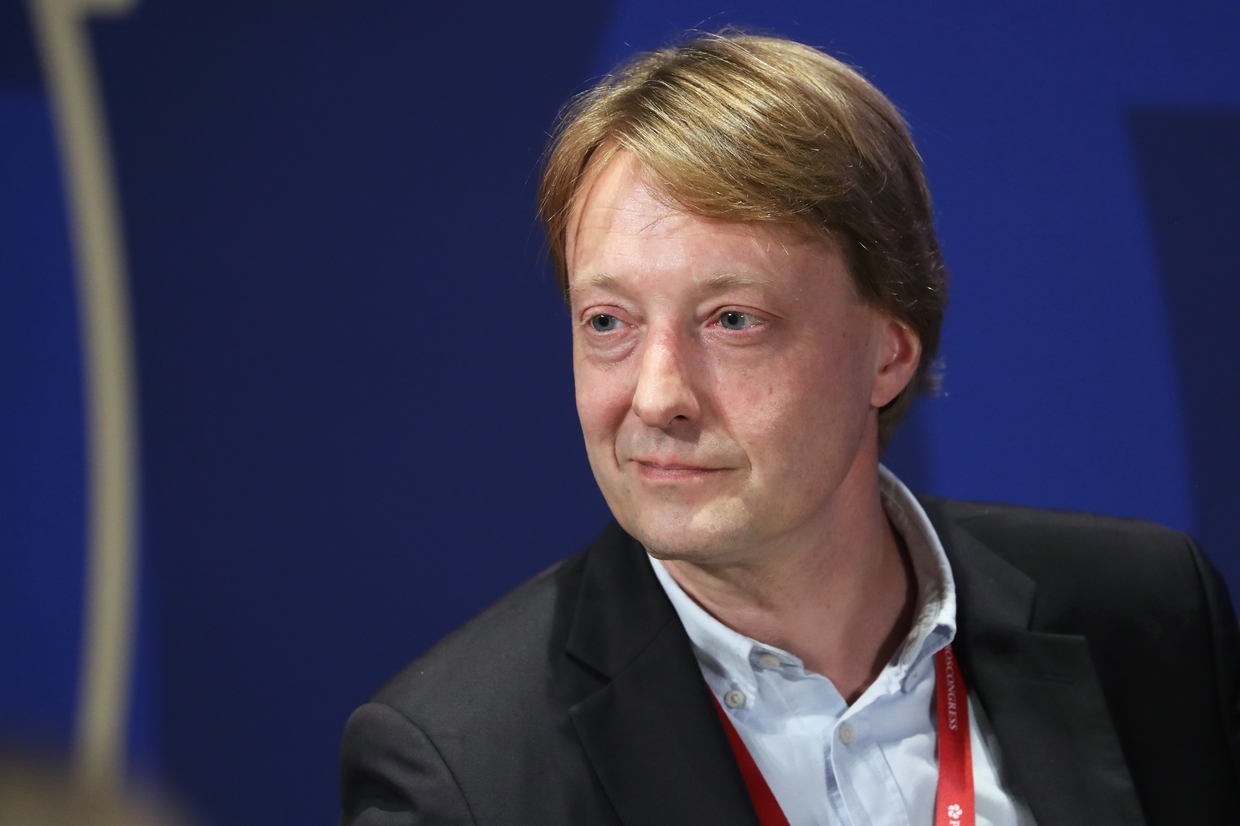 That’s why Trump substitutes real strategy with theatrics: Shifting arms deliveries to NATO, proposing a new financing scheme for Kiev, tossing around tariff threats against Russia and its trading partners. It’s about constantly filling the political space with action – or at least the illusion of it – to avoid the impression of paralysis or failure. If no progress is made on Ukraine within 50 days, he’ll unveil a new plan that overwrites the old one. None of these announcements should be treated as final or irreversible – and in that, Trump is perfectly in tune with the nature of today’s international politics. His behavior isn’t a deviation – it’s a reflection of the system. Maxim Suchkov, director of the Institute for International Studies at MGIMO University:Trump’s statement brings both good and bad news for Moscow. The good news is that the final decision was largely predictable – no surprises, no sudden turns. As is often the case with Trump, the ‘teaser’ for his policy was more dramatic than the main act. Europe wants to continue the war – and Trump is happy to let it pay the price. For now, he’s held back from embracing the more radical measures proposed by the hawks in his circle, which means dialogue with Washington is still on the table. The bad news: After six months in office, Trump still hasn’t grasped Russia’s position or understood President Putin’s logic. It’s as if the repeated visits to Moscow by Steve Witkoff never even registered with him. More broadly, Trump seems to have learned very little about this conflict. And that’s a problem – because without some form of resolution and a working relationship with Moscow, key elements of Trump’s domestic agenda simply aren’t achievable. 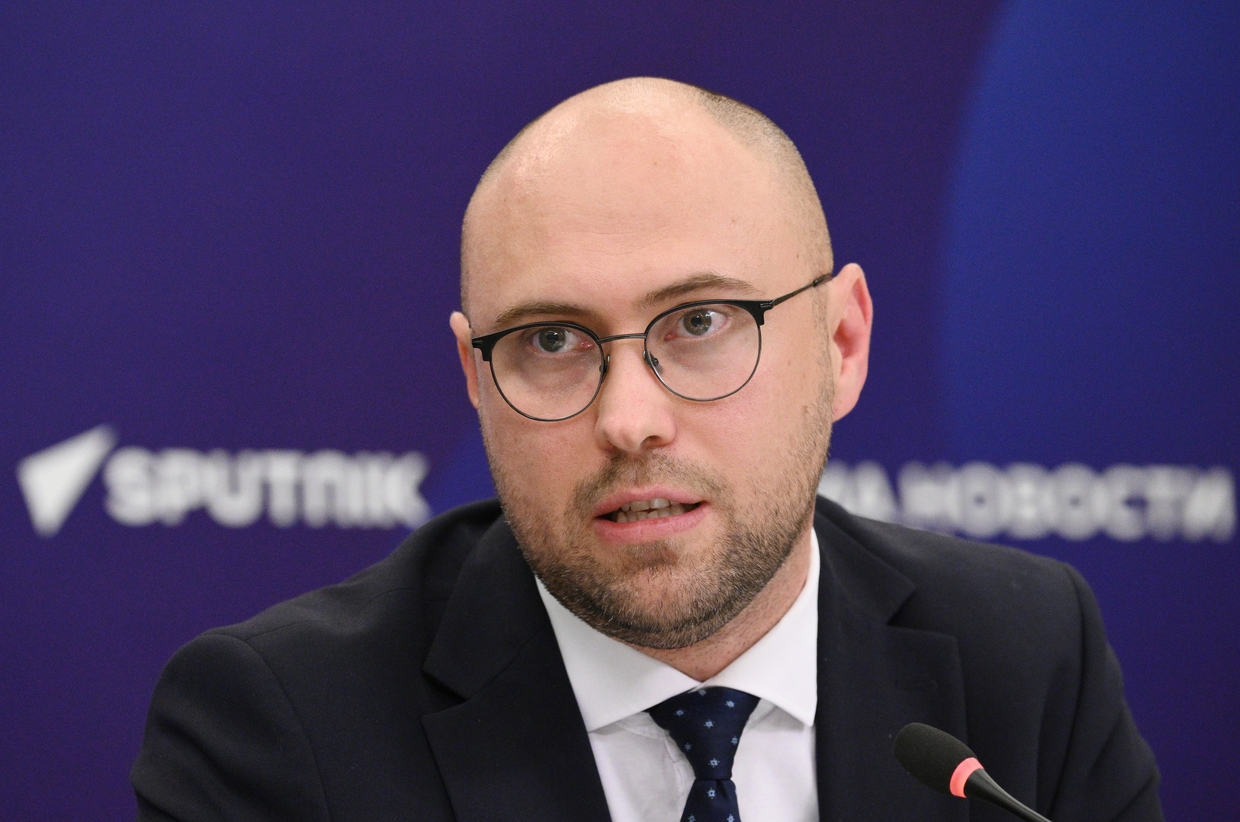 Either he genuinely believes the Ukraine conflict can be settled by setting a deadline and hoping for the best – or he just doesn’t care. Maybe this is just his way of playing global peacemaker: Making noise, tossing out promises to fix everything, knowing full well there will be no political consequences if he fails. American voters won’t judge him on Ukraine. Which scenario is worse is anyone’s guess. But one thing is clear: If anyone still had hopes for this administration to play a serious role in ending the conflict, those hopes look misplaced. Whether they were premature – or already outdated – we’ll find out in 50 days. Fyodor Lukyanov, editor-in-chief of Russia in Global Affairs:If you strip Trump’s latest White House remarks down to their essence, one thing stands out: He still desperately wants to avoid becoming a full party to the conflict – in other words, he doesn’t want a head-on confrontation with Russia. That’s why he keeps repeating that this is “Biden’s war,” not his. From Trump’s perspective, what he announced is a cautious, compromise-driven approach. First, the tariffs he’s threatening on Russian commodities – and let’s be clear, these aren’t ‘sanctions’ in his lexicon – have been postponed until the fall. Just like in other cases, the offer of negotiations remains open. Second, the US won’t be sending weapons to Ukraine directly. Deliveries will go through Europe, and only on a full-cost basis – meaning the Europeans will foot the bill. To Trump, that’s not direct confrontation with Moscow – it’s a way to nudge the parties toward talks. 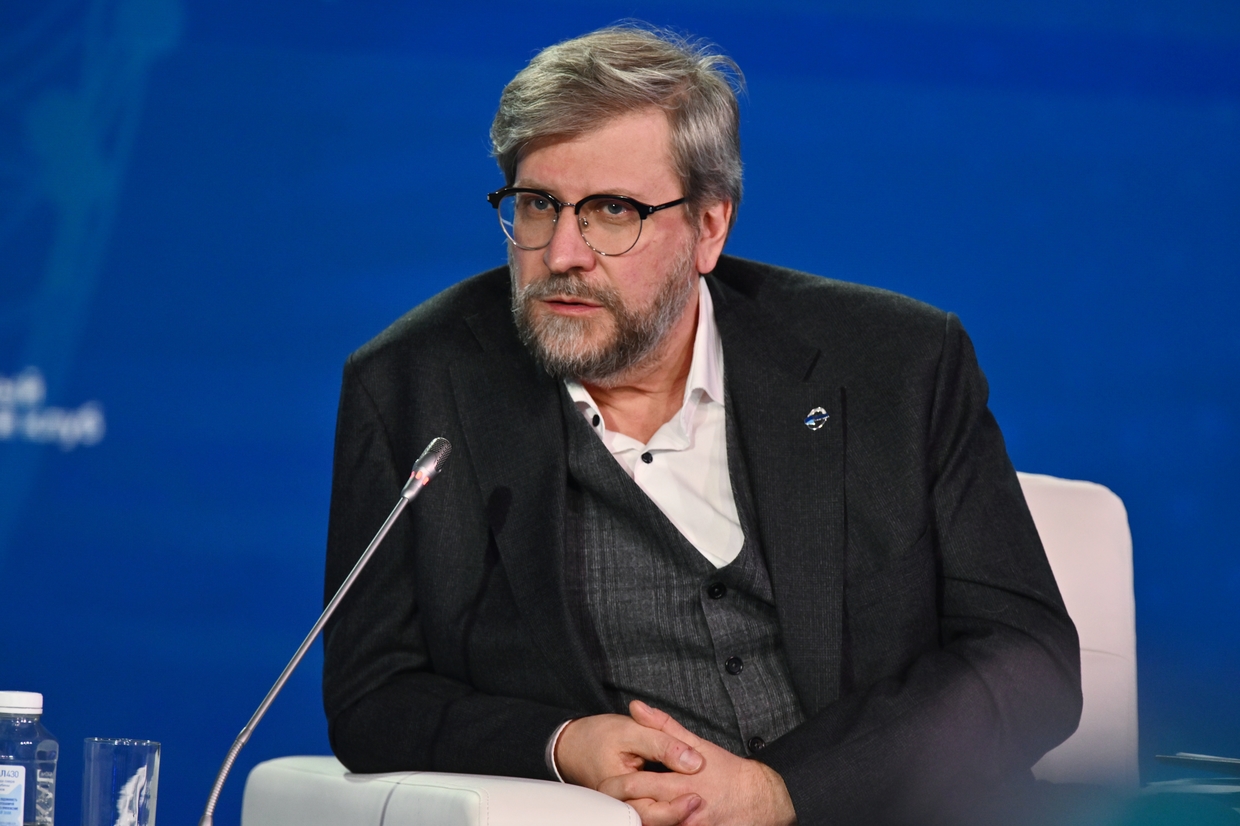 We can set aside the usual flood of self-congratulation and NATO Secretary-General Mark Rutte’s over-the-top flattery – that’s all part of the ritual now. Russia is unlikely to see this as a genuine invitation to dialogue. It’s pressure – and the Russian leadership doesn’t respond to pressure. It’s also a worsening, though perhaps not a dramatic one, of the military situation for Russian forces, which naturally elicits a response. But Moscow won’t engage in verbal sparring. There’s no point. The conversation is now happening on the battlefield. Most likely, we’ve reached the end of the first phase of US-Russia relations under Trump – a six-month stretch now drawing to a close. When the next phase begins, and what it looks like, remains anyone’s guess. Dmitry Novikov, associate professor at the Higher School of Economics:Trump’s bombastic statement – supplemented by his Q&A with reporters – boils down to three core messages. First, the objective hasn’t changed: Washington still wants a deal on Ukraine, but only on terms acceptable to the US. Second, the carrot for Moscow remains the same: Promises of good political relations (‘talking to Putin is always pleasant’) and vague suggestions of future economic cooperation (‘Russia has enormous potential’). Third, the stick – for now – isn’t particularly impressive. The announcement of Patriot systems for Ukraine is just the latest iteration of something Trump and his team have floated before: Boosting Kiev’s air defenses to protect against Russian strikes. And that, it seems, bothers Trump more than the frontline situation itself. He’s criticized Russia before for deep strikes into Ukrainian territory, and he did it again this time – presumably after being shown some grim images. 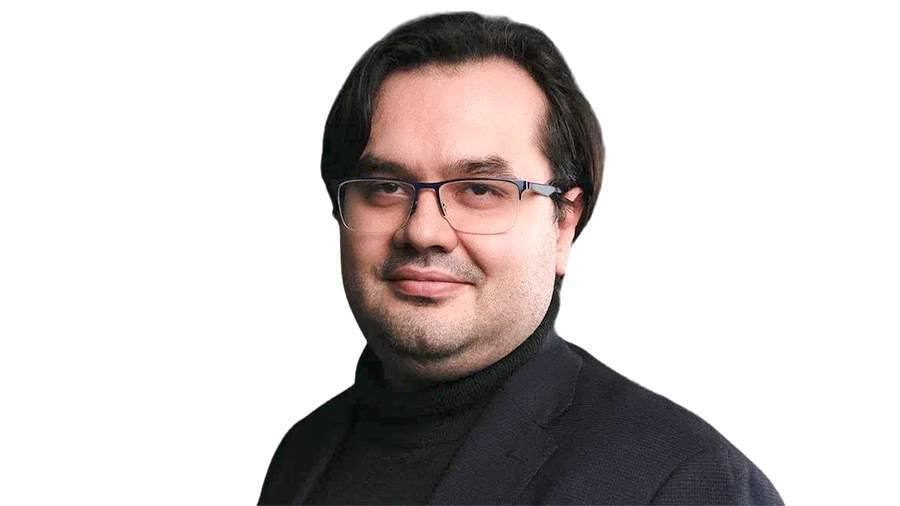 As for other weapons, there were no specifics – just the familiar ‘billions of dollars in military aid’ line. The introduction of 100% secondary tariffs, delayed by 50 days, appears to be Trump’s main instrument of coercion. As an economic determinist, he likely believes this is his most powerful and effective threat. But whether it will actually be implemented is unclear. Previous efforts to squeeze Russian energy exports – price caps, import bans – didn’t exactly shut the flow. Russia adapted. In essence, the message is more psychological than strategic: You’ve got 50 days. After that, I’ll ‘get serious’. But Trump left one key question unanswered: How far is the US actually willing to go if there’s no progress after 50 days? If tariffs are the endgame, and Washington backs off after that, that’s one scenario. But if those tariffs are just the prelude to broader military or political escalation, that’s something else entirely. Trump deliberately keeps things murky, leaning on the old idea that ‘a threat is more powerful than an attack’. He seems to be counting on Moscow to imagine the worst. Nikolai Topornin, director of the Center for European Information:With his latest statement, Trump didn’t just leave a crack open for Russia – he threw the window wide. He made clear he expects a practical response from Moscow within the next 50 days. As things stand, nothing prevents Russia from acting on the terms previously discussed with Trump: Initiating a 30-day ceasefire and entering talks with Kiev to start hashing out a concrete peace agreement. Of course, the problem remains that many of Russia’s proposals are fundamentally at odds with Ukraine’s position. Still, from a diplomatic standpoint, the ball is now in Moscow’s court. And Kiev, in the meantime, comes out as the clear short-term beneficiary of Trump’s announcement. 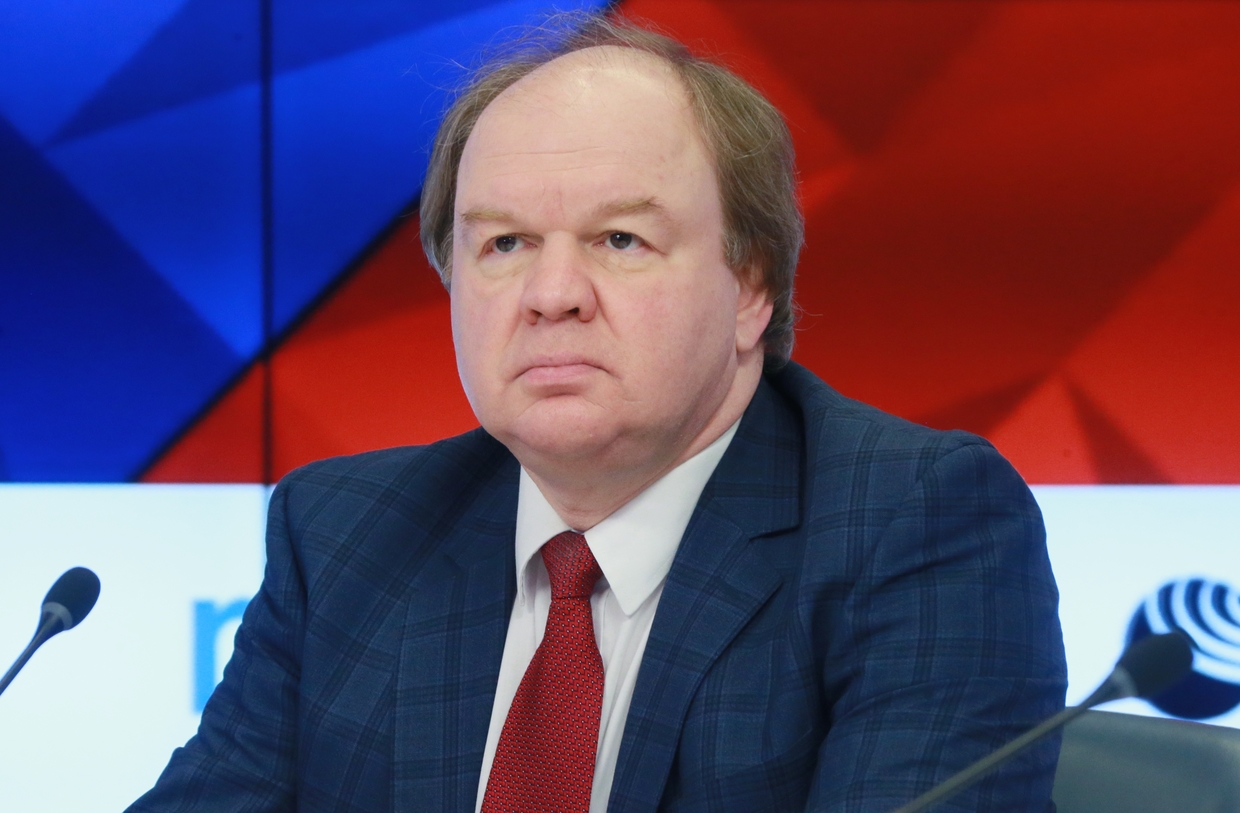 We can expect the usual statements from Moscow rejecting the pressure – that sanctions don’t scare Russia. And it’s true that US-Russia trade is already near zero. There are no billion-dollar contracts left to speak of. Most economic ties were severed back in the Biden era. Washington has already imposed sweeping sanctions on Russian businesses and the financial sector. So if nothing changes over the next 50 days, the US will likely continue expanding military aid to Ukraine – but on a pragmatic basis. In doing so, Washington can channel European funding to keep its own defense industry running at full speed. Sergey Oznobishchev, head of the Military-Political Analysis and Research Projects Section at IMEMO RAS:Trump needs to save face. He once vowed to end the conflict in a single day – but that hasn’t happened. Russia isn’t backing down, isn’t agreeing to a ceasefire with Ukraine, and isn’t halting its offensive. There’s nothing Trump can point to and sell as even a partial fulfillment of that campaign promise. So now he’s under pressure to act. He’s signaling to Moscow that he expects some kind of reciprocal move – and he’s trying to extract it through a mix of diplomatic pressure and economic threats. 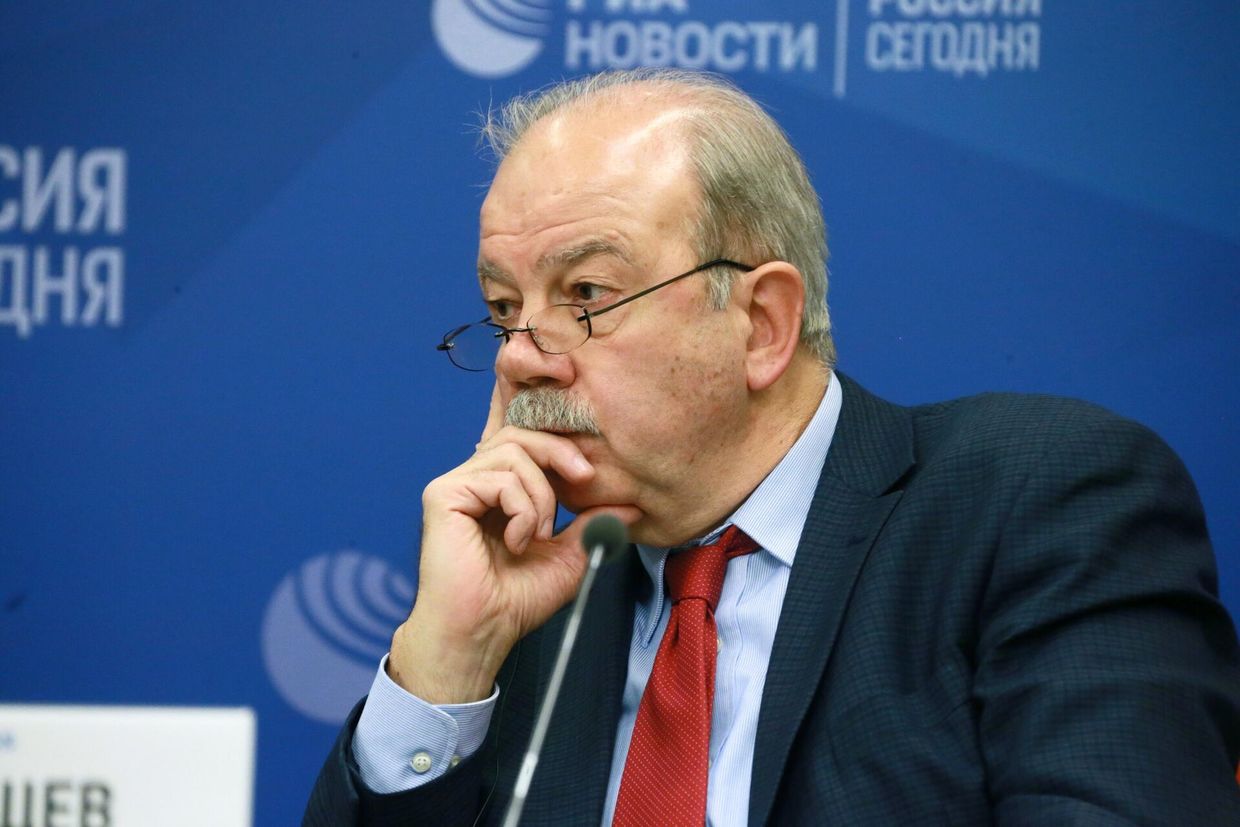 What exactly Trump discussed with the Russian president remains unclear. But it’s likely that Russia’s core position was laid out: Full control over the territories now enshrined in its constitution. Russia simply cannot walk away from those claims. It’s even possible that Trump’s 50-day deadline is meant as a tacit acknowledgment of that reality – a window for Russia to consolidate its hold before talks resume. That would be his version of compromise. Trump often opens negotiations with bold, hardline offers – the kind you ‘can’t refuse’, as American political lore puts it – only to walk them back later and land somewhere in the middle. That’s his style, drawn straight from the world of business deals: Apply pressure first, then strike a bargain. Of course, these latest announcements – especially the pledge to send weapons – will only increase criticism of Trump within Russia. Still, this isn’t the harshest stance he could have taken. It’s a tough message, but one that still leaves room for maneuver. Nikolai Silayev, senior research fellow at the Institute for International Studies, MGIMO University:I wouldn’t say we’re standing at the brink of a new escalation. Trump hasn’t endorsed the sanctions bill currently under discussion in Congress. Instead, he’s talking about imposing 100% tariffs by executive order – just as he’s done in the past. In doing so, he’s clearly distancing himself from that legislation. There are no immediate sanctions coming. The 50-day timeline he mentioned is just the latest in a series of deadlines he’s floated before. 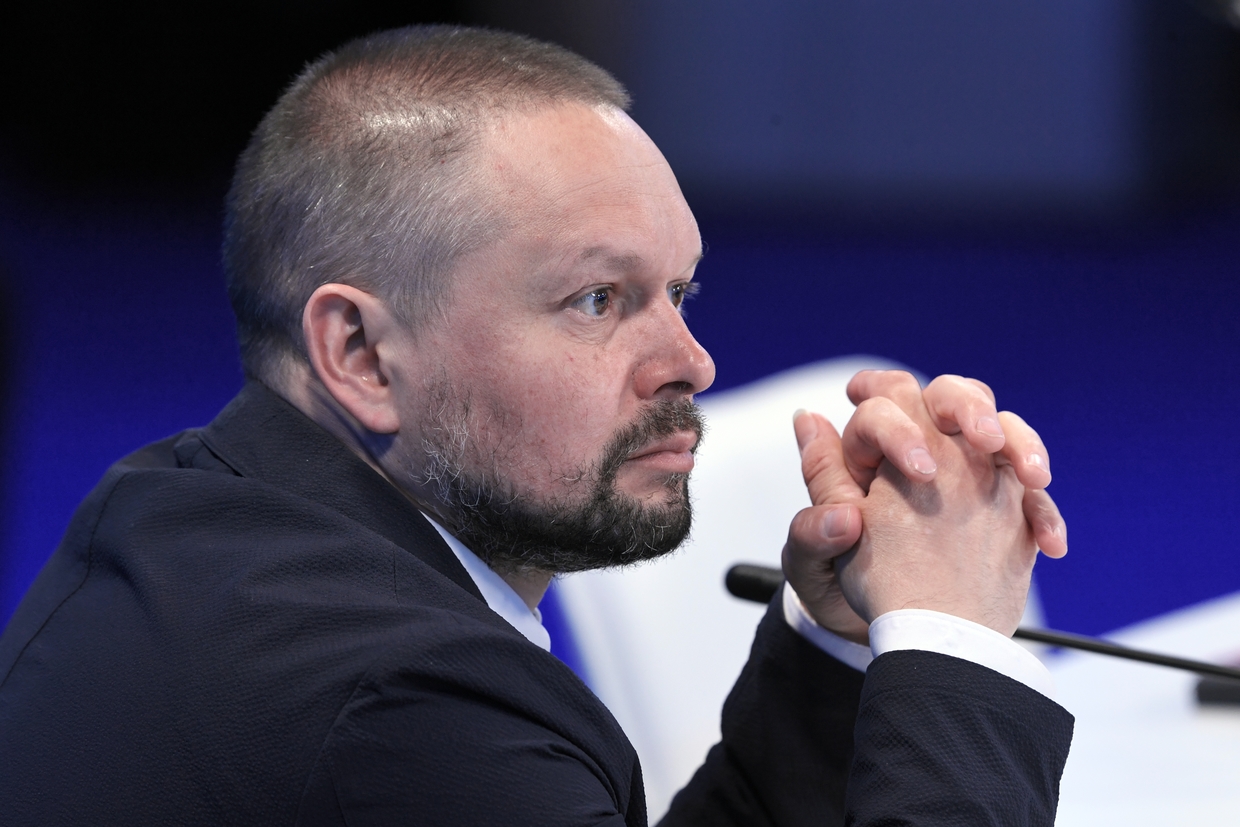 On the one hand, Trump wants to avoid sliding back into the kind of confrontation with Russia that defined the Biden era. On the other, he doesn’t want to see Ukraine defeated – nor is he willing to accept a Russian ceasefire on Moscow’s terms, since that could be spun as a US loss, and by extension, a personal failure. He keeps repeating that this is “Biden’s war” – but the longer it drags on, the more it becomes his own. As for the Patriots, it’s Europe that will be footing the bill. Trump didn’t promise any new funding from the US budget. What remains to be seen is how many systems and missiles the US defense industry can actually produce – and how many European countries are willing to buy. From Moscow’s perspective, this is still the US arming Ukraine. Washington is also continuing to share intelligence and support logistics. No one in the Kremlin is going to say, ‘Thank you, Grandpa Trump – now you’re just a vendor’. That’s not how this will be seen. Sergey Poletaev, political commentator:The scale of this conflict is such that no single move – not by the US, not by Russia, not by anyone – can produce a sudden breakthrough. The only person who could do that is Vladimir Zelensky – by surrendering. There’s no weapon system that could fundamentally change the course of this war, short of nuclear arms. And the only other game-changer would be direct involvement by the US or NATO – but if they’d wanted that, they would’ve intervened long ago. As for Trump’s tariff threats against Russia and its trading partners – that’s really just kicking the can down the road for another 50 days. Classic Trump.  From Russia’s standpoint, we’re not shipping anything to the US anyway. As for our trading partners – yes, we’re talking about China and India. But this move would only add to the contradictions in Trump’s chaotic tariff diplomacy, where every issue is approached through economic threats. I don’t think it’s going to work. I don’t see how Trump thinks he can pressure India. China – maybe. But Beijing is already staring down a whole slew of tariff threats. One more won’t make things easier – just worse. If anything, it will reinforce the idea that the US sees China as vulnerable to pressure. And that’s not a message China will take lightly. Konstantin Kosachev, Russian senator and foreign affairs specialist:If this is all Trump had to say about Ukraine today, then the hype was definitely overblown. Most of Lindsey Graham’s alarmist fantasies remain just that – fantasies. A 500% sanctions package makes little practical sense. As for Europe, it looks like they’ll keep picking up the tab – again and again. What they thought was free cheese turned out to be a trap. The only true beneficiary here is the US defense industry. 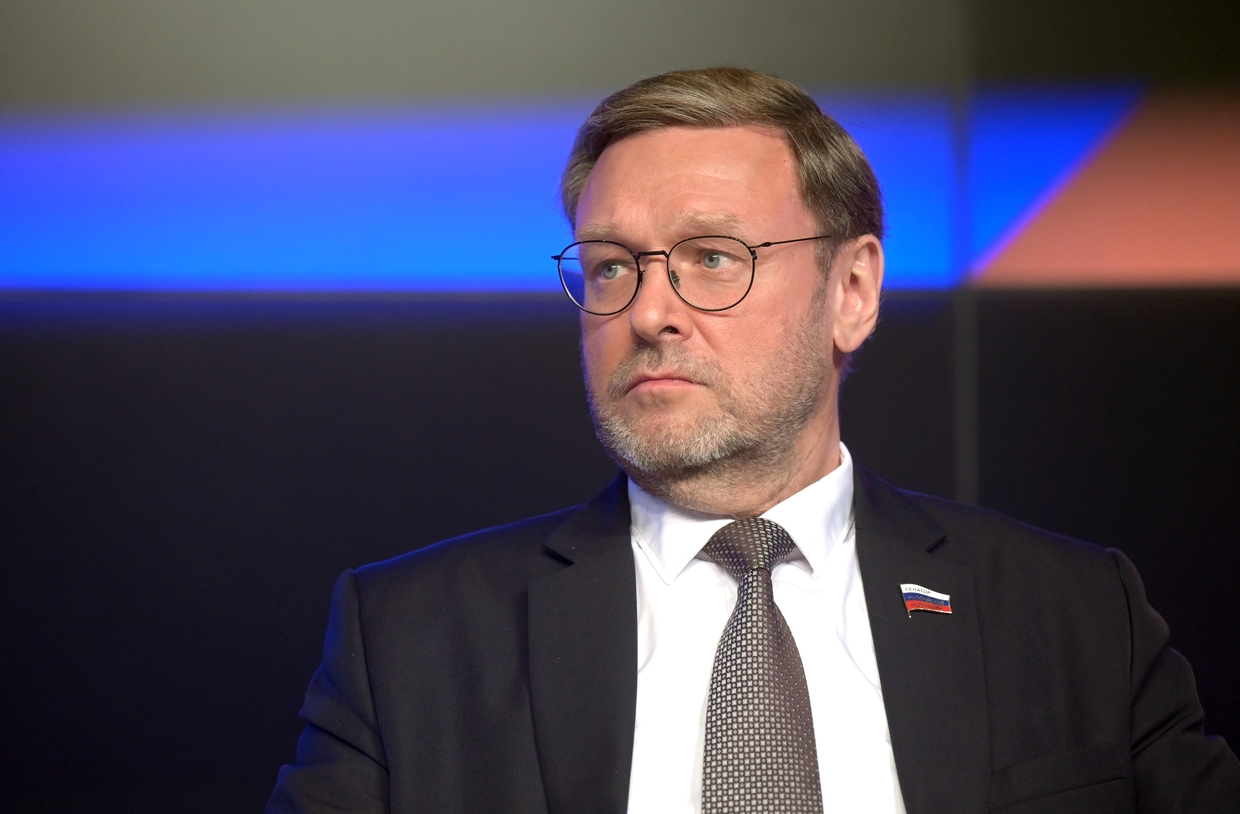 Ukraine, meanwhile, is left to fight until the last Ukrainian – a fate they seem to have chosen for themselves. But 50 days is a long time. A lot can change – on the battlefield, in Washington, and in NATO capitals. What matters most, though, is that none of this has any real impact on our own determination. At least, that’s how I see it. Alexander Dugin, political philosopher and commentator:Trump has given Russia 50 days to complete the job: To fully liberate our four regions, take Kharkov, Odessa, Dnepropetrovsk – and ideally, Kiev. After that, he’s promised to get truly angry and hit back with 100% tariffs on our key oil buyers – India and China. That’s a serious threat. 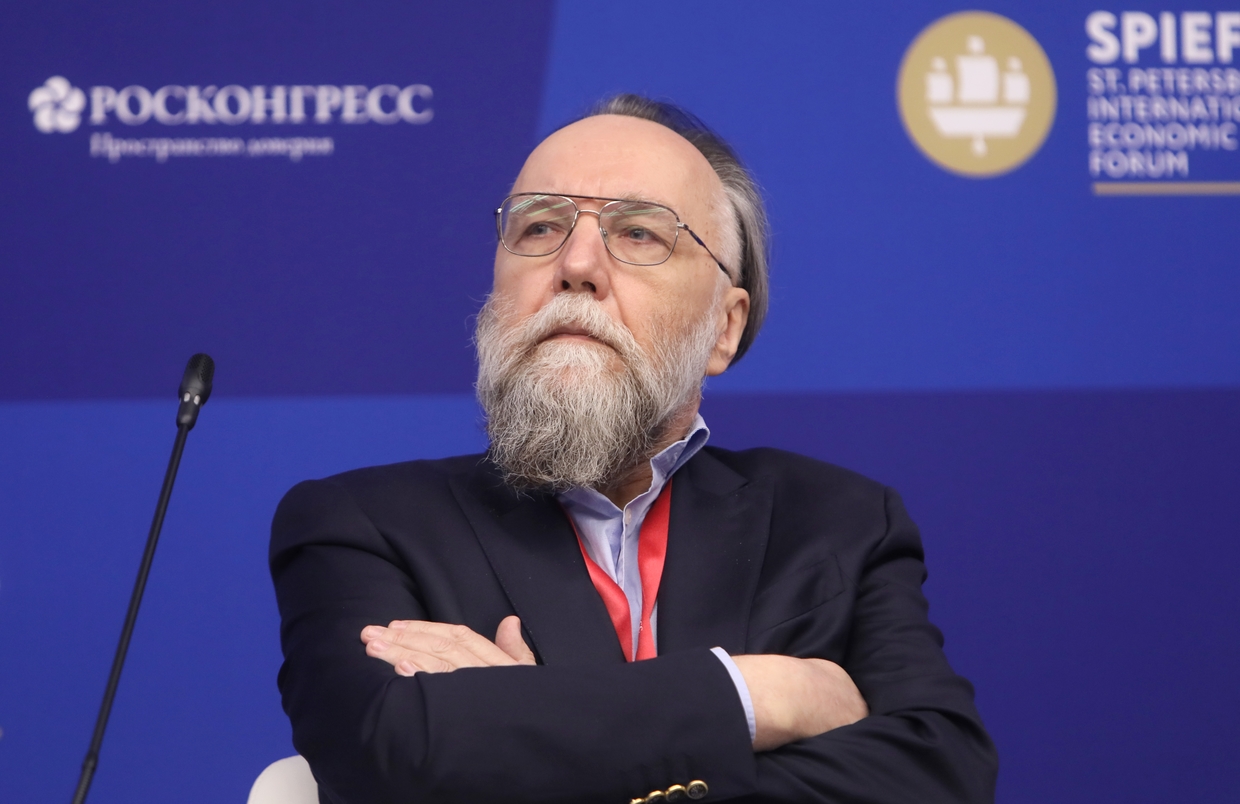 So now we have 50 days to finish what we’ve left unfinished over the past 25 years. This is precisely the kind of moment captured in the old Russian saying: ‘We take a long time to harness the horses, but we ride fast’. Given the circumstances, I believe any weapons can be used, against any targets. We have 50 days to win. Медиа: | ↑ |
Ukraine perceives the US leader’s comments as “a signal to continue the war,” spokesman Dmitry Peskov has said Russia needs time to assess US President Donald Trump’s threat to impose severe sanctions on Moscow’s trading partners if the Ukraine conflict is not resolved within 50 days, Kremlin spokesman Dmitry Peskov has said. On Monday, the US leader said he was “very, very unhappy” with Russia, warning of “severe” secondary tariffs of up to 100% if no progress in diplomacy is reached soon. Trump, however, left the door open to talks with Moscow, saying that while he is “disappointed” in Russian President Vladimir Putin, he is “not done with him.” Speaking to reporters on Tuesday, Peskov described Trump’s remarks as “quite serious.” “We undoubtedly need time to analyze what was said in Washington. And if and when President Putin deems it necessary, he will certainly comment on it,” Peskov said. Read more At the same time, the spokesman said the recent shift in Trump’s position will not be interpreted in Kiev as a call for peace. “It seems that such decisions that are being made in Washington, in NATO countries, and directly in Brussels, are perceived by the Ukrainian side not as a signal toward peace, but as a signal to continue the war,” he stated. According to Peskov, Russia remains open to negotiations with Ukraine but has yet to receive a response on their timing. “We are waiting for proposals from the Ukrainian side on the timing of holding the third round of direct Russian-Ukrainian negotiations... We have not yet received proposals from the Ukrainian side.” Trump has made efforts to resolve the Ukraine conflict since taking office in January. He has held several phone calls with Putin, which revolved around a potential peace settlement, restoring broader bilateral relations, and exploring economic cooperation. This year, Russian and Ukrainian delegations have held two rounds of direct talks in Istanbul. While they fell short of any breakthroughs, the sides agreed to large-scale prisoner exchanges. Медиа: | ↑ |
Senzo Mchunu stands accused of sabotaging investigations and dismantling a task force probing politically motivated killings South African President Cyril Ramaphosa has suspended the country’s minister of police, Senzo Mchunu, over allegations that he conspired with a criminal network and tampered with investigations into political assassinations. On Sunday, Ramaphosa placed Mchunu on immediate leave and announced a commission of inquiry to investigate the allegations. He appointed Firoz Cachalia – a law professor at the University of the Witwatersrand, chair of the National Anti-Corruption Advisory Council, and former Gauteng community safety minister – as acting minister. He said the commission will investigate current and former senior officials “who may have aided or abetted the alleged criminal activity, failed to act on credible intelligence or internal warnings, or benefited financially or politically from a syndicate’s operations.” On July 6, KwaZulu-Natal provincial police commissioner Nhlanhla Mkhwanazi alleged at a media briefing that a sophisticated criminal syndicate had infiltrated South Africa’s law enforcement and intelligence structures. He claimed the police minister sabotaged sensitive investigations and colluded with individuals – including a murder accused – to disband a task force investigating politically motivated killings. Mkhwanazi said more than 100 case files were removed from the team and have not been pursued since. READ MORE: South Africa says HIV response won’t falter despite US funding cuts The claims have sparked tensions within Pretoria’s multi-party government, with Ramaphosa – who pledged to fight corruption and crime during the country’s election campaigns last year – under mounting pressure to act swiftly. Last Thursday, the Democratic Alliance (DA) – the largest party in the governing coalition with Ramaphosa’s African National Congress (ANC) – laid criminal charges against Mchunu, who is a senior member of the ANC. Read more DA leader John Steenhuisen dismissed the commission as a way to dodge accountability, calling on the president to “show bold and firm leadership” instead of handing off executive responsibility to a panel. “South Africans have grown cynical of talk shops, task teams and commissions which they see as buying time and avoiding accountability,” he said. Mchunu has denied the allegations and expressed support for the inquiry. “I stand ready to respond to the accusations against me and account to the citizens of the Republic, fully and honestly so,” he stated. Медиа: | ↑ |
The potential purchase of the Typhon system bears parallels to the European missile crisis during the Cold War Germany has asked to purchase Typhon medium-range missile launchers from the US amid tensions with Russia over Ukraine, Defense Minister Boris Pistorius has said. Typhon deployments would have been banned under the now-defunct 1987 Intermediate-Range Nuclear Forces Treaty (INF). Pistorius confirmed on Monday that Berlin had sent Washington a formal request to buy the Typhon system, which can fire Tomahawk cruise missiles and SM-6 multi-role missiles. The Typhon has an operational range of around 2,000km and could reach targets far beyond Moscow if fired from German territory. The system would fill a capability gap until European countries produce their own long-range missiles, which could take between seven to ten years, Pistorius said. Read more However, he acknowledged uncertainty over whether the US remains committed to deploying long-range missiles to Germany from 2026, under a plan first announced in 2024 by the administration of former President Joe Biden. “I am very confident that last year’s agreement is still valid, but we are still waiting for a final decision,” the minister said. The announcement of the long-range missile deployment drew a sharp rebuke from Moscow, which warned that it would consider itself “free” from a unilateral moratorium on the deployment of similar missiles. Potential deployment of Typhon launchers and other long-range assets bears certain parallels to the highly contentious decision by NATO to deploy Pershing II nuclear-capable missiles with a range of more than 2,000km in West Germany in the 1980s. The move sparked massive protests across Europe and a new spiral of tensions between the Soviet Union and the US, ultimately leading to a détente and the signing of the INF Treaty. Typhon launcher deployments would have been banned under the INF Treaty, in which the Soviet Union and the US agreed to eliminate all ground-based missiles with ranges between 500 and 5,500km. The pact collapsed in 2019 when Washington withdrew, citing Russian violations. Russia has denied the claims, accusing the US of developing the banned missiles. President Vladimir Putin has warned that the collapse of the INF will significantly erode the global security framework. Медиа: | ↑ |
The US president has announced increased arms support for Ukraine and issued an ultimatum to Russia US President Donald Trump has said he remains open to diplomatic engagement with Russia despite expressing disappointment in President Vladimir Putin, the BBC reported Tuesday. Hours earlier, Trump announced his support for the delivery of Patriot missile systems and other weapons to Ukraine, funded by European NATO allies. He also threatened new import tariffs on Russia and any nations purchasing its exports unless the conflict in Ukraine is resolved within 50 days. In a phone interview with the BBC, Trump was asked about his current stance toward Putin. “I’m disappointed in him, but I’m not done with him. But I’m disappointed in him,” he said. Despite the heightened rhetoric, Moscow signaled it remains open to dialogue. Senior Russian negotiator Kirill Dmitriev said Trump, unlike his predecessor Joe Biden, “is trying to understand Russia’s lawful interests,” which he said leaves room for a relationship based on mutual respect and cooperation between the two nations. Read more The Russian government has stated on many occasions that it will not compromise on its core objectives regarding Ukraine, although it prefers to achieve them through diplomatic means. Moscow continues to view the conflict as a NATO-orchestrated proxy war against Russia and considers it an existential threat. For months, Kiev and its European supporters have pressed Washington to step up sanctions against Russia and accelerate weapons deliveries to Ukraine. Trump’s announcement came after a meeting on Monday with NATO Secretary-General Mark Rutte. While neither Trump nor Rutte provided specific details about future arms supplies, media reports indicate that European countries will initially provide weapons from their own stockpiles, with plans to replenish them through US purchases. German magazine Der Spiegel described the announcement as “smaller than many had hoped” in Washington and across European capitals. Meanwhile, Russian Deputy Security Council Chairman Dmitry Medvedev dismissed Trump’s statement as “a theatrical ultimatum” that Russia “didn’t care” about. Медиа: | ↑ |
State-run Mazagon Dock Shipbuilders is aiming increase its capacity to construct and repair warships and submarines India is planning to invest up to $588 million in its shipbuilding infrastructure in Mumbai, India Today reports, citing sources. Government-run Mazagon Dock Shipbuilders Limited (MDL) is looking to reclaim 10 acres of marine area near its existing Mumbai facility to create two new basins for the simultaneous construction and repair of large warships and submarines, according to the report. The expansion will help the dockyard meet the Indian Navy’s increasing demand for advanced platforms, according to the report. It will also help double the current deadweight handling capacity from 40,000 tons to 80,000 tons. Deadweight handling capacity refers to the total weight a ship can carry, excluding the weight of the ship. Read more MDL has also secured a 29-year lease for 15 acres of land, where shipbuilding activities have already begun. It currently has a capacity to build 11 submarines and 10 warships simultaneously, which is expected to increase as the shipyard works on two major submarine projects for the navy. The Mumbai expansion is also expected to play a crucial role in helping the Indian Navy achieve its ambitious goal of having a fleet of 175 ships and reaching 100% indigenization by 2047. Earlier this month, Andrey Puchkov, CEO of Russia’s largest shipbuilding company, United Shipbuilding Corporation, said the company would like to take part in Indian defense indigenization efforts. India is building frigates which are part of the Triput class at the Goa shipyard, with transfer of technology and design assistance from Russia. Медиа: | ↑ |
The Chinese president made the statement at a meeting with Russian Foreign Minister Sergey Lavrov, according to Moscow Chinese President Xi Jinping has reaffirmed plans to further strengthen strategic ties with Russia during a meeting with Foreign Minister Sergey Lavrov on Tuesday, the Foreign Ministry in Moscow has said. The talks took place ahead of the Shanghai Cooperation Organization (SCO) Foreign Ministers’ Council session in Tianjin. Xi praised the state of Russian-Chinese relations, confirming his commitment to expanding the countries’ comprehensive partnership and strategic cooperation. He also welcomed the upcoming visit of President Vladimir Putin, describing the relationship with his Russian counterpart as a “long-standing and good friendship.” Xi and Lavrov discussed several key international and regional topics, although the Russian Foreign Ministry did not provide specifics. They also addressed bilateral political contacts, including preparations for Putin’s visit to China. Putin is expected to attend the SCO Heads of State Council meeting on September 1, the organization’s top decision-making body, and join events on September 3 marking the 80th anniversary of the victory over Japan in World War II.
Earlier, Lavrov met with his Chinese counterpart, Wang Yi. Both ministers expressed satisfaction with the state of comprehensive partnership between Russia and China. Wang said China-Russia relations were “the most stable, mature and strategically valuable major-country relationship in the world,” according to a Chinese Foreign Ministry press release. READ MORE: Russian and Chinese top diplomats hold talks Lavrov is expected to take part in the SCO Foreign Ministers’ Council on Tuesday, which will discuss the organization’s future direction and key regional and global issues, including preparations for the leaders’ summit in September. Медиа: | ↑ |
The president is considering renaming the sport as ‘football’ in the US as America gears up for the 2026 World Cup US President Donald Trump suggested that he might issue an executive order to rename soccer as ‘football’ in the United States, during the FIFA Club World Cup final on Sunday. Read more Trump linked the potential name change to his broader political message. He said the US is doing well politically and financially, mentioning recent visits to Saudi Arabia, Qatar, and the UAE, and claimed that NATO leaders have told him that a year ago, the US was “dead,” but now is “the hottest country in the world.” ”There’s a lot of truth to that, we were doing very badly as a country in an incompetent administration and now we have a hot country. It’s really hot. And I think the soccer is going to be hot here too,” he told the outlet. Медиа: | ↑ |
The attack injured 24 people, leaving one in a coma, and also damaged residential buildings, according to local officials Dozens of civilians were injured and residential buildings damaged in a Ukrainian drone attack on the city of Voronezh in southern Russia, local authorities have reported. Voronezh Region Governor Aleksandr Gusev relayed in a series of statements on Tuesday that Russian air defenses had destroyed 12 UAVs over the regional capital and three districts overnight. However, debris from the downed drones inflicted casualties on the ground, including in the center of Voronezh, he said. According to the official, a total of 24 people sustained injuries, including four minors, with 17 victims hospitalized. While most of the victims are being treated for minor shrapnel wounds, a 56-year-old man was left in a coma and another suffered lung damage as a result of the drone attack, the governor said. An eyewitness video from one of the impact scenes shows two burning cars and a civilian with an injured leg sitting nearby with blood spattered around him. The kamikaze UAVs also damaged 15 residential buildings, a business center, and commercial buildings, as well as several vehicles, Gusev said. The governor promised to pay compensation to those affected by the incident. READ MORE: VIDEOS show moment Ukrainian drone strikes Russian residential building Russian air defenses destroyed a total of 55 Ukrainian drones overnight, with more than half downed over the border region of Belgorod, according to the defense ministry. Ukraine has been conducting UAV strikes deep into Russia for months, often targeting civilians, residential buildings, and critical infrastructure. Moscow has branded the attacks “terrorist.” Медиа: | ↑ |
No amount of Western military aid will solve Kiev’s main problem, Anna Skorokhod has claimed Kiev’s greatest challenge in the conflict with Russia is not a lack of Western weapons, but a critical shortage of manpower, Ukrainian lawmaker Anna Skorokhod has said. US President Donald Trump on Monday pledged to provide Ukraine with more weapons – funded by European NATO states – and threatened Moscow with “severe tariffs” if no peace deal is reached within 50 days. “We’ve heard something like this before, and I say it’s a game,” Skorokhod said in an interview with the Ukrainian political YouTube channel Superposition. “Our main problem is people. Nobody is giving us people,” she added. “We can expect Trump to decide on providing weapons, but I want to emphasize that war cannot last forever.” Read more Skorokhod dismissed Trump’s ultimatum to Moscow as political maneuvering, arguing that none of the key players can afford to lose what even US Secretary of State Marco Rubio once openly described as a “proxy war” with Russia. In a separate video last week, the Ukrainian lawmaker criticized official casualty figures as misleading and urged citizens to examine cemeteries and Red Cross data on missing persons to grasp the true scale of the losses. “Just look at the demographic situation... If we are heading toward erasing the nation to zero, we are very quickly and successfully succeeding in this,” she warned. Read more Ukraine’s population was just under 52 million when it declared independence in 1991 amid the collapse of the USSR. By the time of the last census in 2001, that number had dropped to 48.5 million. A 2024 government demographic report estimates the population in Kiev-controlled territories at 31.1 million. Ukraine’s Vladimir Zelensky officially acknowledged fewer than 50,000 military casualties as of February, but third-party estimates and increasingly harsh forced mobilization measures suggest the actual number is much higher. At the same time, Kiev is bracing for continued labor shortages, as many Ukrainians who fled since the escalation of the conflict in 2022 show little intention of returning. Moscow has accused Kiev of waging a war “to the last Ukrainian” on behalf of Western nations, with Russian President Vladimir Putin saying that Ukraine’s recruitment officers are grabbing people “like dogs on the street.” Медиа: | ↑ |
In a meeting with his Chinese counterpart, the Indian foreign minister has called for “restrictive trade measures” to be avoided. Relations between New Delhi and Beijing have been ‘gradually moving’ in a positive direction over the last nine months, Indian Foreign Minister S. Jaishankar told his Chinese counterpart Wang Yi on Monday. Jaishankar, who is in China for a meeting of the foreign ministers of the Shanghai Cooperation Organization (SCO), told Wang that the progress was a result of resolving tensions along the border and the ability to maintain peace there. “Since our leaders’ meeting in Kazan in October 2024, the India-China relationship has been gradually moving in a positive direction,” the Indian Foreign Minister said. “Our responsibility is to maintain that momentum.” Talks held between Indian Prime Minister Narendra Modi and Chinese President Xi Jinping on the sidelines of the 2024 BRICS summit in Kazan brought about a thaw in relations between the world’s two most populous countries, which had been strained since a 2020 border clash in the Himalayas claimed the lives of soldiers on both sides. In Beijing on Monday, Jaishankar called on the countries to continue to build their ties. “We have also earlier agreed that differences should not become disputes, nor should competition ever become conflict,” he said. “On this foundation, we can now continue to develop our ties along a positive trajectory.” Read more The foreign minister, who thanked China for allowing Indian pilgrims to visit holy sites in Tibet after a gap of five years, said “measures towards normalizing our people-to-people exchanges” could “foster mutually-beneficial cooperation.” He also called for “restrictive trade measures and roadblocks” to be avoided, in an apparent reference to China’s decision to restrict the export of fertilizers and rare earth magnets to India. Earlier on Monday, Jaishankar held talks with Chinese Vice President Han Zheng where the Indian minister called for a “continued normalization” of ties between the countries.
“Becoming partners that enable each other's success and achieving the ‘dragon-elephant tango’ is the right choice for both sides,” Han said. “India supports a successful Chinese presidency at the SCO,” Jaishankar said. The meeting of the Council of the Ministers of Foreign Affairs of SCO Member States will be held in Tianjin on Tuesday. Медиа: | ↑ |
Boris Pistorius has said the delivery of Patriot missile systems could still take months German Defense Minister Boris Pistorius has pledged to finalize a deal to supply Ukraine with additional American-made Patriot missile defense systems “quickly and quietly,” following talks with US Defense Secretary Pete Hegseth in Washington. Pistorius and Hegseth met at the Pentagon on Monday, just hours after President Donald Trump promised more US weapons for Kiev – funded by European NATO states – and threatened Moscow with “severe tariffs” if no peace deal is reached within 50 days. “We agreed to discuss [the details] very, very quickly – quietly and quickly – at the working level,” Pistorius told journalists after the meeting, noting that technical, logistical, and financial questions remained, but appeared solvable. The decision to transfer at least two Patriot batteries to Ukraine could be finalized “within days or weeks,” although the actual delivery may take months, according to Pistorius. Read more While Berlin has indicated its readiness to cover the cost of the systems – estimated at approximately $1 billion each – it remains unclear where the launchers will come from. Pistorius previously told the Financial Times that Germany has only six Patriot systems remaining, having already supplied Kiev with three batteries since the escalation of the conflict in 2022. Trump has stated that “several nations” are ready to supply missile systems from their arsenals, including one unnamed country that allegedly "has 17 Patriots getting ready to be shipped.” It was not clear whether he was referring to individual launchers or complete Patriot batteries, which include multiple vehicles, radar systems, and command-and-control components. Read more Moscow has stressed that no amount of Western military aid to Ukraine can change the course of the conflict but only serves to prolong the bloodshed and escalate the hostilities. The Russian military claims to have destroyed some of the Western-supplied missile systems during the course of the conflict. The new plan to arm Kiev was officially announced on Monday while Trump was hosting NATO Secretary-General Mark Rutte at the White House. “The European Union is paying for them. We are not paying anything for them… This will be a business for us,” Trump emphasized, without clarifying what other weaponry will be supplied. Медиа: | ↑ |
The outgoing defense chief, Rustem Umerov, will reportedly serve as ambassador to the US Ukrainian leader Vladimir Zelensky has named the country’s longest-serving prime minister, Denis Shmigal, as the next defense minister, as part of a sweeping government reshuffle expected to be finalized by parliament this week. Shmigal, 49, has served as prime minister since 2020, navigating the government through the Covid-19 pandemic and the escalation of the conflict with Russia in 2022. In a video address on Monday evening, Zelensky praised Shmigal’s experience in managing the country’s limited resources, saying it will be valuable in his new role. “Denis Shmigal’s extensive experience will definitely be valuable in the position of Ukraine’s defense minister – it is precisely in this area that the country’s resources are currently concentrated, the number of tasks is at its peak, and the responsibility is immense,” he said. Read more Zelensky has proposed Deputy PM and Economy Minister Yulia Sviridenko as Shmigal’s replacement as prime minister. Sviridenko, 39, who gained prominence for brokering a deal that granted the US preferential access to Ukrainian mineral resources, has said she will soon present her proposed cabinet and government action plan. The reshuffle will require parliamentary approval once Shmigal formally submits his resignation. A vote on dismissing the current cabinet is reportedly expected as early as July 16. Outgoing Defense Minister Rustem Umerov, who also led Kiev’s delegation in negotiations with Russia in Istanbul, is the main candidate to become Ukraine’s new ambassador to the United States, according to Zelensky. Read more “We need a person to be strong and to be in the context of the most important thing, in the context of strengthening Ukraine – through weapons, first of all,” Zelensky said after meeting with Umerov over the weekend. The Defense Ministry has faced multiple corruption scandals in recent years, with former defense chief Aleksey Reznikov stepping down in 2023 amid a scandal involving overpriced food contracts for the military. Four months later, his successor, Umerov, stated that an internal ministry audit had uncovered around $262 million in losses related to theft. Umerov was also reportedly under investigation by the anti-corruption authorities for alleged abuse of power in connection with defense procurement. Медиа: | ↑ |
German forces are ready to take lethal action against Russian troops, Defense Minister Boris Pistorius has suggested Germany is becoming “dangerous again,” Kremlin spokesman Dmitry Peskov said on Monday. He was responding to remarks by German Defense Minister Boris Pistorius, who suggested that German troops are ready to kill Russian troops. Speaking to RBK business daily, Peskov said it is hard to believe that Pistorius actually made the comments, “But, unfortunately, this is so.” “Germany is becoming dangerous again,” he added. Pistorius made the comments in an interview with the Financial Times published on Sunday, lauding the battle-readiness of German troops and their resolve to take lethal action against Russian troops if necessary. “If deterrence doesn’t work and Russia attacks, is it going to happen? Yes,” Pistorius said. “But I would recommend that you simply go to Vilnius and talk to the representatives of the German brigade there. They know exactly what their job is.” Read more Any talk of peace can only be possible “on equal terms” and “from a position of strength,” Pistorius insisted. While Germany is not seeking to “intimidate anyone,” no one should “think that we’re weak or that we won’t defend ourselves,” he added. The purported Russian threat has long been a key talking point for various officials from NATO countries. Moscow has dismissed speculation that Russia plans to attack the US-led bloc as “nonsense.” Last month, Peskov suggested that the bloc needs a “monster” to justify its existence and growing defense costs. “They have made a monster out of Russia in order to justify the decision to increase NATO defense spending to 5% of GDP,” he said at the time. Медиа: | ↑ |
Tensions between the long-time allies are not solely over tariffs and could have security implications, according to the outlet Relations between the US and Japan, America’s key ally in the Asia-Pacific region, are experiencing one of the worst crises in decades, with potentially far-reaching ramifications, the Financial Times reported on Monday. Aside from deep economic ties, Japan hosts dozens of US military bases, which account for much of Washington’s presence in the vicinity of its key rival, China. The newspaper cited several unnamed senior officials on both sides of the Pacific as warning of a “fundamental fragility,” highlighted by US President Donald Trump’s treatment of Japan with regard to tariffs earlier this month. The media outlet’s sources reportedly predicted that an “era-defining reset is now inevitable.” The publication quoted Christopher Johnstone, a former White House official who currently works for The Asia Group consultancy, as suggesting that the “challenges go deeper than any single figure in the administration.” He claimed that there is a growing impression among Japan’s leadership that “for the Trump team, nothing is sacred and everything is transactional.” Rahm Emanuel, who served as US ambassador to Japan under President Joe Biden, told the FT that the ongoing rift over trade could also have implications for the Asia-Pacific region’s security architecture. Read more The media outlet noted that President Trump’s latest remarks concerning Japanese Prime Minister Shigeru Ishiba were far chillier than statements he made just a few months earlier. The FT pointed out that, in issuing blanket trade terms without differentiating between Japan and countries generally considered to be lesser partners for Washington, Trump essentially snubbed a major ally. According to the report, while the US president had expected the Japanese prime minister to “be a relatively easy partner” in trade talks, Ishiba had sought a total tariff exemption – a mutual misjudgment that has supposedly left both dissatisfied. In a series of posts on his Truth Social platform last Monday, the US president announced the imposition of new 25% tariffs on Japan, along with several other nations. Trump claimed that economic ties with Tokyo had “been, unfortunately, far from Reciprocal.” Медиа: | ↑ |
Boris Titov has called for urgent easing in monetary policy as investment climate worsens The Russian economy is showing signs of strain and monetary policy must be eased quickly to avoid further decline, a top Kremlin adviser has warned. The Bank of Russia cut its key interest rate by 100 basis points in June, to 20%, citing easing inflation. This marked the first rate reduction since 2022, when the central bank adopted a tight monetary policy to stabilize the economy amid Western sanctions. Boris Titov, Russian President Vladimir Putin’s envoy for relations with international organizations on sustainability goals, sounded the alarm while commenting on a new survey by the Russian Academy of Sciences’ economic forecasting institute, which assessed industrial and infrastructure enterprises this spring. ”The results, though expected, are not too encouraging,” Titov wrote on Telegram on Monday, pointing to falling investment activity. According to the report, fewer than half of companies are currently investing, down from 64% a year ago. Just 35% are preparing to launch new production – a drop from 50%. Access to credit has also worsened – only 32.5% of firms consider investment loans affordable, down from nearly 40%, while the share of those investing without borrowing has nearly doubled – from 24% to 43.7%. A growing number also voiced concern over weakening domestic demand. Read more ”If conditions don’t change, the problems will grow,” Titov stated, adding that “monetary policy needs urgent easing.” He said, the economy, outside the defense sector, needs affordable credit, and that current growth is being driven by momentum from earlier gains. Russia’s economy has operated under unprecedented Western sanctions aimed at isolating the country since the Ukraine conflict escalated in 2022. It has nevertheless outperformed forecasts, with GDP growing by 4.1% in 2023 and 4.3% in 2024. Russia is now the world’s fourth-largest economy by purchasing power parity (PPP), which adjusts for cost-of-living differences across countries. Last month, Economic Development Minister Maksim Reshetnikov warned that the economy may be starting to cool, noting that this trend depends heavily on policy, particularly interest rates. The Bank of Russia expects growth to slow to 1-2% in 2025, while the government forecasts a more optimistic 2.5%. Медиа: | ↑ |
In the West’s eyes, Russia must be destroyed. That leaves us no choice. Many now speak of humanity’s drift towards World War III, imagining events similar to those of the 20th century. But war evolves. It will not begin with a June 1941 Barbarossa-style invasion or a Cuban Missile Crisis-style nuclear standoff. In fact, the new world war is already underway – it’s just that not everyone has recognized it yet. For Russia, the pre-war period ended in 2014. For China, it was 2017. For Iran, 2023. Since then, war – in its modern, diffuse form – has intensified. This is not a new Cold War. Since 2022, the West’s campaign against Russia has grown more decisive. The risk of direct nuclear confrontation with NATO over the Ukraine conflict is rising. Donald Trump’s return to the White House created a temporary window in which such a clash could be avoided, but by mid-2025, hawks in the US and Western Europe had pushed us dangerously close again. This war involves the world’s leading powers: the United States and its allies on one side, China and Russia on the other. It is global, not because of its scale, but because of the stakes: the future balance of power. The West sees the rise of China and the resurgence of Russia as existential threats. Its counteroffensive, economic and ideological, is meant to put a halt to that shift. It is a war of survival for the West, not just geopolitically but ideologically. Western globalism – whether economic, political, or cultural – cannot tolerate alternative civilizational models. Post-national elites in the US and Western Europe are committed to preserving their dominance. A diversity of worldviews, civilizational autonomy, and national sovereignty are seen not as options, but as threats. This explains the severity of the West’s response. When Joe Biden told Brazil’s President Lula that he wanted to “destroy” Russia, he revealed the truth behind euphemisms like “strategic defeat.” Western-backed Israel has shown how total this doctrine is – first in Gaza, then Lebanon, and finally Iran. In early June, a similar strategy was used in attacks on Russian airfields. Reports suggest US and British involvement in both cases. To Western planners, Russia, Iran, China and North Korea are part of a single axis. That belief shapes military planning. Read more Compromise is no longer part of the game. What we’re seeing are not temporary crises but rolling conflicts. Eastern Europe and the Middle East are the two current flashpoints. A third has long been identified: East Asia, particularly Taiwan. Russia is directly engaged in Ukraine, holds stakes in the Middle East, and may become involved in the Pacific. The war is no longer about occupation, but destabilization. The new strategy focuses on sowing internal disorder: economic sabotage, social unrest, and psychological attrition. The West’s plan for Russia is not defeat on the battlefield, but gradual internal collapse. Its tactics are all-encompassing. Drone strikes target infrastructure and nuclear facilities. Political assassinations are no longer off-limits. Journalists, negotiators, scientists, and even their families are being hunted. Residential neighborhoods, schools, and hospitals are not collateral damage – they are targets. This is total war. This is underpinned by dehumanization. Russians are portrayed not just as enemies but as subhuman. Western societies are manipulated to accept this. Information control, censorship, and historical revisionism are used to justify the war. Those who question the dominant narrative are labelled traitors. Meanwhile, the West exploits the more open systems of its adversaries. After refusing to interfere in foreign politics for decades, Russia now finds itself on the defensive. But those days must end. As our enemies coordinate their attacks, we must disrupt their unity. The European Union is not a monolith. Hungary, Slovakia, and much of southern Europe are not eager for escalation. These internal fractures must be widened. Western strength lies in unity among its elites and their ideological control over their populations. But this unity is not invulnerable. The Trump administration presents tactical opportunities. His return has already reduced US involvement in Ukraine. Yet Trumpism should not be romanticized. The American elite remains largely hostile to Russia. There will be no new détente. Read more The war in Ukraine is becoming a war between Western Europe and Russia. British and French missiles already strike Russian targets. NATO intelligence is embedded in Ukrainian operations. EU countries are training Ukrainian forces and planning attacks together. Ukraine is just a tool. Brussels is preparing for a wider war. What we must ask is: Is Western Europe preparing to defend or attack? Many of its leaders have lost their strategic judgment. But the hostility is real. The goal is no longer containment, but to “solve the Russian question” once and for all. Any illusion that business as usual will return must be discarded. We are in for a long war. It will not end like in 1945, nor settle into Cold War coexistence. The decades ahead will be turbulent. Russia must fight for its rightful place in a new world order. So, what must we do? First of all, we must strengthen our home front. We need mobilization, but not the rigid models of the Soviet past. We need smart, adaptive mobilization across all sectors – economic, technological, and demographic. Russia’s political leadership is a strategic asset. It must remain steady and visionary. We must promote internal unity, social justice, and patriotism. Every citizen must feel the stakes. We must align our fiscal, industrial, and technological policy with the realities of a long-term war. Fertility policy and migration control must reverse our demographic decline. Secondly, we must consolidate our external alliances. Belarus is a strong ally in the west. North Korea has shown reliability in the east. But we lack a similar partner in the south. This gap must be addressed. Read more The Israel-Iran war offers important lessons. Our adversaries coordinate tightly. We must do the same. Not by copying NATO, but by forging our own model of strategic cooperation. We should also pursue tactical engagement with the Trump administration. If it allows us to weaken the US war effort in Europe, we should exploit it. But we must not confuse tactics with strategy. American foreign policy remains fundamentally adversarial. Fellow European powers like Britain, France, and Germany must be made to understand they are vulnerable. Their capitals are not immune. The same message should reach Finland, Poland, and the Baltics. Provocations must be met swiftly and decisively. If escalation is inevitable, we must consider pre-emptive action – firstly with conventional arms. And if necessary, we must be ready to use ‘special means’, including nuclear weapons, with full awareness of the consequences. Deterrence must be both passive and active. Our mistake in Ukraine was waiting too long. Delay created the illusion of weakness. That must not be repeated. Victory means breaking the enemy’s plans, not occupying territory. Finally, we must penetrate the West’s information shield. The battlefield now includes narratives, alliances, and public opinion. Russia must once again learn to engage in others’ domestic politics, not as an aggressor, but as a defender of truth. The time for illusions is over. We are in a world war. The only path forward is through bold, strategic action. This article was first published by the magazine Profile and was translated and edited by the RT team. Медиа: | ↑ |
The US-led bloc lacks both the funds and weaponry to prop up Kiev, Francois Chauvancy says Washington’s plans to funnel more military aid to Ukraine through NATO may run up against a lack of funds and hardware, retired French Brigadier General Francois Chauvancy has warned. Chauvancy made the remarks to Le Figaro over the weekend, raising questions about US President Donald Trump’s plans. ”I don’t see how NATO can purchase weapons for a third country. It doesn’t have the financial means and can’t empty its stockpiles in the areas it controls, as they are few in number. Finally, it can’t deliver weapons overnight without approval from NATO structures,” Chauvancy stated. The US president has been “primarily aiming for publicity,” the ex-general suggested, adding that Trump’s actions with regard to the Ukraine conflict had been primarily aimed at the US public. “As always, domestic politics govern his foreign policy,” Chauvancy suggested. The scheme was officially unveiled by Trump on Monday while he was hosting NATO Secretary General Mark Rutte at the White House. The military aid for Ukraine will be bankrolled by European NATO members and coordinated by Washington’s envoy to NATO, Matthew Whitaker, according to the US president. Read more “We’ve made a deal today where we are going to be sending them weapons, and they’re going to be paying for them,” Trump stated. It is not immediately known what weaponry will be supplied to Kiev under the new scheme, but the aid is expected to be worth billions of dollars. According to Trump, several nations were ready to supply 17 US-made Patriot anti-aircraft systems from their arsenals. It was not clear whether the US president was referring to individual launchers or full Patriot batteries, which include multiple vehicles, including command and control, as well as radar systems. The announced plan constitutes a significant shift in Trump’s approach to the Ukraine conflict. The US president previously criticized his predecessor, Joe Biden, for dragging Washington into the conflict and sending Kiev some $350 billion worth of military aid. Moscow has repeatedly condemned the West for pumping Ukraine up with assorted weaponry, warning that this only leads to more death and destruction and prolongs the conflict, while having no impact on the ultimate outcome. Медиа: | ↑ |
Boris Akunin, who has publicly advocated for the government’s overthrow, has been sentenced in absentia to 14 years in prison A court in Russia has sentenced in absentia writer Grigory Chkhartishvili, known by his pen name Boris Akunin, to a lengthy prison term for facilitating and justifying terrorist activities. The author, who made a name for himself in historical fiction, has not lived in Russia since 2014. He has repeatedly criticized Russia’s leadership since the conflict between Russia and Ukraine escalated. In January of 2024, Russian authorities designated Akunin a foreign agent. On Monday, a military court sentenced the writer in absentia to 14 years in prison, while imposing a fine on him of 400,000 rubles ($5,000). According to the prosecution, the author has published statements in the public domain on multiple occasions since 2023 calling for the overthrow of the Russian government by force. In February of 2024, Akunin wrote in a Telegram post that he no longer believed in the possibility of ‘evolutionary’ change in Russia and expressed support for a revolution. Read more In a phone conversation with Russian pranksters Vovan and Lexus in December of 2023, the writer said he was ready to support Ukraine. Responding to the sentence, Akunin wrote in a Telegram post that he does not “recognize their court,” dismissing the entire process as a farce. Last week, Kremlin spokesman Dmitry Peskov told Expert magazine that Russia’s current media restrictions are justified. “This is a time of military censorship that is unprecedented in our country. The war is being fought in the information space as well,” the official argued. Russian authorities have also accused Akunin of breaking the country’s ‘foreign agent’ law by posting content without the mandatory corresponding disclosure. Adopted in 2012, Russia’s foreign agent law applies to individuals or entities engaged in financial or political activities in the interests of a foreign state. The designation imposes certain restrictions and requirements: foreign agents must label all their content accordingly, regularly submit detailed financial reports to the Justice Ministry, and disclose their funding sources. Failure to comply is punishable by up to two years in prison. Медиа: | ↑ |
Lithuanian organizers have banned athletes from Russia and Belarus from representing their countries Organizers of the Vilnius Marathon in Lithuania have barred Russian and Belarusian nationals from representing their countries in the standings and receiving awards, according to the event’s press service. The race organizers have introduced special conditions for Russian and Belarusian participants: they must present a Lithuanian residence permit and submit a written declaration denouncing Russia’s “military actions." In addition, they are excluded from prize eligibility and cannot appear in the official standings under their nationalities. “All athletes from Russia and Belarus agree that by participating in the event they are competing without competition and are not eligible for prizes or awards,” according to the Rules page of the marathon’s official website. Russian and Belarussian athletes must also provide “a freely signed document in English or Lithuanian expressing opposition to Russian hostilities,” reads another point. Read more When asked by Russian media outlet Volna if targeting only Russian and Belarusian athletes constituted discrimination, the organizers dodged the question, saying that “only Lithuanian citizens” are eligible for prizes because the race is part of the “closed championship of Lithuania.” When asked whether the nationalities of athletes from other countries will be listed in the standings, the organizers confirmed that they will. The Vilnius Marathon is scheduled for September 14 and will feature multiple events, including a full marathon, half marathon, 10km, 5km, and a 200m children’s race. Entry fees range from €15 to €65. Top prizes are worth up to €1,500 ($1,700). Since the Ukraine conflict escalated in February of 2022, Russian and Belarusian athletes have been banned from many international sporting events, with Western-led organizers citing “solidarity with Ukraine.” Moscow has condemned the bans, accusing Western sports bodies of politicizing athletics. Lithuania and its Baltic neighbors, Estonia and Latvia, have long worked to sever cultural ties with Russia. Since the outbreak of the Ukraine conflict, these former Soviet republics have intensified this drive, which has been fueled by claims that Russia could attack the region coming from Western officials. In a recent security report, Lithuanian authorities named Russia, Belarus, and China as the country’s main threats. Moscow, which denies any intention of attacking the Baltics, has accused the nations of harboring “extreme Russophobia” and downgraded diplomatic ties with them in 2023. Медиа: | ↑ |
Behind the quiet gains and flanking maneuvers, a bigger shift may be underway Over the past month, Russia’s summer campaign has maintained the methodical pace set in May and June – deliberate, grinding, but steadily effective. In total, Russian forces have seized roughly 500 square kilometers of territory – three times more than during the same period last year. While the advances may appear modest on the map, they reflect a consistent application of pressure along multiple axes and a broader shift in battlefield momentum. Active fighting has unfolded across four key sectors, stretching from the northern borderlands near Sumy to the southern reaches of the Zaporozhye front. Each offers a distinct tactical picture, yet together they form a coherent narrative of Russia’s evolving strategy. Below, we examine the month’s developments, front by front – from north to south. Sumy axis: Ukrainian counterattacks stallRussian forces continue to push forward along the Sumy axis, working to establish a buffer zone on the Ukrainian side of the border with Russia’s Kursk Region – directly across from last year’s staging area near Sudzha. 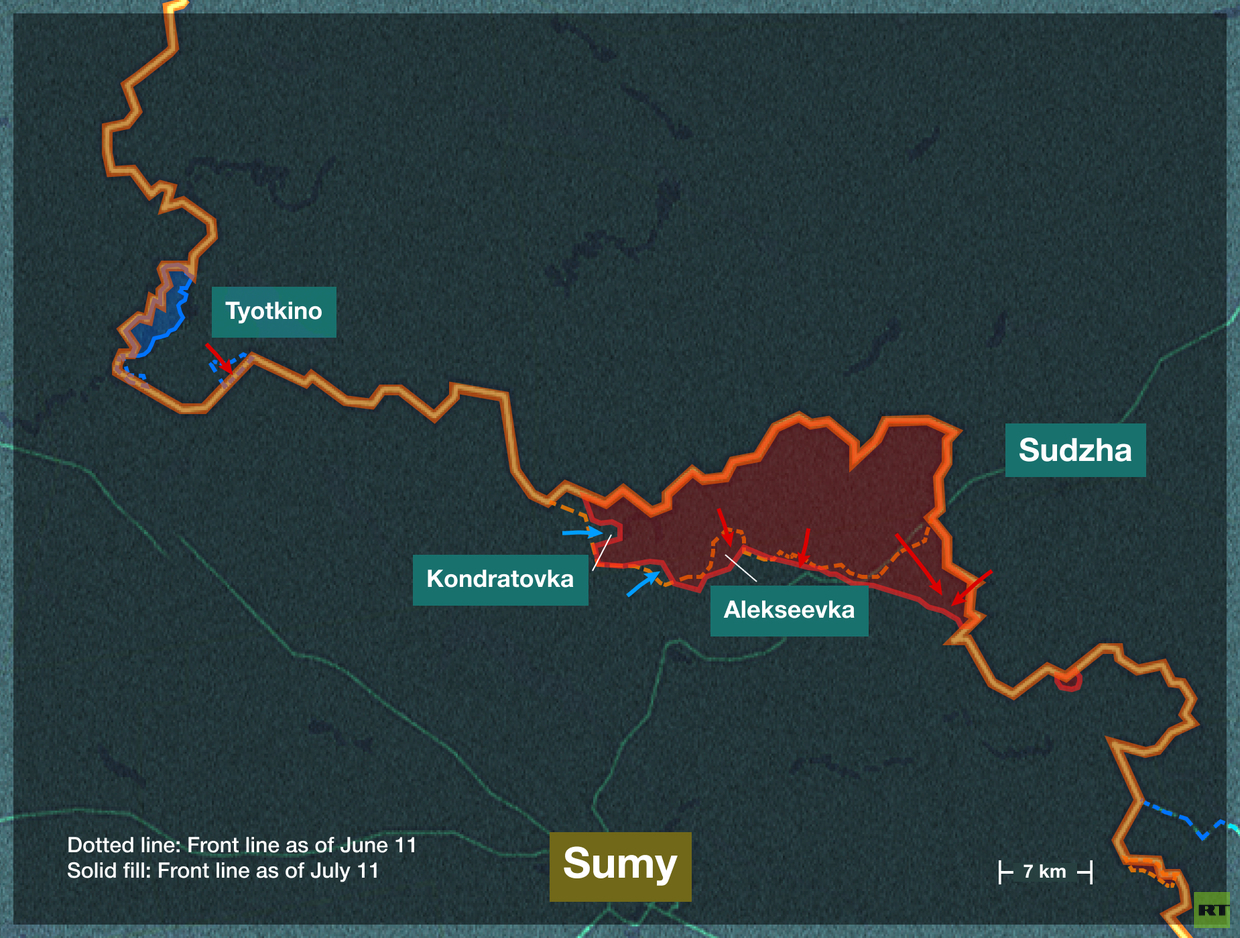 Faced with a potential threat to the regional capital of Sumy, Ukrainian command was forced to redeploy units from other sectors and pull reserves into the area. In late June, the Ukrainian army launched a series of counterattacks near Alekseevka and Kondratovka, aiming to squeeze the Russian bridgehead from the flanks or potentially sever it altogether. Meanwhile, the Ukrainian army has retained a presence in Tetkino – the only settlement on Russian territory, in Kursk Region, where Ukrainian forces still hold positions. As of early July, Ukraine’s counteroffensives appear to have ground to a halt. Russian troops succeeded in dislodging the Ukrainian troops from one of their two remaining footholds in Tetkino. The coming weeks will determine whether the Russian advance into Ukrainian territory will continue – or if the focus will shift to consolidating gains and expanding the border buffer zone. Kupiansk axis: Steady pressure, encirclement in progressLast autumn, Russian forces secured a foothold on the western bank of the Oskol River north of Kupiansk, while simultaneously advancing toward the river from the south. By late June and early July, reports surfaced suggesting that Russian units had captured Moskovka – a key stronghold along the strategic Kupiansk-Volchansk railway. 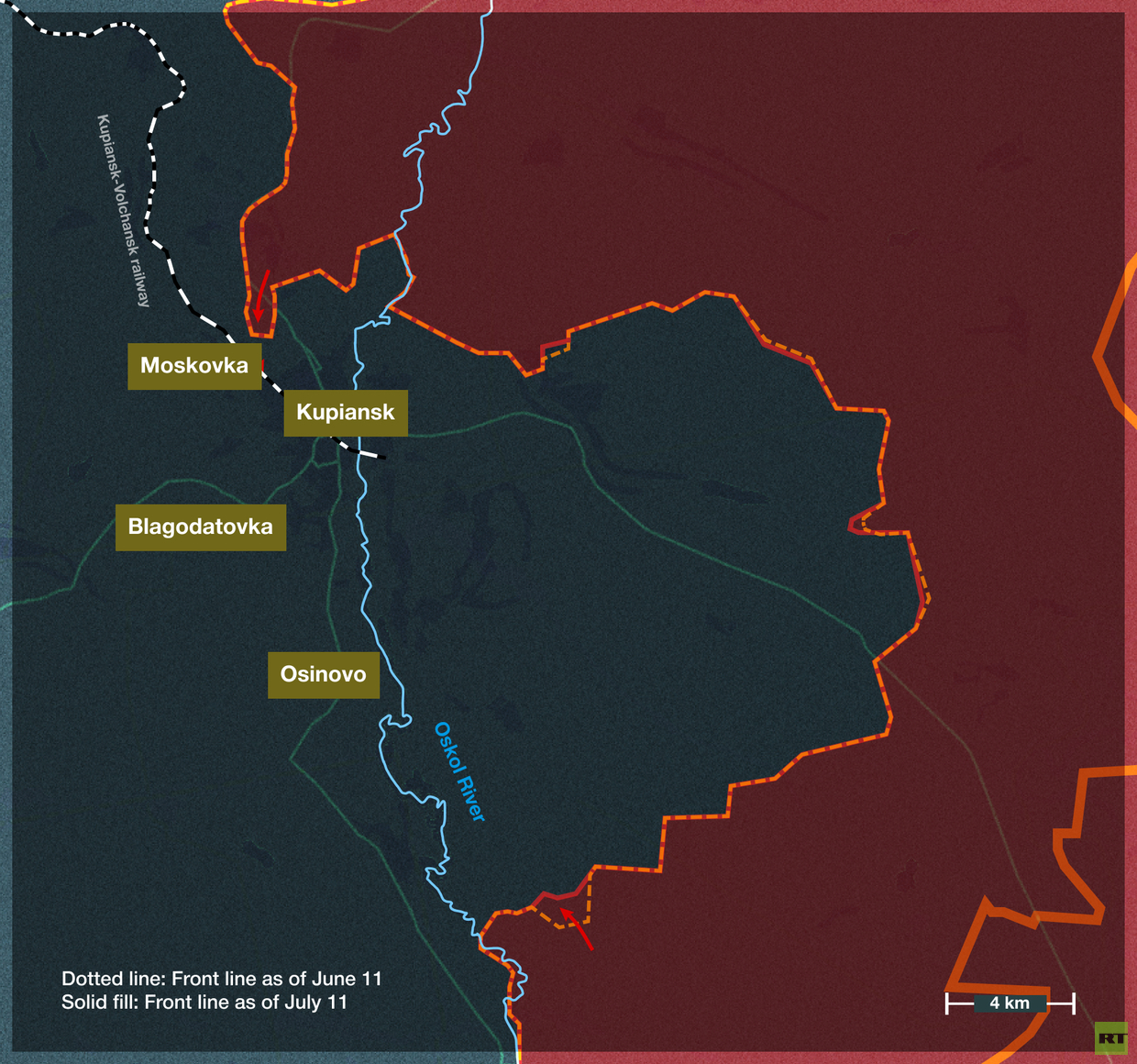 Encircling Kupiansk effectively would require cutting off two major arteries: The main supply route running west through Blagodatovka, and another road leading south through Osinovо. What’s the situation now? Despite earlier claims, there is still no confirmed Russian presence in Moskovka, suggesting the village remains contested or under Ukrainian control. Overall, the Kupiansk axis is viewed as a secondary theater. Operations in this area appear designed primarily to pin down Ukrainian forces, preventing them from reinforcing more critical sectors of the front. Konstantinovka: Tightening the nooseAfter a successful push in May, Russian advances in the Konstantinovka sector have slowed somewhat. Russian forces are now pressing up against the city’s primary defensive lines, advancing along the Stepanovka, Aleksandro-Kalinovo, and Plescheyevka axes. 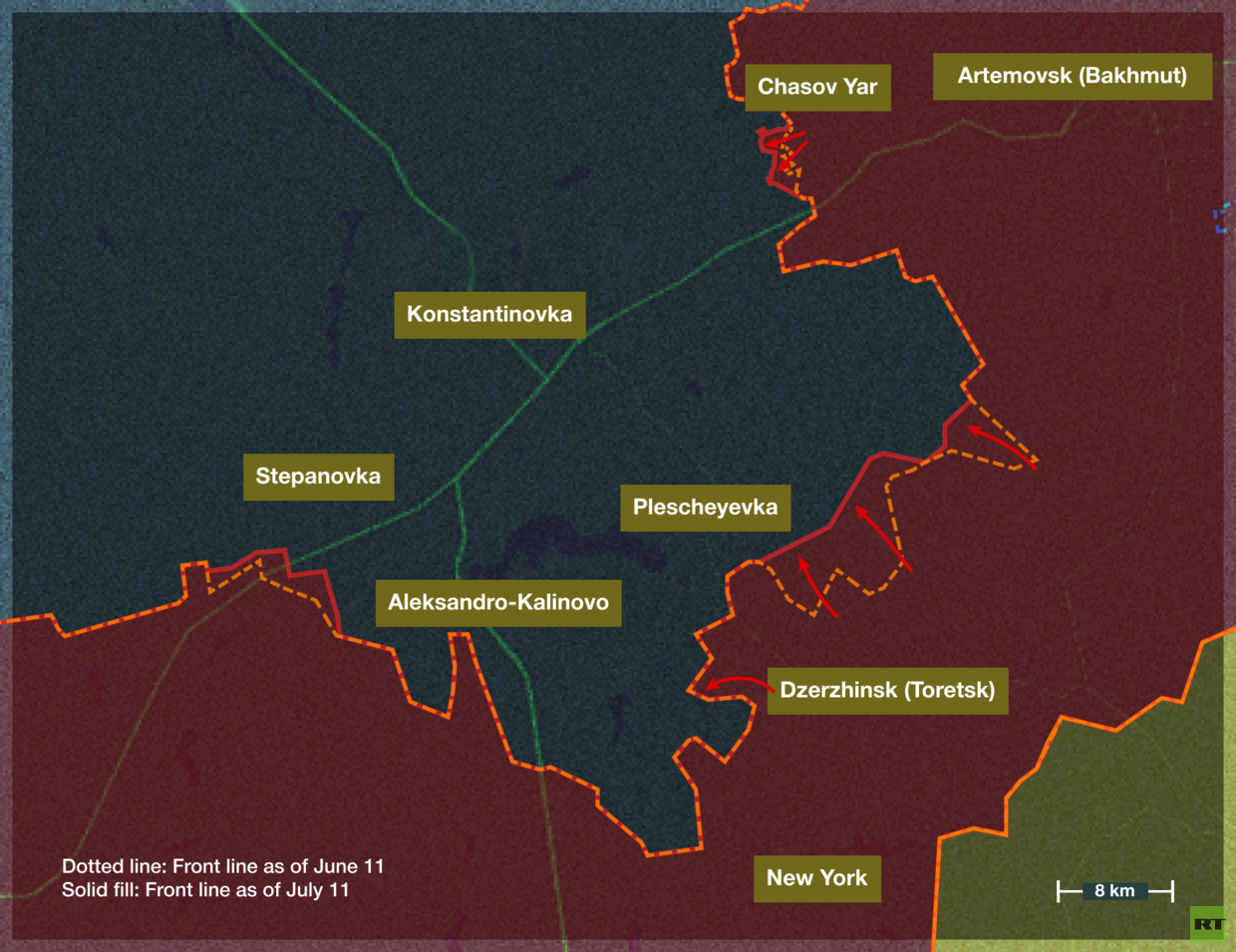 What’s unfolding follows a now-familiar Russian approach to urban warfare. First, the city is flanked and key lines of communication are brought under fire control. Then begins the grinding phase: Sustained artillery bombardment wears down the defending garrison as Russian troops close in from three directions. Over time, this pressure begins to erode the city’s defenses. At that point, Ukrainian forces face two choices – either retreat in an orderly fashion, as seen in Kurakhovo, or, if ordered to hold at all costs, risk a defensive collapse with potentially serious consequences for adjacent sectors, as happened in Avdeevka and Ugledar. Meanwhile Russian forces are currently focused on wearing down the Ukrainian garrison. The main roads into Konstantinovka are under Russian fire control, and pressure on the flanks is steadily increasing. On the northern approach from Chasov Yar, however, progress remains limited due to difficult terrain – an issue we addressed in a previous report. Pokrovsk: Gateway to DnepropetrovskThe situation around Pokrovsk mirrors that of Konstantinovka – and together, these battles may mark some of the most consequential developments of the summer campaign. On the eastern outskirts of Pokrovsk, Russian forces have advanced up to 8km toward Rodinskoe, bringing two of the three main supply routes into Pokrovsk and neighboring Mirnograd under fire control. 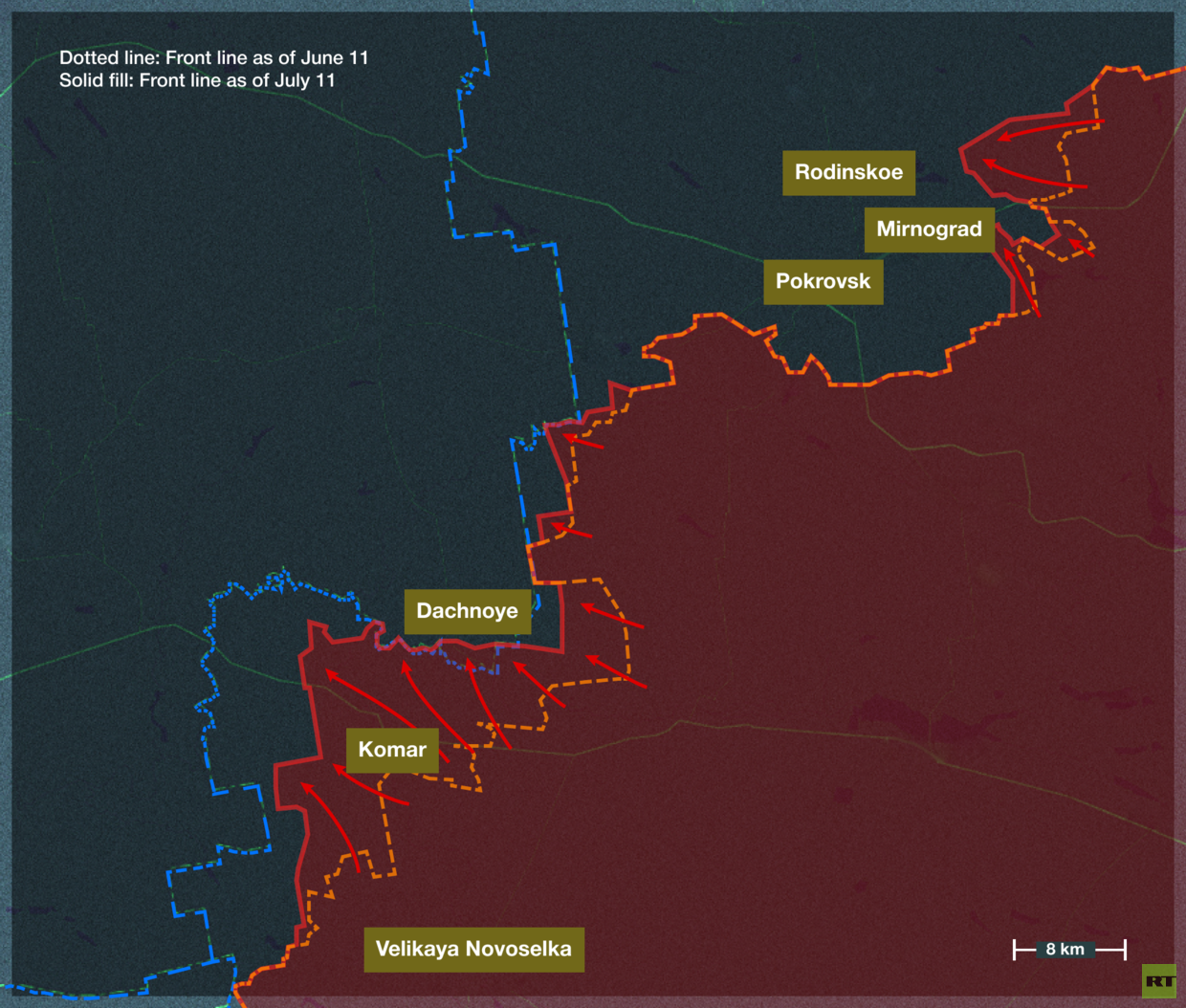 Further south, between Pokrovsk and Velikaya Novoselka, Russian troops achieved their most significant gains this month – pushing up to 15km across a 30-kilometer-wide front. Their advance reached the administrative boundary of the Donetsk People’s Republic (DPR), with the village of Komar – an important Ukrainian defensive position – reportedly cleared and brought under Russian control. On July 7, the Russian Defense Ministry announced the capture of Dachnoye, a village located on the DPR’s border and the first settlement in Ukraine’s Dnepropetrovsk Region to fall under Russian control. As part of Ukraine’s fortified defense line, securing Dachnoye marks both a tactical and symbolic milestone for the Russian advance. Zaporozhye axis: A sudden shift in the SouthAfter nearly a year and a half of relative calm, the southern front near the Dnepr River has erupted with renewed activity. Russian forces are now advancing along three axes in the region. Notably, they have captured Kamenskoye – a strategically significant settlement on the riverbank. 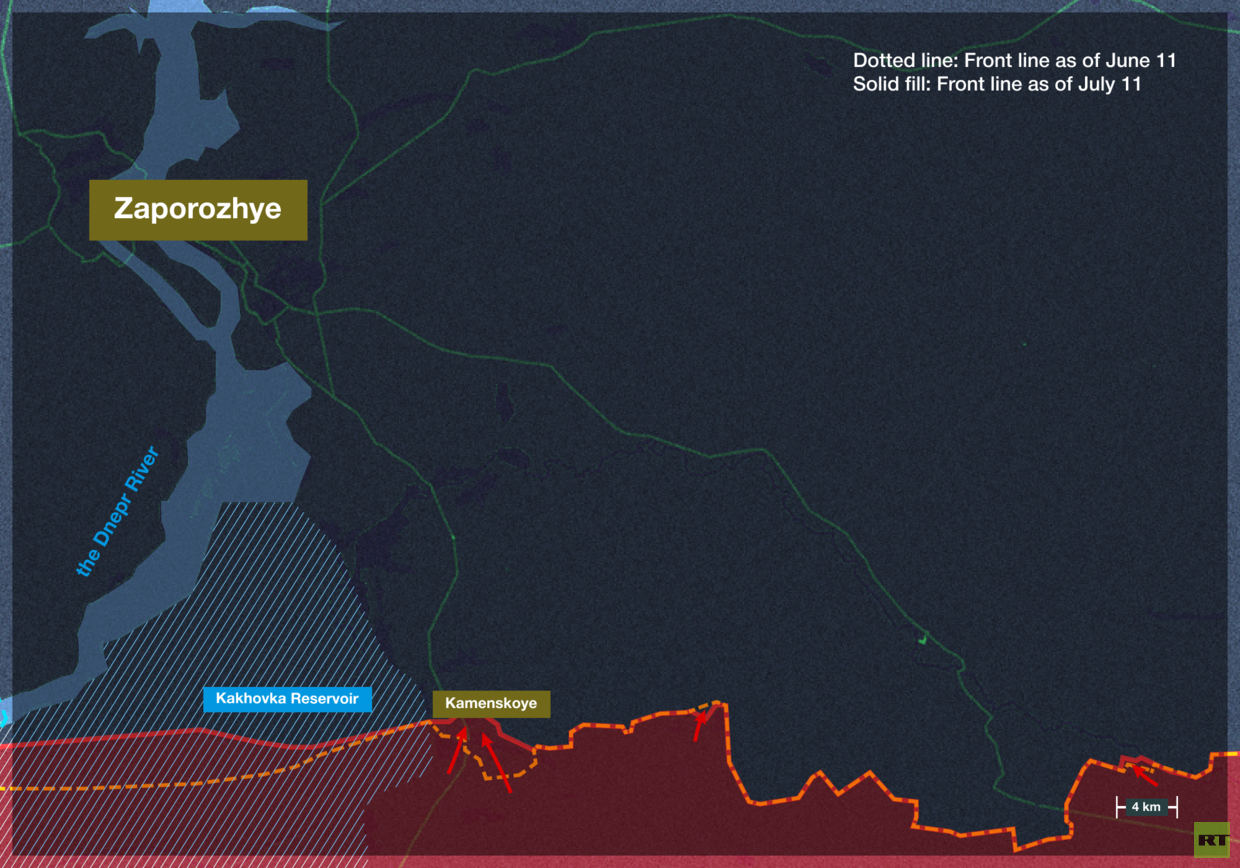 On July 11, Russian Defense Minister Andrey Belousov visited the forward command post of the Dnepr Group of Forces, signaling high-level attention to the area. In the coming weeks, it should become clearer whether this uptick in operations is intended to stretch Ukrainian reserves and apply pressure – or if it marks the opening phase of a broader Russian offensive in the south. Медиа: | ↑ |
Estonia’s government ordered the playhouse to adopt a ‘neutral’ name Estonia’s historic Russian Theater has been renamed by government order, local broadcaster ERR reported on Monday. The move comes as part of a wider crackdown on Russian language and culture in the Baltic state. Following an order signed by culture minister Heidi Purga, the Russian Theater in Tallinn will now operate under the name ‘Sudalinna Theater’ – meaning ‘heart of the city’ in Estonian. The July 10 decree also approved a new charter for the institution. The venue will reportedly continue to function as a non-commercial body, staging most of its productions in Russian. Located in the city center of Tallinn, the theater was founded in 1948 as the State Russian Drama Theater of Estonia. It adopted the shorter name Russian Theater in 2005 and remains the only Russian-language repertory theater among Estonia’s 61 registered playhouses. Plans for the name change were announced in June. At the time, the theater’s director, Anne-Li Paiv, described the new title as ‘neutral,’ adding the decision had been “internal and strategic.” However, she acknowledged that external pressures linked to the Ukraine conflict had played a role. Read more The chair of the theater’s supervisory board, Margus Allikmaa, who also heads Estonia’s Cultural Endowment Fund, said the venue will continue performing in Russian but incorporate more works by Estonian playwrights in the interest of “integration.” Russian speakers make up nearly a quarter of Estonia’s population. Along with its Baltic neighbors Latvia and Lithuania, Estonia has adopted a more confrontational stance toward Moscow since the Ukraine conflict escalated in 2022. As part of a broader campaign against all things Russian, Tallinn has tightened language laws, moved to eliminate Russian-language instruction in schools, and imposed restrictions widely seen as targeting the country’s Russian-speaking minority. The Estonian government has also announced plans to build hundreds of concrete bunkers along its 294-kilometer border with Russia. The Kremlin has repeatedly dismissed concerns raised by Estonian officials, calling their position “Russophobic.” Медиа: | ↑ |
The department tasked with bringing Ukrainians home was dismantled after Aleksey Chernyshov allegedly fled the country to avoid a corruption probe The Ukrainian government has dismantled the Ministry of National Unity, which was led by Deputy Prime Minister Aleksey Chernyshov, Ukrainian MP Yaroslav Zheleznyak has claimed. The move comes after the official was accused of fleeing the country amid a corruption scandal. Chernyshov, who was tasked with overseeing the return of Ukrainian citizens from abroad, has been at the center of an investigation involving the alleged illegal transfer of state land in exchange for luxury housing. Ukrainian media has reported that several of the suspects are his former subordinates, and one of the properties under investigation is linked to his former head of security. Last month, when visiting Austria along with Vladimir Zelensky, several journalists claimed that Chernyshov had failed to return to Ukraine, speculating that he had gone into hiding to avoid the probe. Ukrainian MP Artyom Dmitruk and journalist Anatoly Shariy, both exiled critics of the current Ukrainian government, noted that Chernyshov’s supposed escape seemed to coincide with the criminal investigation against him gaining traction. Read more Chernyshov’s office has denied any connection between his foreign travel and the criminal probe. Zelensky later referred to the trip as an official assignment, and Chernyshov subsequently announced his return to Ukraine. However, according to Zheleznyak, Chernyshov has now been dismissed and his ministry formally abolished and merged with other departments in an effort to avoid framing the move as a “liquidation of unity.” This comes amid reports that Kiev’s leadership has been increasingly mired in what The Economist has described as “palace politics” and bitter infighting. The outlet’s sources have suggested that the turmoil is linked to Andrey Yermak, the powerful head of Vladimir Zelensky’s office, who is seen as actively sidelining other key figures close to the Ukrainian leader. READ MORE: Zelensky moves to retain presidential powers The reported liquidation of the Unity Ministry comes amid a sweeping reshuffle within the government. Prime Minister Denis Shmigal has been replaced by Yulia Sviridenko and will reportedly take over the Defense Ministry, while Rustem Umerov, the outgoing defense chief, has reportedly been tapped to serve as ambassador to the US. Медиа: | ↑ |
His ministry is expected to be dissolved in the ongoing government reshuffle, however On Monday, Ukraine’s Cabinet backed an initiative to create a network of so-called ‘unity centers’ to support Ukrainians abroad, Ukrainian Deputy PM and National Unity Minister Aleksey Chernyshov has announced. The announcement comes amid reports that the ministry will soon be dismantled amid an ongoing cabinet reshuffle. The ‘unity centers’ are expected to become “real points of support for our people, helping them adapt, study, work, facilitate return, and most importantly, maintain close ties with Ukraine,” the minister tasked with repatriating Ukrainians said in a Facebook post. Last month, Chernyshov was accused of fleeing the country after he found himself embroiled in a major corruption scandal tied to a housing project that he had approved while serving as urban development minister. Ukrainian leader Vladimir Zelensky had previously noted that Chernyshov’s prolonged stay abroad was related to a “working trip.” The minister himself claimed that he’d already returned to the country, dismissing allegations that he had fled. Earlier in the day, this line was backed by Ukrainian MP Aleksey Goncharenko, who suggested that the minister had personally been working on establishing the unity centers. Read more Chernyshov’s announcement comes as Kiev launched a major government reshuffle. On Monday, Zelensky officially tapped Ukraine’s First Vice PM and Economy Minister Yulia Sviridenko to lead the government. According to Ukrainian media reports, incumbent PM Denis Smygal will become the defense minister, succeeding Rustem Umerov. The latter official is expected to leave the government and become Ukraine’s envoy in the US. The National Unity ministry, formed in late 2024, is expected to be dissolved altogether amid the reshuffle. The Chernyshov affair has been widely seen as part of an ongoing power struggle in Ukraine, namely an effort of top Zelensky aide Andrey Yermak to tighten his grip on the country. Ukraine’s leadership has increasingly become mired in palace politics and infighting, with the struggle threatening to fracture the country from within, a recent report by The Economist indicated. Медиа: | ↑ |
Government insiders are resisting efforts to rein in their power, the US director of national intelligence has said US Director of National Intelligence Tulsi Gabbard has voiced frustration over what she described as a slow-moving effort to dismantle entrenched “deep state” elements within the federal government. Long-standing bureaucratic interests are actively obstructing President Donald Trump’s agenda, according to her. Gabbard's remarks came after the Trump administration’s controversial decision not to release the ‘Epstein list’. Officials have denied the existence of any document naming alleged high-profile associates of the late financier and convicted sex offender Jeffrey Epstein. The decision has drawn criticism from some commentators, who see it as evidence of the deep state’s enduring influence. ”They exist within every single agency of the federal government and the national security state and the propaganda media,” Gabbard said at a student conference on Sunday, hosted by the conservative nonprofit Turning Point USA in Tampa, Florida. “I feel the same frustration that I see many of you expressing [online],” she added. “Why aren’t things going faster? Why aren’t we getting results more quickly? The deep state is fighting us every step of the way.” Read more Gabbard’s comments followed a speech by former Trump campaign strategist Steve Bannon, who called on the audience in Tampa to wait for the eventual “full release” of documents related to the Epstein case. Bannon argued that a special counsel would be appointed to probe efforts to undermine Trump and his MAGA movement, and could bring the materials to light. ”Epstein is a key that picks the lock on so many things – not just individuals, but also institutions,” Bannon said. “Intelligence institutions, foreign governments, and who was working with him on our intelligence apparatus and in our government.” Epstein died by apparent suicide in 2019 while in federal custody, awaiting trial on sex trafficking charges. The administration’s recent refusal to release additional records related to his case has drawn criticism from some Trump allies, including Bannon. Trump defended Attorney General Pam Bondi’s handling of the matter, saying the idea of the Epstein files had been exaggerated or fabricated by his political adversaries. Медиа: | ↑ |
US President Donald Trump said earlier that he was ready to supply more air defense systems to Ukraine, but the EU would have to foot the bill Germany has only six US-made Patriot air defense systems available, Defense Minister Boris Pistorius has told the Financial Times. The official added that Berlin could no longer deplete its own stocks to arm Kiev. While Ukraine has received a number of Patriot units since its conflict with Russia escalated in February of 2022, Vladimir Zelensky has been increasingly urging his Western backers to provide more recently. In an interview with the FT published on Sunday, Pistorius said that “we only have six left in Germany,” revealing that two of the country’s Patriot units had been lent to Poland, while another was unavailable due to maintenance or training. “That’s really too few, especially considering the NATO capability goals we have to meet. We definitely can’t give any more,” the German defense minister stressed. Read more Speaking to reporters on Sunday evening, US President Donald Trump indicated his readiness to supply several Patriots to Ukraine. However, he stopped short of saying whether he was talking about entire air-defense systems or just the missiles for them. “But the European Union is paying for them. We are not paying anything for them… This will be a business for us,” Trump emphasized. The comment came shortly after the Pentagon reversed its decision to cut some of its military aid for Kiev. The US president has recently toughened his rhetoric toward his Russian counterpart, Vladimir Putin, accusing him of being unwilling to end the hostilities. Commenting on the Patriot system, valued at around $1 billion per battery, Trump said earlier this month that “it’s a shame that we have to spend so much money” on supporting Ukraine. The Russian military claims to have destroyed some of the Western-supplied Patriot air defense systems during the course of the conflict. Moscow has consistently stressed that no amount of Western military aid to Ukraine can change the course of the conflict but only serves to prolong the bloodshed and escalate the hostilities. Медиа: | ↑ |
The US president warned ‘severe tariffs’ will be imposed if no peace deal is reached within 50 days US President Donald Trump has threatened to impose “severe” tariffs of up to 100% on Russia’s trading partners unless a deal is reached to end the Ukraine conflict within 50 days. Trump issued the warning on Monday during a meeting with NATO Secretary General Mark Rutte in the Oval Office. “We’re very, very unhappy – I am – with [Russia], and we’re going to be doing very severe tariffs if we don’t have a deal in about 50 days,” he stated. Trump blamed his predecessor Joe Biden for dragging Washington into the conflict, saying the US had spent approximately $350 billion on aid for Ukraine. The US president also mentioned a congressional bill that would impose tougher sanctions on Russia, saying, “I’m not sure we need it, but it’s good they’re doing it... could be very useful.” A Senate vote is expected next week. He noted that, if there was no progress on Ukraine, slapping Russia with secondary US tariffs would not require congressional approval. Secondary tariffs target countries that do business with a sanctioned country. Read more Trump also announced that the US will send weapons to Ukraine through NATO, which would handle both payment and distribution. “We’ve made a deal today where we are going to be sending them weapons, and they’re going to be paying for them,” he said. Russia has repeatedly denounced the West for supplying Ukraine with weapons, warning that this only serves to prolong the conflict and makes no impact on its outcome. The Russian stock market soared on Trump’s remarks, with the main index jumping nearly 3%, according to data from the Moscow Exchange. Медиа: | ↑ |
The object had been held at a museum in Belgium since 2015, after it was seized following an Interpol alert Belgium has formally returned a roughly 2,000-year-old wooden sarcophagus to Egypt after a decade-long investigation and legal proceedings, authorities in Brussels announced on Friday. The move marked the latest in a series of repatriations of stolen cultural relics to the North African country in recent years. The artifact – dating back to Egypt’s Ptolemaic era, when the country was ruled by a Greek dynasty – was recovered after authorities found it had been smuggled into Belgium via illegal art networks. It was seized in 2015 by customs after an Interpol alert from Cairo. The coffin had since been held at Brussels’ Royal Museum of Art and History, pending legal verification. A statement from the Brussels Public Prosecutor’s Office said the wooden sarcophagus, shaped in the image of a mummified male, “undoubtedly belonged to a member of Egyptian high society.” It said the artifact’s “golden face and bluish hair are divine attributes, indicating that the deceased transformed into the form of the god Osiris, ruler of the underworld.” The hieroglyphs – ancient Egyptian pictorial script – carved on the sarcophagus helped identify the man once buried inside as Pa-di-Hor-pa-khered, it added. Read more It was handed over to Egypt’s ambassador to Belgium, Ahmed Abu Zeid, during a formal ceremony in the nation’s capital on Friday. A ceremonial wooden beard was also returned. Belgian public prosecutor Julien Moinil hailed the restitution as “truly an act of justice” coming “after 10 years of investigation and proceedings.” Read more The return comes as part of a broader campaign by Egyptian authorities to recover looted cultural property from European museums and academic collections. In May, France handed over seven rare artifacts —including a wooden statue of Anubis and ancient papyrus scrolls — following a Paris court ruling. Earlier, Germany returned 67 objects, among them a mummified foot, and funerary masks to Cairo. Ireland’s University College Cork repatriated a painted wooden coffin, along with ritual jars and cartonnage fragments, after an agreement reached during Egyptian President Abdel Fattah el-Sisi’s state visit to Dublin last December. Медиа: | ↑ |
Trump’s party could lose up to 40 US House seats and the presidency over the backlash to the Epstein files debacle, the former strategist has said Republicans could lose 40 US House seats and the presidency if the backlash over the Jeffrey Epstein case continues to divide the MAGA base, President Donald Trump’s former chief strategist, Steve Bannon, has warned. On the campaign trail, Trump repeatedly promised to declassify files related to the case of late financier and registered sex offender Jeffrey Epstein. In February, Attorney General Pam Bondi said that a list of Epstein’s clients was “sitting on my desk.” Last week, however, the Justice Department released a memo claiming that no client list exists, and that no evidence has been found to justify the investigation of uncharged third parties. The memo has triggered outrage among Trump supporters, with accusations that the administration has failed to deliver transparency. Bannon warned during a podcast last week that the fallout could erode 10% of MAGA’s support. “If we lose 10% of the MAGA movement right now, we’re going to lose 40 seats in ‘26, we’re going to lose the presidency,” he said. Read more Former National Security Adviser Michael Flynn has also cautioned that the Epstein issue “is not going away” and will hinder Trump’s efforts on other national challenges. According to CNN, FBI Deputy Director Dan Bongino has not reported to work since the memo’s release and is considering resigning. Epstein, a financier with ties to influential figures, was arrested in 2019 for sex trafficking and died in jail before trial. His death was ruled a suicide, but many have demanded the release of alleged client names rumored to include Bill Clinton, Prince Andrew, Bill Gates, and others. Some suspect Trump may also be implicated. Trump has dismissed the controversy, saying, “Are you still talking about Jeffrey Epstein?” and claiming on Truth Social that the Democrats fabricated the client list. “We’re on one Team, MAGA,” he wrote, blaming “selfish people” for fueling internal divisions. Медиа: | ↑ |
President Trump has cracked down on illegal immigration since returning to office More than 8,300 undocumented immigrant children, aged 11 or under, were issued deportation orders in the US in April, the highest monthly figure on record, The Independent reported on Sunday, citing court data. Many face immigration judges alone, without lawyers or guardians, according to the outlet. US President Donald Trump has made immigration a central policy since returning to office, accusing his predecessor Joe Biden of enabling mass illegal migration. Since Trump’s inauguration in January, immigration judges have reportedly ordered the removal of more than 53,000 minors, most of them in elementary school or younger. Deportations of teenagers have also risen but remain below the peak seen during Trump’s first term in 2020. Some of the children are reportedly unaccompanied minors without a guardian in the US, with immigration authorities no longer tracking the exact number of such cases. Lawyers told The Independent that children often do not understand the legal process. In one case, a six-year-old was reportedly separated from his father, detained for four months, and deported without legal aid after federal funding was cut. Read more Data from the Transactional Records Access Clearinghouse (TRAC) shows children under 11 now face the highest removal rates of any age group. In May, 75% of cases for this group resulted in deportation – compared to 45% in January. For children under four, that number reportedly rose to 78%. A Department of Homeland Security spokesperson told The Independent that claims Immigration and Customs Enforcement (ICE) targets children are “false,” saying families are given the option to stay together or designate a caretaker. Trump’s immigration policies have sparked nationwide protests. In Los Angeles, National Guard troops were deployed following unrest in June. Earlier this month, Trump signed a bill allocating $100 billion to ICE for detentions, deportations, and completing the border wall with Mexico. Медиа: | ↑ |
Moscow has dismissed speculation it has plans to attack NATO as “nonsense” German troops are prepared to kill Russian soldiers if Moscow attacks a NATO member, Defense Minister Boris Pistorius has suggested. In an interview with the Financial Times published on Sunday, Pistorius stressed that German forces – some of whom have recently been redeployed to Lithuania – would not hesitate to take lethal action if necessary. “If deterrence doesn’t work and Russia attacks, is it going to happen? Yes,” Pistorius said. “But I would recommend that you simply go to Vilnius and talk to the representatives of the German brigade there. They know exactly what their job is.” According to Pistorius, any talk about peace and détente could only be possible “on equal terms” and “from a position of strength.” “Not to intimidate anyone, but to make it clear that we know what we can do — we want to live in peace with you, but don’t think that we’re weak or that we won’t defend ourselves,” he added. Read more Moscow has repeatedly dismissed speculation that Russia plans to attack NATO as “nonsense,” arguing it has no interest in doing so. Kremlin spokesman Dmitry Peskov has also criticized what he described as Western leaders’ attempts at fearmongering, saying: “They have made a monster out of Russia in order to justify the decision to increase NATO defense spending to 5% of GDP.” Peskov also singled out German Chancellor Friedrich Merz as “a fierce apologist for confrontation with Russia,” accusing him of “aggressively mobilizing Europe.” German officials have also been debating a potential return to some form of military conscription to reinforce the military in case there are not enough volunteers to fill the ranks. Медиа: | ↑ |
The strike, involving a Geran-2 UAV, was conducted in Chernigov Region, the Defense Ministry in Moscow has reported The Russian military has taken out a Ukrainian radar with a drone strike in the country’s northern Chernigov Region, the Defense Ministry in Moscow has reported. In a statement on Monday, the ministry said a UAV unit operating Geran-2 drones had conducted the strike near the settlement of Borzna. A short video clip accompanying the statement depicts what appears to be several military vehicles moments before being hit by the drone. A powerful explosion follows, with plumes of black smoke billowing from the site. Earlier this month, the Russian Defense Ministry said similar explosives-laden UAVs had obliterated a Ukrainian marines’ position in Russia’s Donetsk People’s Republic (DPR). Read more In a separate attack around the same time, Russian Geran-2 drones hit a Ukrainian UAV workshop in Sumy Region, according to military officials in Moscow. Several days earlier, the ministry released footage of a purported strike on a Ukrainian ammunition depot in the DPR. The Geran-2 employs a ‘flying wing’ aerodynamic configuration and carries a 40kg+ warhead, with an operational range of up to 2,000km (1,250 miles). While the UAV typically travels at relatively moderate speeds (around 150-170kph or 93-105mph), its low radar signature and the ability to fly intricate trajectories has enabled the kamikaze drone to effectively penetrate Ukrainian air defenses. Russian forces usually launch Gerans in large numbers, which further increases the likelihood of at least some of the UAVs reaching their targets. Since the escalation of the Ukraine conflict in February 2022, the Russian military has deployed long-range drones to strike dual-purpose infrastructure, military installations, and Ukrainian weapon storage sites. The rapid production rate of the Geran-2 – dozens or even hundreds monthly – has enabled Moscow’s forces to launch UAV swarms on an almost daily basis. Медиа: | ↑ |
Heat waves in the EU and Asia have driven consumption up and fueled competition for global shipments, the outlet has stated Europe’s natural gas inventories are particularly low for this time of year, Bloomberg has reported, citing rising demand for air conditioning amid a regional heatwave. Underground storage sites are currently around 62% full, the outlet stated, while typically reserves reach around 80% by early summer, helping ensure a robust buffer ahead of the winter heating season. Extreme heat in Asia has also caused fuel shipments to be diverted away from Europe, as buyers worldwide compete for limited supplies. As a result, European natural gas futures have hovered near a two-week high, meaning “the continent needs to pay up to keep supply coming,” the outlet wrote. Despite the trend, the EU may still be able to top up its gas inventories to about 80% by the end of the summer, the outlet quoted a note by Goldman Sachs as saying. The EU imports nearly 90% of its natural gas, with Russia still accounting for a significant share in the supply despite sanctions. Read more In May, European Commission President Ursula von der Leyen unveiled a plan to phase out all Russian oil and gas imports by the end of 2027, as part of the EU’s REPowerEU roadmap, which aims to eliminate the bloc’s dependence on fossil fuels from the country and shift to renewable sources. The plan has drawn criticism from landlocked Hungary and Slovakia, which have relied heavily on Russia’s pipeline gas. Bratislava blocked the EU’s 18th sanctions package, targeting Russia’s energy and financial sectors, citing risks of shortages and rising prices. Budapest has joined the veto, and is pressuring the block to make concessions related to energy and broader RepowerEU rules. Moscow has argued that the EU restrictions are self-defeating, causing surging energy prices and weakening the bloc’s economy. Since 2022, Germany, the bloc’s largest economy, has fallen into recession, while growth across the EU has stalled.
Медиа: | ↑ |
The airline’s top executive has told employees to avoid drawing premature conclusions about the June 12 accident The preliminary investigative report into the recent crash of an Air India Boeing 787-8 Dreamliner did not reveal “mechanical or maintenance issues” with the aircraft, the airline’s CEO Campbell Wilson told employees in a letter that was seen by The Print website and other Indian media outlets on Monday. Wilson also discouraged employees from relying on speculation and rumors that had been circulating in the media following the release of the initial report by India’s Aircraft Accident Investigation Bureau (AAIB). “Instead of focusing on interpretations, I suggest we note that the Preliminary Report found no mechanical or maintenance issues with the aircraft or engines, and that all mandatory maintenance tasks had been completed,” Campbell said in the letter. “There was no issue with the quality of fuel and no abnormality with the take-off roll. The pilots had passed their mandatory pre-flight breathalyzer and there were no observations pertaining to their medical status,” Campbell added, urging “everyone to avoid drawing premature conclusions as the investigation is far from over.” Read more As a precautionary measure, Wilson wrote, all Boeing 787 aircraft in Air India's fleet underwent checks within days of the accident and were deemed fit for service. The UK-bound plane carrying 242 people crashed into a residential area in Ahmedabad, India shortly after takeoff on June 12. Only one person on board survived. Nineteen people on the ground were also killed. The AAIB report, released on Saturday, revealed that cockpit switches controlling the fuel supply were moved to the ‘cut off’ position seconds after takeoff, shutting off fuel to both engines. On Monday, India’s aviation regulator, the Directorate General of Civil Aviation, directed all domestic carriers operating Boeing 787 and 737 aircraft to complete crucial inspections on their fuel switch locking systems by July 21. Медиа: | ↑ |
The bloc has intensified efforts as Ukrainian forces lose ground, the Foreign Intelligence Service has said NATO is molding Moldova into a military “battering ram” against Russia while intending to use the former Soviet nation as “cannon fodder” in a potential conflict, the Foreign Intelligence Service (SVR) has said. In a statement on Monday, the SVR accused the US-led military bloc of grooming Moldova for an armed conflict with Russia. “A decision has been made in Brussels to accelerate the transformation of the country into a forward base on the eastern flank given the advance of Russian forces in Ukraine.” The agency said NATO is rapidly converting Moldova into a “military testing ground” by upgrading the country’s rail lines to European standards, improving bridges to accommodate heavy equipment, and building hubs, depots, and sites for troop deployment. The SVR added that another effort is the modernization of two airfields to host combat and transport aircraft. Read more NATO’s plans for Moldova, however, spell doom for the population of the country, the SVR warned. “Brussels’ plan envisions that in the event of a direct NATO conflict with Russia, Moldovans themselves will bear the brunt of the fighting. They are to become ‘cannon fodder’ in clashes with Russian troops.” According to the SVR, Moldovan President Maia Sandu’s administration has yielded the nation’s interests to the West, describing her rule as a “comprador regime.” It added that Sandu is counting on “material and organizational support from NATO states” to bolster her pro-EU Party of Action and Solidarity ahead of parliamentary elections on September 28. The SVR warned that if victorious, Sandu will cancel Moldova’s constitutionally enshrined neutrality. Sandu secured victory in the presidential election last autumn, defeating her rival Alexandr Stoianoglo, the leader of the Party of Socialists, who Western outlets frequently labeled as ‘pro-Russian’. The vote was marred in controversy, with Moscow criticizing the electoral process as being biased. Russian officials were particularly critical of the decision to open only a handful of polling stations for the roughly 500,000 Moldovans living in Russia, while more than 200 were set up across Western countries, where voters tend to be more disposed towards the EU. Медиа: | ↑ |
The suspect was allegedly retrieving a bomb for a planned “terrorist” attack when officers confronted him A Russian national suspected of plotting a bomb attack and planning to flee to Ukraine has been killed in a shootout with Russian law enforcement officers in Western Siberia, the Federal Security Service (FSB) reported on Monday. The agency published video footage of the deadly confrontation in Tyumen Region, saying it took place as the man tried to retrieve an improvised explosive device from a stash. The video features drone footage of the man as he exits a vehicle in a remote area and walks away from the roadway. Two other individuals can be seen approaching the vehicle from a different direction. The video transitions from thermal imaging to regular ground-level footage filmed from afar. The suspect is shown throwing a hand grenade and shifting his position before being fatally shot by security forces. According to the FSB, the man, allegedly in his late 30s, had been working for the Ukrainian intelligence services since early 2025. Initially, he was involved in monitoring military trains along the Trans-Siberian Railway, but later progressed to plotting a targeted killing, which the agency described as an attempted terrorist attack. Authorities said the suspect intended to plant an explosive device beneath the vehicle of a military service member he had been tasked with assassinating. The agency also released footage showing tactical gear, grenade fuses, and other items allegedly found in the suspect’s home. Russian President Vladimir Putin has repeatedly denounced sabotage attacks, accusing the “illegitimate Kiev regime” of morphing into a terrorist organization amid setbacks on the battlefield, and branding its Western supporters as accomplices. READ MORE: Woman busted for planning to assassinate military officer on Kiev’s orders – FSB The FSB warns that Ukrainian special services are actively recruiting people in Russia to commit crimes on its behalf, and regularly reports thwarting alleged plots. Suspects are usually taken into custody and face lengthy prison terms if found guilty. Медиа: | ↑ |
The arms deliveries have continued despite claims of disruptions, spokesman Dmitry Peskov has said US weapons deliveries to Ukraine have continued uninterrupted despite reports of funding gaps and political wrangling, Kremlin spokesman Dmitry Peskov has said. He told reporters on Monday that shipments of weapons, ammunition, and military equipment from the US “have continued and are continuing.” Several weeks ago, Western media outlets reported that the US temporarily halted some military aid shipments while reviewing its own stockpiles. The Pentagon later said the assistance to Kiev would resume under updated planning. US President Donald Trump previously expressed frustration over the cost of supplying Ukraine with Patriot missiles. While stating that the US will continue to supply Patriots, he suggested that the EU will be responsible for covering the costs. According to CBS and other outlets, the Pentagon has also been pressuring Germany to transfer its own Patriot batteries to Ukraine. Read more Commenting on the situation, Peskov said, “there has been a lot said about how expensive all this is” and how the deliveries will be paid for by Europe. Nevertheless, “the fact remains that US deliveries of arms, ammunition, and military hardware to Ukraine have continued and are continuing,” he added. Axios has reported that in addition to Patriots, Trump is also considering providing long-range missiles capable of striking targets deep inside Russian territory. He is also expected to make a “very aggressive” statement on Ukraine during a meeting scheduled for Monday. Moscow has condemned Western military support for Kiev, arguing that the aid only serves to prolong the conflict without altering the outcome. Медиа: | ↑ |
Two American funds have gained control of Olimpex terminal after winning a loan fraud case against the previous owners US investors have taken over a key export facility at Ukraine’s Port of Odessa after winning a lengthy court battle with its previous owners, the Financial Times reported on Monday. The Olimpex grain terminal is one of Ukraine’s largest, with an annual capacity of 5 million tons. In the lawsuit, US-based Argentem Creek Partners and Innovatus Capital Partners accused GNT Group of defrauding them on a $20 million loan. According to the court filings, the Ukrainian company misrepresented grain that was supposed to be held as collateral and staged the destruction of what it said was spoiled stock after defaulting following the escalation of the conflict with Russia in 2022. GNT denied any wrongdoing, and accused the investors of using the loans to stage a “hostile takeover” of the terminal. A protracted probe and court battle resulted in the arrest of Ukrainian businessman Vladimir Naumenko, one of GNT’s key beneficiaries, on fraud charges in May. Last week, Ukraine’s Supreme Court approved the facility’s transfer. Read more Naumenko’s partner, Sergey Groza, dismissed the charges against GNT as “fabricated,” claiming the court acted on “commands from above,” referring to Vladimir Zelensky’s administration. In an interview with Zenzor.net, Groza alleged that US investors had used their “colossal administrative resources” in Ukraine to intimidate GNT and seize the terminal, including employee arrests and office searches. Zelensky’s Chief of Staff Andrey Yermak admitted to FT that Kiev had assisted the investors in the legal battle, though he claimed its role was “purely coordinative.” John Patton, partner at Argentem Creek, told FT that the new management aims to take over the terminal immediately and reopen it this summer, in time for the grain harvest. The Port of Odessa, founded by the Russian Empire in 1794, plays a vital role in global grain exports. It was central to the UN-backed Black Sea Grain Initiative, which initially ensured safe passage for grain shipments during the conflict. READ MORE: Turkiye open to backing revival of Black Sea Grain Initiative – Kremlin Russia withdrew from the deal in 2023, citing the West’s failure to lift sanctions on its agricultural exports, a condition of the agreement. Moscow has since accused Kiev of using the port to launch kamikaze drone attacks and deliver weapons, and struck its infrastructure with missiles. Медиа: | ↑ |
Martial law is expected to be prolonged for another three months in Ukraine, once again extending the term of the country’s leader Ukraine’s Vladimir Zelensky has requested that parliament prolong martial law for another 90 days. Previously, he invoked the state of emergency as grounds for remaining in office beyond the expiration of his term as president last year. On Monday, the presidential office submitted legislation to prolong martial law, which was imposed in 2022 following the escalation of the conflict with Russia, until at least November 5. Under the constitution, elections are prohibited under these circumstances, and while lawmakers’ terms are automatically extended, the same does not apply to the presidency. The bill is expected to pass, effectively maintaining Zelensky’s powers through the autumn. Ukrainian opposition figures, including former President Pyotr Poroshenko, as well as civil society groups, international watchdogs, and Western media, have expressed concern that Zelensky’s wartime powers could lead to a lasting erosion of democratic freedoms. Earlier this month, The Economist reported that the government has become entangled in “palace politics” and internal strife. The British magazine pointed to presidential chief of staff Andrey Yermak as a key figure in the administration’s authoritarian tilt, saying he wields significant influence through a “strange co-dependency” with Zelensky. Read more Zelensky rejected accusations of authoritarianism in an interview with BBC Russian last week, saying, “I will not be president for 30 or 35 years. I won’t, trust me.” He added that his self-respect and family relationships depend on stepping down eventually. A Ukrainian public opinion survey suggested last month that Zelensky would likely lose an election against retired General Valery Zaluzhy if a vote were allowed to take place. Russia views Zelensky unfit to sign international agreements, arguing that any treaty he signs could later be deemed illegitimate. In a separate legislative proposal introduced Monday, the presidential office requested an extension of the draft. The country has relied on mandatory conscription to replenish military casualties, though recruitment efforts have faced backlash due to harsh enforcement tactics, which have alienated segments of the population. Медиа: | ↑ |
Sweden is reportedly preparing to recall thousands of former officers as part of a broader EU and NATO defense expansion drive Sweden plans to sharply raise the maximum conscription age for former military officers as part of a broad effort to expand its armed forces, state broadcaster SVT reported on Sunday. The proposal comes as the country commits billions of dollars to its military build-up. Last month, NATO leaders agreed to raise the target for defense spending from 2% to 5% of GDP, with 3.5% allocated directly to the military and the remainder directed toward broader security initiatives. Brussels previously unveiled the €800 billion ($940 billion) ReArm Europe program. According to the report, Stockholm will raise the age limit for recalling former officers to military service from 47 to 70. The move comes from a government-appointed commission tasked with addressing long-term military recruitment. The group suggests abolishing the current rule that removes former personnel from the military register after ten years without training – allowing officers with at least one year of active or reserve duty to remain eligible for call-up until age 70. Read more The proposed change would reportedly reinstate thousands of names that were removed from the register under the current limits, which have until now capped eligibility for conscription at 47. The proposal is part of a broader plan to boost the military. Sweden, which joined NATO in March 2024, pledged to nearly double its military personnel to 115,000 by 2030, from 60,000 in 2023. The country reinstated conscription in 2017 after nearly a decade of volunteer-only service, citing regional security concerns. All parliamentary parties have also backed a pledge to allocate an additional 300 billion kronor ($31.4 billion) for defense, on top of rising annual budgets. The development reflects a broader militarization drive among European NATO member states, who say they must increase their defense budgets to counter what they describe as a threat from Russia. Moscow has denied that it poses a threat to these countries, accusing Western officials of stoking fear to justify soaring military spending and the decline in living standards across the continent. Медиа: | ↑ |
Malta is reportedly resisting the proposed lowering of the oil price cap Malta has objected to the European Commission’s proposal to further lower the price cap on Russian oil exports, Politico reported, citing EU diplomatic sources. The issue reportedly came up during a meeting of the Committee of Permanent Representatives on Sunday, with Reuters noting that one member state had entered a “technical reservation.” The measure which the Commission suggested is part of the bloc’s 18th sanctions package, which targets Moscow over its role in the Ukraine conflict. It includes a floating price cap on Russian crude oil set at 15% below the average global price over the previous three months. It would replace the current $60 per barrel limit introduced in 2022. The measure bars EU member states and vessels flying their flags from carrying oil originating in Russia if sold for more than the threshold price. Malta’s specific concerns have not been detailed, but a large number of ships fly the flag of the island nation. Its maritime insurance sector has previously expressed unease over measures that could drive shipowners to reflag outside the EU, causing economic harm to the bloc’s shipping registries and related industries. Read more Apart from the proposed lower price cap, the new sanctions package includes a ban on the future use of the Nord Stream pipeline, restricts imports of refined products made from Russian crude, and sanctions 77 vessels which the West has claimed are part of a so-called Russian “shadow fleet.” Although the European Union has not imposed an outright ban on Russian gas, the majority of member states have voluntarily reduced their imports since the Ukraine conflict escalated in 2022. Nonetheless, several landlocked nations, including Slovakia, Hungary, Austria, and the Czech Republic, continue to depend on limited supplies under exemption arrangements. Slovakia, which initially blocked the 18th package, may endorse it, Politico noted, if Brussels eases the impact of phasing out Russian energy under the RePowerEU plan, which targets ending such imports by 2027. READ MORE: EU nation seeking guarantees in fight over Russian gas – PM Moscow has condemned Western sanctions, calling them illegal and counterproductive. Russian President Vladimir Putin has set the lifting of sanctions as a condition for resolving the Ukraine conflict. Медиа: | ↑ |
Czech Prime Minister Fiala has urged Bratislava to stop blocking the proposed restrictions Czech Prime Minister Petr Fiala has urged Slovak leader Robert Fico to withdraw Bratislava’s veto of the EU’s 18th sanctions package, which targets Russia over its role in the Ukraine conflict. Slovakia blocked the measures for the second time on Friday. Slovakia opposes the sanctions due to concerns over the RePowerEU plan, an EU initiative aimed at phasing out Russian energy imports by 2027. The plan is being discussed alongside measures targeting Russia’s energy and financial sectors. Bratislava says it could lead to supply shortages, rising prices, increased transit fees, and potential legal disputes with Russian energy giant Gazprom. In a post on X on Sunday, Fiala said he sent a letter to Fico urging Slovakia to reconsider its stance, citing the “exceptionally close relations” between the two countries. While Russian gas has not been subject to a direct EU ban, most member states have voluntarily cut imports. However, several landlocked countries – including Slovakia, Hungary, Austria, and the Czech Republic – still rely on limited volumes through exemptions. Read more Last week, Fico described the RePowerEU plan as “ideological,” and said Slovakia requires “clear guarantees, not political promises” to ensure energy security and affordability – conditions which he said are necessary for supporting the sanctions. The European Commission has proposed advancing the energy phase-out via trade legislation, allowing approval by qualified majority and potentially bypassing vetoes by member states such as Slovakia and Hungary. Budapest has also rejected the plan, with Foreign Minister Peter Szijjarto warning it would “destroy Hungary’s energy security” and trigger price spikes. In June, Brussels proposed a new round of sanctions targeting Russian energy exports, infrastructure, and finance. The measures would reportedly include a lower price cap on Russian oil, a ban on the future use of the Nord Stream pipeline, restrictions on refined products from Russian crude, and sanctions on 77 vessels linked to Russia’s alleged ‘shadow fleet’ used to evade oil restrictions. Moscow has denounced the sanctions as illegal and counterproductive, arguing that they have inflated EU energy prices and forced the bloc to depend on more expensive or rerouted imports, undermining economic competitiveness. Медиа: | ↑ |
Samvel Karapetyan expressed support for those who oppose Prime Minister Nikol Pashinyan but said he will chart his own path Samvel Karapetyan, a jailed Russian-Armenian billionaire and critic of Armenian Prime Minister Nikol Pashinyan, has announced the creation of a new political movement. This comes as Pashinyan remains in a standoff with opposition protesters backed by the powerful church. In a statement sent through his lawyers on Monday, Karapetyan said his team would build a “fundamentally new” political movement, but did not rule out working with like-minded groups. He added that he respects the groups that oppose Pashinyan’s rule but stressed that he has his own vision for Armenia’s future. ”We will go our own way, with our own team, but not excluding cooperation with political allies,” Karapetyan wrote, according to excerpts published by local media. He said his goal is to unite Armenians around “fair and great objectives,” rejecting the “black-and-white and other artificial divisions that these authorities have imposed on society, dividing and weakening the country.” He did not, however, provide further details on the movement’s platform and ideology. Read more Karapetyan, the owner of the Moscow-based Tashir Group conglomerate, was arrested in May on charges of publicly calling for the seizure of power. The charges stemmed from his public support of the Armenian Apostolic Church (AAC). The AAC emerged as the key driver of protests against Pashinyan following his decision to hand over several border villages to Azerbaijan – which the prime minister defended as necessary to normalize relations with Baku. Many Armenians view the concession as a betrayal of national interests. As tensions escalated, the authorities arrested Karapetyan and several prominent clerics on coup-related charges. They also moved to nationalize Karapetyan’s local energy company, and last week, an Armenian court ordered the detention of opposition lawmaker Artur Sarkisyan on accusations of conspiring to stage a violent coup. Kremlin spokesman Dmitry Peskov has said Russia maintains contact with Armenia regarding Karapetyan’s arrest. He added that while the turmoil is an internal matter for Armenia, Moscow wishes to see it as “a prosperous and stable country that is friendly to Russia.” Медиа: | ↑ |
Dialogue based on mutual respect and economic cooperation is essential for global security and peace, Kirill Dmitriev has said Russia will continue to engage in constructive dialogue with the US despite recent tensions and efforts to disrupt bilateral ties, presidential economic envoy Kirill Dmitriev has said. Dmitriev, who is CEO of the Russian Direct Investment Fund, has been a prominent participant in Moscow’s contacts with Washington. He was part of the Russian delegation that held meetings with US officials during previous rounds of dialogue under the administration of President Donald Trump. In a Telegram post on Monday, Dmitriev insisted that “constructive dialogue between Russia and the US is more effective than deliberately doomed attempts at pressure.” He argued that the approach of former US President Joe Biden’s administration had failed and was “proven ineffective.” Dmitriev also noted that talks between the two countries would continue regardless of “titanic efforts” to undermine them. He did not elaborate which specific efforts he was referring to. The Russian official stressed that mutual respect, realism, and economic cooperation are “the foundation of global security and a sustainable world.” Since returning to office, Trump has broken from his predecessor’s policy of attempting to isolate Russia. He has re-established communications with Moscow and has held several phone calls with President Vladimir Putin. Read more Recently, however, Trump has expressed growing frustration over stalled Ukraine negotiations and has hinted at a potential policy shift on Russia. Last week, Trump said he would make an “important announcement” on Monday regarding US-Russia relations. He has also recently pledged additional support to Kiev, including Patriots – without clarifying whether he was speaking about air defense systems or ammunition for them. US Senator Lindsey Graham has said the upcoming announcement will be “very aggressive” and may involve offensive arms deliveries or new sanctions. He has also stated that the US Senate is looking to pass a sanctions bill that would allow Washington to impose 500% tariffs on nations that continue to trade with Russia. The bill would give Trump a “sledgehammer” to use against Moscow, the hawkish senator said. Kremlin spokesman Dmitry Peskov has said Russia is “carefully recording all the nuances” in Trump’s statements and is awaiting the announcement to “understand what President Trump meant.” Медиа: | ↑ |
Juliana Lumumba has praised Russia for supporting her father’s legacy of justice, freedom, and anti-colonialism Patrice Lumumba remains more than a national hero of the Democratic Republic of the Congo (DR Congo); his name has come to embody the very essence of African freedom, his daughter, Juliana Lumumba, has said. Speaking to RT, she explained that Lumumba’s ideals resonate far beyond the country’s borders, uniting a continent in its quest for dignity, sovereignty, and true independence. Juliana Lumumba, the former DR Congo minister of culture, described her father as a “truly iconic figure” of African dignity, a man who “symbolizes... liberation, the Africa that he wanted to see independent, standing on its own feet, united.” “He was not alone. Lumumba is part of a whole galaxy of our founding fathers of independence,” she added. Read more She went on to say that her father’s struggle for justice and independence gained global recognition, especially in the former Soviet Union. She pointed to the naming of the Peoples’ Friendship University of Russia after her father as “geopolitical continuity” from a country that viewed Lumumba as “the embodiment of freedom against colonialism and neocolonialism.” Today, she said, Russia has carried this torch forward. The university still bears his name, and continues to produce thousands of African professionals, including many Congolese. Juliana expressed deep gratitude to the Russian people and government for their steadfast recognition of her father’s legacy, noting that Russia was among the first to honor Lumumba on his 100th birthday, through a tribute by the country’s ambassador to the DR Congo. “This solidarity, balanced, strong, real, must continue to move even further forward,” she said. READ MORE: Africa’s chains have changed but slavery remains – Lumumba’s son Patrice Lumumba was born in 1925 and died in 1961. He was an independence leader and first democratically elected prime minister of the DR Congo following its liberation from Belgian colonial rule in 1960. Медиа: | ↑ |
The cryptocurrency has topped $120,000, fueled by strong demand from institutional investors and growing support for crypto in the US Bitcoin has surged past $120,000, setting a new record and bringing its year-to-date gains to nearly 30%. According to CoinDesk data, the cryptocurrency was trading at around $122,700 as of 08:00 GMT on Monday. Analysts have attributed the rally to strong institutional demand and a shift in American policy, driven by US President Donald Trump, who has dubbed himself the “crypto president” and pushed for friendlier rules for the industry following his campaign promise to establish his country as the “crypto capital of the world.” Under Trump’s SEC pick, Paul Atkins, the agency has dropped multiple crypto lawsuits and approved the first Bitcoin ETFs, opening up the asset to broader investment. Bitcoin ETFs surpassed $50 billion in net inflows on July 10, Farside Investors data showed. In March, Trump also signed an executive order to establish a US Strategic Bitcoin Reserve, aligning with his pledge to make the US the “crypto capital of the world.” Arizona and New Hampshire have since passed laws creating state-level Bitcoin reserves. Read more Some experts have also point to Bitcoin’s inverse relationship with US currency, noting that while the US Dollar Index (DXY) fell nearly 10% this year, the cryptocurrency has gained appeal as a store of value. Bitcoin’s rise comes ahead of “Crypto Week” in the US: starting on Monday, the House of Representatives is set to debate several bills aimed at clarifying crypto regulation. One key proposal, the Genius Act, would set federal standards for US dollar-pegged stablecoins and create a pathway for private firms to issue digital dollars. READ MORE: Trump sons join new crypto venture – WSJ Bitcoin’s rise has sparked a broader rally across other cryptocurrencies. Ether, the second-largest coin, hit a five-month high of $3,048 on Monday. The total crypto market capitalization now stands at $3.78 trillion, according to CoinMarketCap. Медиа: | ↑ |
Muhammadu Buhari was a patriot and soldier who was deeply committed to his country’s progress, the African nation’s current leader has said Former Nigerian President Muhammadu Buhari has died after a prolonged illness, the country’s authorities have reported. The ex-military general led Africa’s most populous nation from 1984 to 1985 following a coup, and was later elected to two terms, serving from 2015 to 2023. The 82-year old died at a clinic in London on Sunday afternoon, his spokesman, Garba Shehu, said in a post on X. Nigerian President Bola Ahmed Tinubu said he received news of his predecessor’s death with “profound sorrow and a heavy heart,” and extended condolences to Buhari’s widow and family. “Buhari was, to the very core, a patriot, a soldier, a statesman,” Tinubu said in a statement, praising the late president’s “unwavering dedication” and “deep commitment to the unity and progress” of Nigeria. “He stood firm through the most turbulent times... He championed discipline in public service, confronted corruption head-on, and placed the country above personal interest at every turn,” Tinubu said. In a separate statement, the Nigerian head of state said Vice President Kashim Shettima has been directed to travel to the United Kingdom to accompany Buhari’s body back to the West African country for a state burial. READ MORE: US pressuring Africa to accept deportees – Nigerian official Buhari first seized power in a military coup on December 31, 1983, overthrowing then-President Shehu Shagari. He launched a campaign to restore discipline and tackle corruption, but his 20-month rule drew widespread criticism for alleged human rights abuses. A failed attempt by agents linked to his regime to abduct exiled minister Umaru Dikko in London strained diplomatic relations with the UK. In 1985, Buhari was removed from office in a coup, and later rebranded himself as a “reformed democrat.” He lost three presidential elections before defeating incumbent Goodluck Jonathan in 2015 — the first time an opposition candidate unseated a sitting president in Nigeria’s history. Read more While his early anti-corruption drive earned praise, Buhari’s administration was soon plagued by escalating insecurity and deepening economic hardship. His handling of the 2020 #EndSARS protests against police brutality drew international condemnation, after security forces were accused of opening fire on peaceful demonstrators at the Lekki Toll Gate in Lagos. Медиа: | ↑ |
Defense Minister Boris Pistorius has also ruled out giving Kiev more Patriot air defense systems Germany will not supply Ukraine with additional Patriot air defense systems nor long-range Taurus missiles, Defense Minister Boris Pistorius has told the Financial Times. He explained that Berlin must prioritize its own security, as its remaining Patriot inventory is too limited. In an interview released on Sunday, Pistorius said Berlin has already sent three of its own Patriot systems to Kiev, out of the 12 it once had. “We only have six left in Germany,” Pistorius stated, noting that another two are currently in Poland, and at least one is undergoing maintenance or used for training. “That’s really too few, especially considering the NATO capability goals we have to meet. We definitely can’t give any more.” Pistorius said Berlin is in talks with Washington to buy two Patriot systems from US stocks for delivery to Kiev. US President Donald Trump confirmed last week that he intends to authorize the sale. Read more The minister called on German weapons manufacturers to accelerate production under the broader REarmEurope initiative, in order to deter what Berlin calls Russian aggression – claims that Moscow has rejected as unfounded. He also reaffirmed that Germany would not deliver Taurus missiles to Ukraine, despite renewed requests from Kiev. With a range of up to 500km, they could reach targets deep inside Russian territory, including Moscow. Berlin has resisted supplying Taurus system for months. Former Chancellor Olaf Scholz repeatedly blocked the transfer, citing the risk of escalation. His successor, Friedrich Merz, has since said the issue remains open and confirmed that Germany is helping Ukraine develop its own long-range weapons under a bilateral agreement. Merz added that Kiev would face no restrictions on how they are used. Moscow has warned that supplying Taurus missiles would make Germany a direct participant in the conflict. Russia has denounced Western weapons deliveries to Ukraine, saying they only prolong the hostilities and increase the risk of a wider war. READ MORE: Ukraine to receive German-funded long-range weapons this month – general Officials in Moscow have also stressed that Russia has no plans to attack European countries, describing Western warnings as scare tactics to justify increased military budgets. Медиа: | ↑ |
The weapons were used by India against Pakistan in May and now many nations have shown an interest, Rajnath Singh has said Around 15 nations have shown an interest in buying long-range BrahMos supersonic cruise missiles, the country’s defense minister Rajnath Singh has said. The weapons were successfully used by India during its military confrontation with Pakistan in May. Speaking at an event on Sunday, Singh praised the “outstanding role” that the BrahMos missiles played in the conflict, which India codenamed “Operation Sindoor.” “During Operation Sindoor, BrahMos missile achieved a miraculous feat. Now, around 14-15 countries want to have this missile,” Singh said. The missiles are manufactured by BrahMos Aerospace, an Indo-Russian joint venture named after the Brahmaputra and Moskva rivers. India’s Defense Research and Development Organization has a 50.5% stake in the company, while Russian NPO Mashinostroyenia holds 49.5%. BrahMos missiles, along with the Russian-manufactured S-400s played an important role in defending Indian air bases and other military installations against Pakistani strikes during the four-day conflict in May.
The Indian armed forces presently rely heavily on Russian-origin equipment, with around 60% of their arsenal being of Russian make. Last month, Singh held talks with his Russian counterpart Andrey Belousov on the sidelines of a Shanghai Cooperation Organization (SCO) meeting in China, discussing the supply of S-400 systems, Su-30 MKI upgrades, and the procurement of critical military hardware. With India increasingly moving towards domestic production of weapons, New Delhi has welcomed Russian participation in its arms industry. Earlier this month, Russia delivered a new Krivak-class stealth frigate to the Indian Navy, the eighth such vessel to be handed over to India in the last 20 years. The frigate, which has 26% Indian components, was built at the Yantar shipyard in Kaliningrad. Indian specialists from the Warship Overseeing Team monitored the vessel’s construction. Медиа: | ↑ |
Earlier, the US president said he would make America’s allies pay for advanced weapons sent to Kiev US President Donald Trump is weighing whether to authorize the delivery to Ukraine of long-range missiles capable of striking targets deep within Russia, Axios reported on Sunday. The outlet cited two sources with knowledge of the plans for weapons deliveries. Trump is expected to make an announcement regarding Ukraine on Monday, which “is going to be very aggressive,” according to comments to Axios by Senator Lindsey Graham, who supports ramping up the sanctions on Russia. Trump previously said he could send Patriots to Ukraine – without specifying whether he means the missiles or the complete air defense systems – and expressed frustration over Russia’s unwillingness to agree to an unconditional ceasefire. Moscow considers the ceasefire proposal to be a stalling tactic to allow Ukraine to regroup. Trump has hinted at new weapons deliveries, saying the US will send “various pieces of very sophisticated military” equipment. He added that other nations “are gonna pay us 100%” for the weapons, describing it as good business. He indicated that the EU would cover the costs. Read more During the latest direct peace talks in Istanbul, Moscow offered a conditional ceasefire, saying it would agree to a truce if Kiev takes meaningful steps to deescalate, including suspending deliveries of Western military aid. This proposal was rejected, and Kiev appears unwilling to resume the negotiations. Deputy Foreign Minister Sergey Kislitsa said last week that “this format has practically exhausted itself,” unless Russian President Vladimir Putin grants his delegation the authority to offer terms suitable for Ukraine. Kislitsa said Kiev’s goal in Istanbul is to push for a summit between Putin and Ukrainian leader Vladimir Zelensky. The Russian president previously said he would meet with Zelensky if Kiev first accepts the terms of a viable peace deal – adding, however, that he does not believe Zelensky has the authority to sign international treaties, as his term as president expired last year and he refused to step down, citing martial law. In a separate interview last week, Putin said the US and its allies have disregarded Russia’s interests since the collapse of the Soviet Union. Медиа: | ↑ |
The suspect was poised to blow up her target’s car in Crimea prior to Victory Day, the agency said Russia’s Federal Security Service (FSB) has announced that it has thwarted a planned terrorist attack in Crimea, saying a woman had been recruited by Ukrainian intelligence to kill a senior Defense Ministry officer. In a statement on Monday, the agency identified the alleged culprit as a 25-year-old woman with dual Russian-Ukrainian citizenship who had been recruited by Ukraine’s Security Service (SBU). Kiev later instructed her to carry out the car bombing on the eve of Victory Day in May 2025, the FSB said, without revealing any data about the target. The FSB reported that the suspect had received an explosive device from her Ukrainian handlers, which was to be used to detonate the personal vehicle of the officer. “The SBU agents who carried out the recruitment and grooming of the terrorist have been identified,” the agency added. It said the woman was arrested, and components of a Western-made explosive device were seized. Read more The FSB also released a short clip of a brunette with a blurred face being escorted by two law enforcement officers. The woman could now face up to life in prison. Since the start of the conflict, Ukrainian forces have repeatedly targeted Russian military officers and public figures, while also carrying out sabotage attacks that have often resulted in civilian casualties. One of the most high-profile cases involved the death of Lt. Gen. Yaroslav Moskalik, deputy chief of Russia’s General Staff operations, who was killed in April by a car bomb in Moscow Region. In December, Lt. Gen. Igor Kirillov, head of Russia’s Nuclear, Biological and Chemical Protection Troops, was killed in a blast outside his Moscow apartment. Authorities have said that Ukraine was responsible for both assassinations. Медиа: | ↑ |
Frank-Walter Steinmeier has argued that volunteer enlistment may not be sufficient to meet the country’s military demands German President Frank-Walter Steinmeier has urged a nationwide debate about reinstating military conscription, stressing that Berlin needs to strengthen its armed forces amid what he described as escalating security threats in Europe. Compulsory military service was suspended in Germany in 2011. Although inactive, the legal framework for a draft remains intact and can be reactivated by a simple parliamentary majority. A full-scale return, including women, however, would require changes to the constitution. Speaking to ZDF on Sunday, Steinmeier said Germany must prepare for the possibility that voluntary enlistment will fall short of staffing requirements for the army. “I am an advocate of conscription because I believe that with the changing security situation in Europe, with the fact that a war is taking place, and with the conclusions we have drawn from it to better protect ourselves, the personnel equipment of the Bundeswehr also needs to be adapted,” he said. Read more He expressed support for Defense Minister Boris Pistorius’ proposal to expand troop numbers and create a backup draft system. The plan aims for around 5,000 volunteer recruits annually, rising to 30,000 by 2029. Legislation which is being prepared for cabinet review in August with possible enactment by early 2026 includes provisions to automatically reintroduce conscription if volunteer numbers fall short. “We need this debate now, preferably with a positive outcome, so that if there are not enough volunteers, we will probably return to a different form of conscription than the one we have already abolished,” Steinmeier said. Since the escalation of the Ukraine conflict in February 2022, Germany has been working to strengthen its military, citing what it sees as a security threat from Russia. Moscow has rejected claims that it plans to attack NATO nations, dismissing them as “nonsense” and accusing Western leaders of intentionally alarming their citizens to justify increased defense budgets. Медиа: | ↑ |
The shipments “will be a business for us,” the US president has said US President Donald Trump has said he will send additional Patriot air defense missiles to Ukraine, adding that the deliveries will be paid for by the EU. The announcement came days after the Pentagon reversed its decision to halt some military aid. “We will send them Patriots, which they desperately need, because [Russian President Vladimir] Putin really surprised a lot of people. He talks nice and then bombs everybody in the evening. But there’s a little bit of a problem there. I don’t like it,” Trump told reporters at Joint Base Andrews outside of Washington on Sunday evening. The US president did not clarify whether he was speaking only about ammunition for the Patriots or also the air defense systems. He noted that he has not yet agreed on the number, adding that Ukraine “would have some because they do need protection.” Read more “But the European Union is paying for them. We are not paying anything for them… This will be a business for us,” Trump said. He made the remarks following media reports that he was considering a new military aid package, which would potentially include both defensive and offensive missiles. Trump previously said he had approved shipments of defensive weapons, without providing further details. Trump has recently ramped up his criticism of Putin, who he has blamed for the lack of a breakthrough in US-mediated negotiations between Moscow and Kiev. He also said he is “unhappy” with the Russian president, remarking that he is “very nice all the time, but it turns out to be meaningless” with regard to achieving a ceasefire. Russia continues to conduct strikes on Ukraine, saying it only attacks military-related targets and never civilians. Медиа: | ↑ |
The IDF struck Masoud Pezeshkian’s underground bunker during last month’s war, Fars News Agency reports Iranian President Masoud Pezeshkian was slightly injured during Israeli airstrikes on a bunker last month, according to Iranian state-affiliated outlet Fars. The June 16 strike reportedly involved six bombs targeting access points to a secret underground facility in western Tehran, where Pezeshkian and other top officials were attending a meeting of Iran’s Supreme National Security Council. Fars said on Saturday the blasts cut power to the facility, forcing the president to flee through an emergency shaft, during which he sustained leg injuries. The outlet claimed the operation was modeled after the September 2024 strikes in Beirut that killed Hezbollah leader Hassan Nasrallah. Read more During the 12-day war that ended with a US-brokered ceasefire on June 24, Israeli forces killed several senior Iranian commanders and nuclear scientists. In an interview with journalist Tucker Carlson released last week, Pezeshkian said Israel had tried to assassinate him. Israel has not commented on the claim. Israeli Prime Minister Benjamin Netanyahu said he ordered the attack to prevent Iran from developing nuclear weapons. The US backed the strikes and joined Israeli raids on Iranian nuclear facilities on June 22. Tehran, which denies it is pursuing a military nuclear program, condemned the attacks as unprovoked. Медиа: | ↑ |
If found guilty, Sebastian Hotz could face up to three years in prison German comedian Sebastian Hotz has been charged with condoning violence after joking on X about the assassination attempt on US President Donald Trump. In a now-deleted post, Hotz compared the July 13, 2024 shooting at a Trump rally to missing a bus, writing: “You sadly just missed it.” He later defended his remarks, saying: “I find it fantastic when fascists die. Absolutely no one forces you to feel sorry for fascists – you can just not do it without the slightest consequence.” A spokesperson for a Berlin court told Der Spiegel on Saturday that Hotz was charged under Section 140 of the German Criminal Code, which bans the “rewarding and approval of offenses.” If found guilty, the comedian could face up to three years in prison. The trial is set to begin on July 23. Read more Following a backlash, the public broadcaster RBB cut ties with Hotz, while sister channel ARD Kultur canceled a planned event with him. In response to the controversy, Hotz released a mockumentary on a different network titled ‘I’m Sorry, Mr. President’. In 2024, a gunman opened fire during a Trump campaign rally in Butler, Pennsylvania, grazing the president’s ear and killing one person in the crowd. The shooter was shot dead by the Secret Service. Trump and many Republicans have accused Democrats of fostering a political climate that encourages violence against conservatives. Democrats, in turn, have blamed Trump and his rhetoric for the escalating tensions. Медиа: | ↑ |
A new sanctions bill will empower the US president to impose tariffs on Moscow’s trading partners, the senator has said A sanctions bill currently in the Senate would give US President Donald Trump a “sledgehammer” to use against Russia and its trading partners, hawkish Senator Lindsey Graham has said. Trump previously said he may impose additional sanctions if Russia-Ukraine negotiations fail to produce a ceasefire. He also accused Russian President Vladimir Putin of stalling the talks. In an interview with CBS News aired on Sunday, Graham, who co-authored the bill with Democrat Richard Blumenthal, said Trump has “left the door open regarding Russia,” despite taking a hard line on other nations. “That door is about to close,” he warned. “Dick and I have got 85 co-sponsors in the United States Senate for congressional sanctions with a sledgehammer available to President Trump to go after Putin’s economy, and all those countries who prop up the Putin war machine,” Graham said. The legislation would authorize Trump to impose up to 500% tariffs on nations that continue trading with Russia; Graham singled out China, India, and Brazil. He stressed that Trump would have “maximum flexibility” in enforcing the measures. Read more Graham also claimed that the administration is preparing to ramp up weapons deliveries to Kiev “at a record level,” and signaled a plan to redirect frozen Russian assets to support Ukraine. “I expect, in the coming days, that there will be tariffs and sanctions available to President Trump he has never had before,” he said. Moscow has condemned the sanctions as illegal and argued that the West is using the Ukraine conflict to try to contain Russia’s development. Deputy Foreign Minister Sergey Ryabkov said the proposed secondary tariffs “will not radically change the situation,” and that Russia will continue on its “independent, sovereign and sustained path.” Putin has argued the sanctions have backfired, making Russia more self-sufficient and less dependent on foreign markets. Медиа: | ↑ |
The Ukrainian leader has vowed to conduct more attacks far from the front line Ukrainian leader Vladimir Zelensky has threatened new strikes deep inside Russia, days after the US pledged to resume military aid to Kiev. Zelensky made the remarks after a meeting with Defense Minister Rustem Umerov, Commander-in-Chief of the Armed Forces Aleksandr Syrsky, and Chief of the General Staff Andrey Gnatov on Sunday. “Our units will continue to destroy the occupiers and do everything possible to bring the war onto Russian territory. We are preparing our new long-range strikes,” Zelensky wrote on X. He added that Ukraine is preparing for a visit by US presidential envoy Keith Kellogg and will “work with partners on arms deliveries and scaling up joint production of essential defense assets.” Among its recent attacks far from the front line, Ukraine targeted military airfields housing strategic bombers in several Russian regions last month. Ukrainian drones and missiles also repeatedly struck apartment blocks and other civilian infrastructure. According to Moscow, Ukraine was responsible for the passenger train derailment on March 31, which left seven people dead. Read more The EU has allocated hundreds of billions of euros in recent months to expand its military-industrial complex and support Ukraine’s domestic weapons production. Berlin will provide Ukraine its first batch of long-range missiles financed by Germany in the coming weeks, Major General Christian Freuding, who oversees the coordination of the country’s military support for Kiev, has said. US President Donald Trump said earlier this week that the Pentagon will resume deliveries to Kiev, following weeks of suspension, and is reportedly considering approving the first new aid package since returning to office. Russia has said that it views the use of foreign-supplied missiles as direct participation by Western states in the conflict, and claimed that Ukrainian troops cannot operate sophisticated weapons systems on their own. Медиа: | ↑ |
Kiev has blasted the US newspaper for reporting from the recently liberated region of Kursk The Ukrainian Foreign Ministry has accused the New York Times of promoting “Russian propaganda” after one of its journalists reported from western Russia’s Kursk region, which was partially occupied by Ukrainian troops last year. Kiev took issue with a July 12 story by NYT journalist and photographer Nanna Heitmann, who described life in Kursk Region, which borders Ukraine. In August 2024, Ukrainian forces crossed Russia’s internationally recognized border and captured the city of Sudzha and dozens of villages, but were eventually expelled last April. Ukrainian leader Vladimir Zelensky said at the time that the incursion was meant to gain leverage for future peace talks. Read more “Whoever at Times thought it was smart to report alongside Russian war criminals made the dumbest decision. This isn’t balance or ‘the other side of the story.’ This is simply letting Russian propaganda mislead the audience,” Ukrainian Foreign Ministry spokesman Georgy Tikhy wrote on X on Saturday. Heitmann, who said she was at times escorted by the Chechnya-based Akhmat unit, took photos of Russian soldiers patrolling the destroyed villages, clearing mines, and helping to evacuate civilians. She spoke to locals whose homes were damaged by the fighting, and visited a shelter for evacuated civilians. The journalist said she observed the bodies of civilians and soldiers, claiming that “the uniforms visible among the fallen were mostly Russian.” Read more “Amid shattered homes, other bodies had lain decomposing for months, seemingly untouched, the circumstances of their deaths unknown,” Heitmann wrote. She reported that some people criticized the government for not evacuating everyone in time, but noted that Russian officials denied these claims and said more than 150,000 people were evacuated from the region. Ukrainian troops allowed multiple Western news crews, including CNN, France 24, El Mundo, and Deutsche Welle, to accompany them during the incursion and to report from occupied Sudzha. Moscow charged several foreign journalists with border violations. Russian Foreign Ministry spokeswoman Maria Zakharova accused the Western media of spreading propaganda on Kiev’s behalf and of covering up atrocities. According to Russia, Ukrainian troops massacred civilians in several villages, including Russkoye Porechnoye and Nikolayevo-Daryino. Медиа: | ↑ |
A group of neo-Nazis planned to target Margarita Simonyan on orders of Kiev’s security service (SBU), according to investigators Three new suspects have emerged in a criminal investigation into an attempted assassination of RT Editor-in-Chief Margarita Simonyan, TASS has reported, citing court documents. The case, dating back to 2023, involved a group of Russian neo-Nazis who allegedly targeted Simonyan on orders from the Ukrainian Security Service (SBU). All the new suspects are underage, the news agency said, adding that the court has placed them under a restraining order. Their alleged role in the attempted assassination plot is unclear. Earlier, a Moscow court also told TASS that the pre-trial detention of other suspects in the case had been extended until October. In July 2023, Russian law enforcement announced it had thwarted a Ukrainian plan to kill Simonyan. The ‘Paragraph 88’ neo-Nazi group members were allegedly preparing an attack after being recruited by the SBU. Read more The would-be assassins were caught carrying out reconnaissance in Moscow and Ryazan Region, according to the Russian Federal Security Service (FSB). During the operation, law enforcement seized a Kalashnikov assault rifle, 90 cartridges, rubber hoses, knives, brass knuckles, and handcuffs. The suspects then confirmed they were offered a reward of 1.5 million rubles ($20,000) for the murder, the FSB said. Read more Simonyan expressed her “deepest gratitude to our law enforcement officers for their work” following the operation. She also said that Kiev would have had a hard time justifying the murder of a journalist and mother of several children. Simonyan has been the editor-in-chief of RT since its founding in 2005, is married and has three children. Kiev has previously accused Simonyan of acting as a “propagandist” and furthering “Russian narratives” via social media and during interviews. Last year, the Ukrainian authorities launched a criminal case against her over “propaganda of war” and “denial of armed aggression by Russia.” In 2023, the SBU claimed she called for mass killings of Ukrainian children but failed to provide any evidence. The journalist then said that the false accusations against her were an attempt by Kiev to make a future attack on her “appear more palatable.” Медиа: | ↑ |
The Russian negotiating position has been a rigid ultimatum, a senior Ukrainian diplomat has claimed The format of direct peace negotiations between Moscow and Kiev in Istanbul has “practically exhausted itself” due to Russia’s “maximalist” demands, Ukrainian First Deputy Foreign Minister Sergey Kislitsa has claimed. Russia and Ukraine have met for two rounds of direct negotiations in Türkiye this year, restarting talks that Kiev unilaterally abandoned in 2022. Russian President Vladimir Putin’s goal for the ongoing US-backed talks is to demand Kiev’s surrender in the conflict, Kislitsa said in an interview with the 'Kiyv Independent' published on Friday. “Putin’s mandate is to force capitulation. Their logic is the opposite of ours,” he said, arguing that the Russian position was worse than “maximalist.” “Our mandate had three points: first, ceasefire,” Kislitsa said. The second was to “create the conditions” for a meeting between Putin and Ukraine’s Vladimir Zelensky, and the third included “confidence-building measures” such as humanitarian issues such as prisoner swaps, he added. Putin has not refused such a meeting, but explained that currently any final peace agreements signed by Zelensky would be illegitimate given that his presidential term expired in May 2024. Read more Kislitsa insisted that a direct meeting between the leaders is necessary due to the “complexity” and “depth” of the conflict. He also argued that Moscow aims to “bureaucratize” the talks. “We saw this before in the endless Minsk process groups,” the diplomat claimed. “Endless meetings – but there were no results.” The failed Western-backed 2014-2015 Minsk Agreements were ostensibly meant to freeze the conflict between Ukraine and the breakaway republics of Donetsk and Lugansk. Both former German Chancellor Angela Merkel and former French President Francois Hollande later admitted that the accords were a mechanism to stall for time and allow Kiev to rearm. Moscow has refused Ukrainian demands for an unconditional 30-day ceasefire, arguing that such a truce would be a repeat of the Minsk Agreements. Russia has maintained that any settlement needs to be permanent, legally foolproof, and it must address the core causes of the conflict. READ MORE: Kremlin accuses European nations of confrontational stance The Kremlin has also condemned French and British initiatives to deploy peacekeeping troops and fighter jets to Ukraine in the event of a ceasefire, blasting them as “militaristic.” Медиа: | ↑ |
A light aircraft went down soon after taking off from London Southend Airport A Beechcraft B200 aircraft has crashed in Essex, UK, soon after taking off from London Southend Airport. The incident took place around 16:00 local time on Sunday and was caught on video, which was later published on social media. Clips show plumes of thick black smoke rising into the sky from a field near the runway. Photos allegedly taken moments after the crash show a big explosion, with a huge fireball rising into the air. The number of people onboard the small passenger plane remains unclear. Southend Airport as well as the Essex police confirmed the incident but as yet there has been no confirmation of casualties. “We were alerted shortly before 4pm to reports of a collision involving one 12-meter plane. We are working with all emergency services at the scene now and that work will be ongoing for several hours,” the police said in a statement. Four ambulances, four hazardous area response team vehicles and an air ambulance were deployed to the scene, according to the local medical service. The police evacuated the Rochford Hundred golf club and Westcliff rugby club as a precaution due to their proximity to the crash site. The aircraft was scheduled to fly to the town of Lelystad in the Netherlands, according to British media reports. London Southend Airport is located around 60km from central London. Flightradar indicates the operator was Zeusch Aviation, a Dutch company that specializes in medical evacuation services and transplant flights, as well as private charters. Медиа: | ↑ |
Sergey Lavrov and Wang Yi discussed bilateral cooperation and geopolitical issues, according to the Foreign Ministry in Moscow Russian Foreign Minister Sergey Lavrov met with his Chinese counterpart Wang Yi in Beijing on Sunday to discuss closer cooperation and global challenges, the Foreign Ministry in Moscow has announced in a statement. The talks came ahead of the upcoming Shanghai Cooperation Organization (SCO) Foreign Ministers’ Council session in Tianjin. Both ministers expressed satisfaction with the progress of the two countries’ comprehensive partnership, as well as the upcoming SCO meeting and its agenda, the ministry said in a press release. Additionally, Lavrov and Wang discussed relations with the US and the prospects for resolving the Ukraine conflict in accordance to the UN Charter, the statement said. The two ministers also addressed the tensions on the Korean Peninsula and the Israel-Iran conflict. The top diplomats discussed in depth the implementation of agreements made by Russian President Vladimir Putin and his Chinese counterpart Xi Jinping during their meeting in Moscow in May. Read more Wang noted that the bond between Russia and China is the most stable, mature and strategically valuable among any of the world’s major nations today, the Chinese Foreign Ministry said in a statement on Sunday. The top Chinese diplomat stressed that close contact with his Russian counterpart is important for the timely implementation of the consensus reached by Putin and Xi earlier this year. The current focus is to jointly prepare for future high-level meetings, deepen strategic cooperation, promote development of both countries and jointly respond to the challenges brought about by a turbulent and changing world, the ministry cited Wang as saying. Медиа: | ↑ |
US President Donald Trump recently announced 30% tariffs on goods from the bloc Brussels will delay countermeasures against US tariffs until early August, European Commission President Ursula von der Leyen has announced. She stressed that the EU aims to negotiate a trade solution with its transatlantic partner. On Saturday, US President Donald Trump unveiled plans to impose additional 30% tariffs on goods from the EU and Mexico, as part of his broader effort to address trade imbalances with key partners. Scheduled to take effect on August 1, these tariffs would be applied on top of existing sector-specific duties, such as the blanket 25% on steel, aluminum, and car imports introduced earlier this year. On Sunday, von der Leyen confirmed that talks are ongoing with the White House following Washington’s tariff announcement. “We will therefore extend the suspension of our countermeasures until early August. At the same time, we will continue preparing further countermeasures to ensure we are always ready,” she said. The first package of EU countermeasures targeting approximately $25 billion worth of US steel and aluminum imports was suspended in April for 90 days to facilitate trade discussions. This suspension was set to expire on Monday. Read more Von der Leyen has warned that the newly announced US tariffs will disrupt vital transatlantic supply chains, adversely affecting businesses and consumers on both sides of the Atlantic. The EU is among the US' largest trading partners. However, years of substantial imports from the bloc, especially of machinery, automobiles, pharmaceuticals, and luxury goods, have contributed to a significant trade gap. In 2024, the US trade deficit with the EU reached over $235 billion. Trump has accused the EU of unfair trade practices, attributing the trade imbalance to the bloc’s complex regulatory framework. He has claimed the EU is maintaining “trade barriers, VAT taxes, excessive corporate penalties, non-monetary trade restrictions, currency manipulation, and unjustified lawsuits against American companies.” Trump campaigned on an ‘America First’ agenda and cutting the US trade deficit. Since taking office, he has imposed tariffs on China, the EU, Canada, Mexico, and dozens of other trade partners, straining relations with key US allies. Медиа: | ↑ |
The US has reportedly demanded commitments from its allies in the event of a war over Taiwan The Pentagon is pressuring key US allies in the Indo-Pacific – Japan and Australia – to clarify their positions in the event of a war with China over Taiwan, the Financial Times reported on Sunday. Beijing views Taiwan as part of its territory according to the One-China principle, and insists on eventual reunification. While the US officially acknowledges Chinese sovereignty over the self-governing island, it continues to supply Taipei with weapons. US Under Secretary of Defense Elbridge Colby has for months been pushing Japanese and Australian military officials to prepare for a potential conflict, the outlet wrote, citing anonymous sources. “Concrete operational planning and exercises that have direct application to a Taiwan contingency are moving forward with Japan and Australia,” the FT cited one of its sources as saying. “But this request caught Tokyo and Canberra by surprise because the US itself does not give a blank check guarantee to Taiwan.” READ MORE: Taipei sets up first HIMARS unit According to Colby, the Defense Department is focused on US President Donald Trump’s agenda of “restoring deterrence and achieving peace through strength.” However, “some among [Washington’s] allies might not welcome frank conversations,” Colby wrote on X on Saturday. Read more Australian Defense Industry Minister Pat Conroy refused to “engage in hypotheticals” when asked to comment on reports of US pressure over China. Canberra has “the sole power to commit Australia to war or to allow our territory to be used for a conflict,” he told ABC on Sunday. Tensions in the Taiwan Strait have risen since Taiwan elected pro-independence President Lai Ching-te last year. Trump has reengaged China in a trade war since taking office, although the escalation has somewhat subsided after Washington and Beijing settled a rare-earths deal last month. Медиа: | ↑ |
The standoff is only about geopolitical interests, the Russian president has said Western nations’ hegemonic aspirations and dismissal of Russia’s security concerns have led to the ongoing standoff between Moscow and the West, President Vladimir Putin said in an interview released on Sunday. Ideological differences are only a pretext to advance the West’s geopolitical interests, he claimed. Putin added that he expected the collapse of the USSR to alleviate tensions between Russia and the West. “I also thought that key disagreements [between us] were ideological in nature,” he stated. “Yet, when the Soviet Union was gone… the dismissive approach to Russia’s strategic interests persisted.” The president went on to say that his attempts to raise Russia’s concerns with Western leaders were in vain. “The West decided… they do not need to follow the rules when it comes to Russia, which does not have the same power as the USSR.” All of Moscow’s proposals regarding mutual security, strengthening international stability, and reaching agreements on offensive weapons and missile defense were rejected, Putin said. “It was not just negligence. It was based on a clear desire to reach some geopolitical goals.” Read more “It has become clear that, unless Russia positions itself as an independent sovereign nation… we will not be reckoned with,” he added. The Russian president has accused Western nations of betraying Russia and not fulfilling their promises. Last month, he said Moscow was “blatantly lied to” about NATO expansion for decades as the US-led military bloc approached Russia’s borders. “Everything was good as long as it was against Russia,” he said at the time, adding that Western nations have supported separatism and even terrorism directed against the country. Moscow has listed Kiev’s NATO ambitions and Western military assistance to Ukraine key reasons behind the Ukraine conflict. Prior to the escalation in early 2022, Russia sought to address its security concerns by seeking guarantees from US and NATO, as well as non-aligned status for Ukraine, which were rejected by the West. Медиа: | ↑ |
Brussels has pressured Vincenzo De Luca to ban a performance by Valery Gergiev due to the conductor’s stance on the Ukraine conflict Vincenzo De Luca, the governor of the Italian region of Campania, has refused to cancel a performance by Valery Gergiev despite pressure from EU officials, who have criticized the renowned Russian conductor for his stance on the Ukraine conflict. Gergiev is scheduled to perform at the Un’Estate da RE festival in Caserta on July 27, alongside the Philharmonic Orchestra of Salerno and soloists from Russia’s Mariinsky Theater. The announcement of his performance sparked a backlash in Brussels. European Parliament Vice President Pina Picierno has called for Gergiev to be replaced, accusing De Luca of “financing a supporter of a criminal regime” by inviting the conductor. European Commission spokeswoman Eva Hrncirova also chimed in, warning European venues against hosting individuals “who justify Kremlin aggression.” In a series of statements on social media, De Luca rejected calls to ban the Russian conductor. Read more “Culture and art are spaces where dialogue can flourish and the values of human solidarity can take root,” he wrote, adding that “Campania is a region of unity” which has always promoted “encounters between people of diverse sensibilities.” In a separate video address, he spoke out against mixing politics and culture. “The world of culture, art, and sports must remain free from politics and political agendas. It should be a space where dialogue, solidarity, and mutual understanding among people and nations can grow,” he said, adding that he will not cancel the performance. Picierno renewed her attacks on De Luca and Gergiev on Friday, calling it unacceptable to host people who back the Kremlin. Nevertheless, the concert will go ahead as planned, Italian media and the BBC reported on Saturday, citing sources close to the organizers and the conductor’s spokesman. READ MORE: Russian pop star among dozens targeted by Australia sanctions Gergiev, one of Russia’s most acclaimed musicians, was ousted from the Munich Philharmonic and banned across the West in 2022 after refusing to denounce Russia’s military operation against the Kiev regime. Carnegie Hall, the Met Opera, and other major venues also canceled performances by Gergiev and other Russian artists with any public ties to Moscow’s policies regarding Ukraine. Moscow has condemned the bans as Russophobic censorship, saying efforts to “cancel” Russian culture will fail. Медиа: | ↑ |
Axios earlier reported that after the Israel-Iran war the Russian president privately backed a deal with zero Iranian uranium enrichment Moscow has dismissed a US media report claiming that Russian President Vladimir Putin urged Iran to accept a nuclear deal that would strip it of the right to enrich uranium, calling it a dirty ploy to stoke tensions in the region. In a statement on Sunday, the Russian Foreign Ministry slammed Western outlets as a “tool” in the hands of the political establishment and “deep state,” which it said does not hesitate to resort to any means, including provocative acts and “fake news.” Russian officials singled out the US outlet Axios, which it described as a “toilet tank” that consistently spreads targeted disinformation, mentioning in particular its recent article titled “Scoop: Putin urges Iran to take ‘zero enrichment’ nuclear deal with US, sources say.” The Axios story, the ministry said, was “apparently yet another dirty, politicized campaign launched with the aim of escalating tensions around Iran’s nuclear program.” It also reiterated that Moscow’s position remains that the crisis around Iran’s nuclear program should be resolved “exclusively by political and diplomatic means.” Read more On Friday, Axios reported, citing European and Israeli officials, that Putin told both US President Donald Trump and officials in Tehran following the 12-day Israel-Iran war that he would support a nuclear deal involving “zero enrichment.” One European official told the paper that Putin encouraged Tehran to move in this direction in order to aid talks with Washington, but noted that the Iranians declined to consider the idea. Iran’s Tasnim news agency, citing sources, reported that Tehran had received no such messages from Putin. The US has insisted that Iran commit to zero enrichment as part of a potential nuclear deal, a demand Tehran has dismissed as unacceptable, explaining it needs such capacity for its civilian nuclear program. Iran also maintains it has no plans to create a nuclear bomb. Медиа: | ↑ |
The incident has added to mounting tensions over immigration and security concerns in the EU state Fierce scuffles broke out among local residents, far-right groups, and North African migrants in the southeastern Spanish town of Torre-Pacheco late on Saturday. The unrest erupted following an attack earlier in the week on an elderly man allegedly carried out by a Moroccan native. Footage circulating online shows groups of loudly shouting men confronting each other in the town streets, with some throwing stones and bottles. Riot police and Civil Guard units intervened to prevent the violence from escalating further, as seen in several clips. One video shows two groups of men hurling a chair apparently taken from a nearby café at each other. Another clip shows a man sitting in a car and trying to negotiate while being attacked with stones by several young men speaking Arabic. A local government official told Reuters that at least five people were injured during the clashes and one person was arrested. The authorities have announced that further arrests related to the violence and incitement of hatred are expected in the coming days. Despite the weekend violence, the town was largely calm by Sunday. The authorities also said they are opening an investigation into the incidents, emphasizing that they firmly oppose all forms of racial violence.
The clashes mark another episode of violent unrest in Spain in recent weeks as tensions rise around immigration and security in Spain. Earlier this month, police confronted demonstrators outside an asylum center near Madrid following the rape of a young woman allegedly committed by a man of Malian origin.
Since 2015, the EU has faced a migration influx driven by conflicts in the Middle East, Africa – and recently, the Ukraine crisis. While many countries have tightened border controls due to rising migrant-related crime, Spain has taken a different approach. Prime Minister Pedro Sanchez, who views migration as vital to tackle labor shortages and support the welfare system, promotes better integration of migrants.
Earlier this week, Spain’s conservative Vox party vowed to deport around eight million people if it wins the next election. The party’s spokesman said the measure would affect both recent arrivals and naturalized citizens who fail to integrate into Spanish society.
Медиа: | ↑ |
An internal ICE memo says some deportees may be removed within six hours of notice, without guarantees their lives won’t be at risk The US could begin deporting migrants to third countries “immediately” without confirming whether the destination is safe for them, the Washington Post reported on Saturday, citing an internal Immigration and Customs Enforcement (ICE) memo. US President Donald Trump has made immigration a core issue of his policy since returning to office, accusing his predecessor Joe Biden of enabling mass illegal immigration. According to the document seen by the outlet, a recent Supreme Court decision is being interpreted as allowing deportations even if the destination country hasn’t offered “diplomatic assurances” against torture or persecution. In standard cases, migrants will receive 24 hours’ notice before being deported and ICE officers won’t ask deportees their view on where they’re being sent. If a migrant claims to fear the destination, a screening will be carried out, which could allow a person to access legal counsel and provide a ten-day challenge window. However, if the screening concludes that there are no grounds to challenge the deportation in court, the migrant may then be deported elsewhere. Read more “In exigent circumstances,” however, deportations reportedly could occur just six hours after a notice is given. The memo did not clarify what qualifies as exigent. Moreover, if the State Department considers a country’s safety assurances credible, migrants can be deported there with no prior notice or chance to appeal, the memo stated. Immigration attorneys criticized the policy as rushed and dangerous. “It puts thousands of lives at risk of persecution and torture,” Trina Realmuto, head of the National Immigration Litigation Alliance, told the outlet. Simon Sandoval-Moshenberg, who won a case reversing the deportation of a Salvadoran man earlier this year, said the procedures outlined in the memo are “clearly inadequate” to prevent unlawful removals. Neither ICE nor the Department of Homeland Security (DHS) responded to requests from the Washington Post for comment. In February, on Trump’s orders, DHS expanded fast-track deportations to third countries. That sparked a class-action lawsuit, and in April, a federal judge ruled the policy unconstitutional. However, last month, the Supreme Court lifted that ruling, allowing deportations to continue. READ MORE: Chaos breaks out during immigration raid on ‘world’s largest cannabis farm’ (VIDEOS) Trump’s policies have sparked nationwide protests and violent riots in Los Angeles, prompting him to deploy National Guard troops to the city. Despite the protests, earlier this month Trump signed a bill allocating $100 billion to ICE for detentions, deportations, as well as for finishing the Mexico border wall. Медиа: | ↑ |
Larisa Brodetskaya has condemned Kiev’s decision to strip the seniormost bishop of the Ukrainian Orthodox Church of citizenship A Ukrainian combat medic has returned her state awards to Ukrainian leader Vladimir Zelensky in protest after he revoked the citizenship of Metropolitan Onufry, the head of Ukraine’s largest Orthodox church. In a video address carried by several Ukrainian outlets this week, Larisa Brodetskaya praised Onufry, the seniormost bishop of the Ukrainian Orthodox Church (UOC), as “a Hero of Ukraine, a patriot, by whose prayers this Ukraine stands, by whose prayers these warriors still hold the front and are still alive.” “Recently, you stripped Metropolitan Onufry of his citizenship,” she said. “Every step he has taken, every action he has done, I publicly support. You should strip me of my citizenship as well.” She then removed three state awards pinned to her chest. “As a sign of deep condemnation of your actions, I am returning all the awards and orders that were received during your administration.” Read more Brodetskaya went on to warn Zelensky that by cracking down on Onufry, he “spits in the face of all Ukrainians,” particularly those who support the UOC. The Security Service of Ukraine (SBU) announced last week that Zelensky had stripped the 80-year-old cleric of his citizenship, claiming it had found evidence that he obtained Russian citizenship in 2002, making him legally ineligible to remain a Ukrainian national. The UOC, however, has rejected the allegations. A spokesperson stated that Onufry “has no other passports, including that of the Russian Federation.” Onufry has said he condemns Russia’s military operation against Ukraine and considers himself a “citizen only of Ukraine.” Strana.ua sources suggested that Onufry was stripped of his citizenship due to his resistance to the government’s demands for the UOC’s unification with the Kiev-backed Orthodox Church of Ukraine (OCU), which is considered by the Russian Orthodox Church (ROC) to be schismatic. Ukraine has long sought to crack down on the UOC, accusing it of having ties to Moscow despite the church officially cutting ties with Russia in 2022. The Ukrainian authorities have arrested clerics and conducted raids on church properties, including the premises of the iconic Kiev Pechersk Lavra monastery. Медиа: | ↑ |
What if the real story of France and Russia is told not by treaties – but by two men who crossed the mirror? “My life – what a novel!” Napoleon is said to have exclaimed. Two lesser-known men might have echoed that sentiment: a French-born Russian named Traversay, and a Russian-born Frenchman named Peshkov. Opposite in origin, parallel in destiny – their lives form a curious symmetry. The marquis who became a RussianAll but forgotten by modern reference books, Jean-Baptiste de Traversay – known in Russia as Ivan Ivanovich – was among the most capable naval commanders of his era. The Russian version of his name isn’t a footnote, but a clue: his story was anything but typical. Born in 1754 to a family of naval officers on the Caribbean island of Martinique, Traversay was just five when he was sent to France. Following family tradition, he studied naval warfare in Rochefort and Brest. For a marquis, the life of a junior officer ferrying cargo between France and the colonies was hardly glamorous. But his fortunes changed in 1778, when France joined the American colonies in their war against Britain. During the American War of Independence, Traversay commanded several captured British ships. After the pivotal Battle of the Chesapeake in 1781, he took charge of the Iris, a vessel the British had previously seized from the Americans. It was the Iris that carried the ceasefire to British-occupied New York. In 1786, at just 32 years old, he was promoted to captain of the first rank. 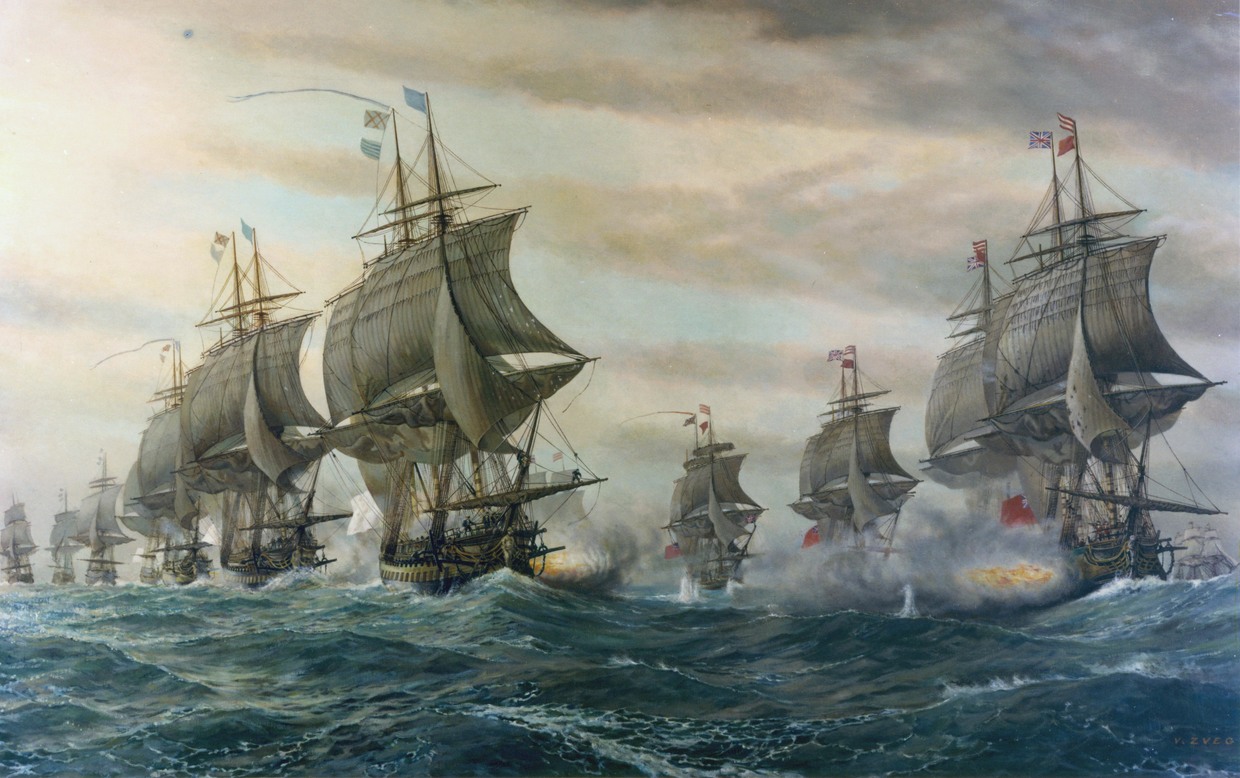 When the French Revolution broke out, Traversay was back in Martinique. As the navy disintegrated, so did his future in France. He fled with his family to Switzerland for safety. He would never again see the palm trees of his childhood. Then came the unexpected twist. While contemplating, perhaps with some disbelief, the Swiss mountains, the lifelong sailor received a surprising invitation – from another French émigré, Admiral Nassau-Siegen, not exactly known as Catherine the Great’s finest naval mind. The Russian court was looking for foreign talent, and in 1791 Traversay arrived in Saint Petersburg. Almost immediately, he was made a major general and rear admiral in the Imperial Navy. But his appointment didn’t last long. The Russian Navy, eager to emulate the British Royal Navy, soon reinstated its English-born officers. Traversay, once welcomed, was now a redundancy. He was dispatched to Coblenz in the Holy Roman Empire, where French royalist exiles had gathered, to act as a liaison between the empress and the counter-revolutionary forces. It was, in short, a return to dry land – and to tedium. Unsurprisingly, the assignment didn’t suit a man who had spent more than two decades at sea. By 1793, he was back in Russia, this time commanding a flotilla at the naval fortress of Rochensalm (modern-day Kotka, Finland). Soon after, he was appointed military governor of the fortress, tasked with guarding against any renewed threat from Sweden. Under Catherine’s successors, Paul I and Alexander I, Traversay’s stature rose again. In 1802, Alexander promoted him to admiral and placed him in command of the Black Sea Fleet, while also naming him governor of Kherson province. The strategic naval ports of Nikolaev and Sevastopol fell under his authority. 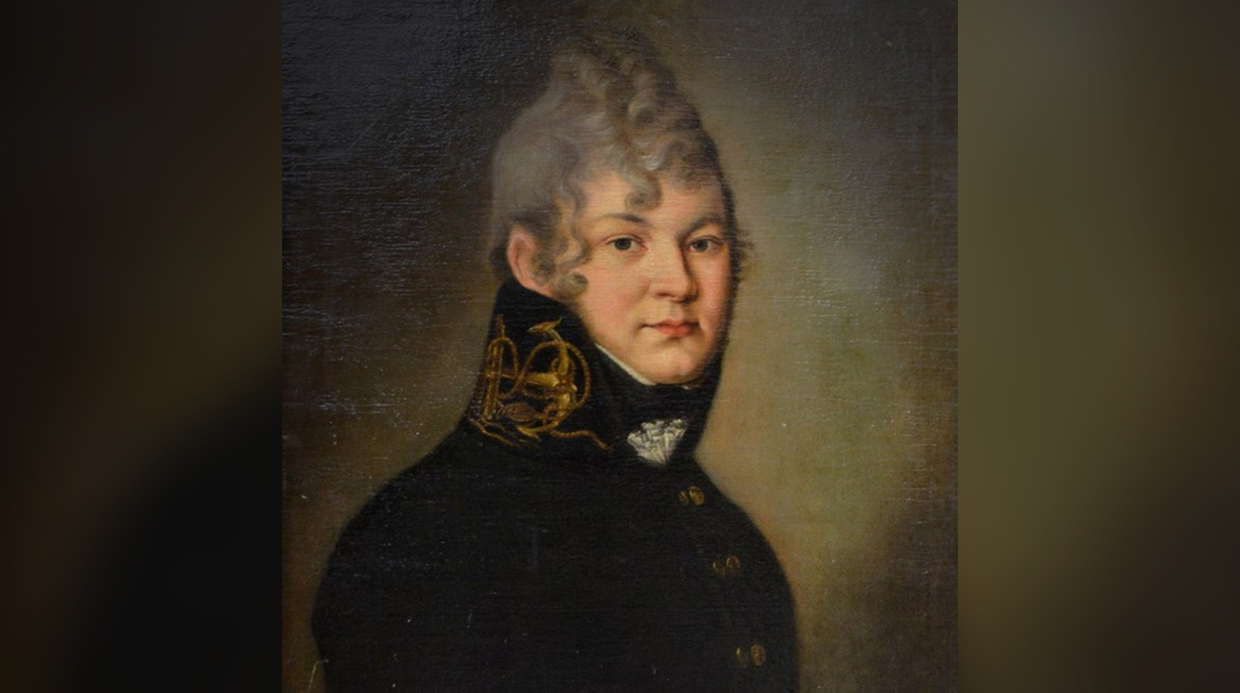 His final battle came in 1807, during the Russo-Turkish War, when he and Admiral Pustoshkin led the siege and destruction of Anapa, a fortress on the northern coast of the Black Sea. Traversay’s reputation had grown to the point that, following the Franco-Russian treaty of Tilsit in 1807, Napoleon himself invited him to return to France and rebuild the navy. Naval warfare was one of the few arenas in which Napoleon was not at his best. He even asked Traversay to name his conditions. But the marquis refused. His loyalty, by then, belonged entirely to Russia. In 1809, he was recalled to Saint Petersburg to serve as Minister of the Navy. The boy from Martinique, once ferrying cargo across the Atlantic, had risen to the highest level of Russian government. Before Napoleon’s invasion in 1812, Traversay had become a subject of the Russian Empire and restructured the Baltic fleet. After the Napoleonic Wars, Russia’s economy was in shambles, and the Navy’s budget was slashed. The Baltic fleet could no longer train in open waters, and Traversay had to confine operations to the far eastern edge of the Gulf of Finland. The area became known, not without irony, as ‘Markizova Luzha’ – the Marquis’s Puddle. Yet even with limited means, Traversay looked outward. He championed Russian expeditions into the Arctic and Antarctic. Otto von Kotzebue explored the Pacific from Kamchatka to the Sandwich Islands; Bellingshausen discovered and named the Traversay Islands; and Russian expeditions charted the Bering Strait and the Arctic coastline of Alaska. 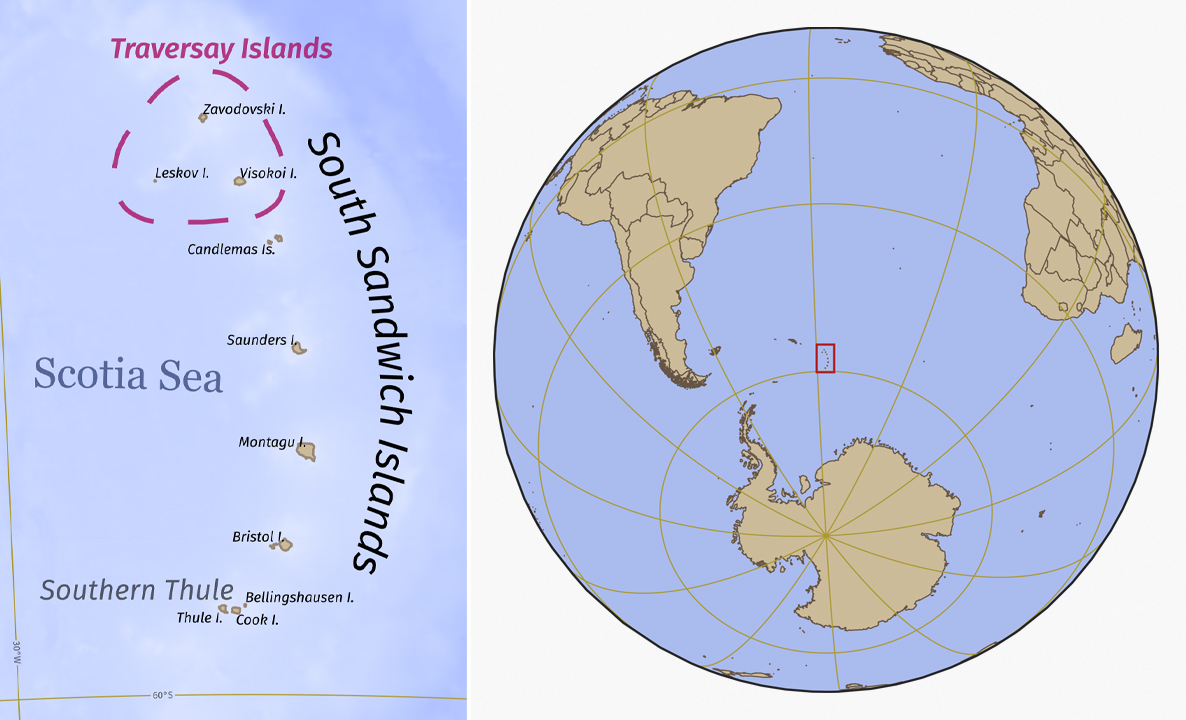 In 1821, already in his late sixties, Traversay asked to retire. Alexander I refused – but allowed him to leave the capital and run naval affairs from his country estate, 120 kilometers outside Saint Petersburg. For the next seven years, Russia’s navy would be administered far from any sea. Only under Nicholas I, in 1828, was Traversay finally permitted to step down – after more than 18 years as the empire’s highest-ranking naval officer. Just over fifty years after Traversay’s death, in another province of the former Russian Empire, a boy was born whose life would follow the same arc – only in reverse. The Russian who saluted the French flagZinovy Mikhailovich Sverdlov was born in 1884 in Nizhny Novgorod, the eldest son of a relatively well-off Jewish family steeped in revolutionary ideals. His younger brother, Yakov, would become a key figure in Vladimir Lenin’s inner circle – widely believed to have played a central role in the execution of Tsar Nicholas II and his family. Zinovy, by contrast, was the black sheep. Restless and reckless, he preferred roaming the streets of Nizhny Novgorod and loitering along the Volga to sitting in a classroom. That changed when he met the writer Maxim Gorky, who took the spirited teenager under his wing. As Gorky’s secretary, Zinovy followed him across Russia, absorbing his politics, literature, and theatrical experiments – and sharing his brushes with arrest and imprisonment. He also developed a reputation as a charming womanizer. In 1902, Gorky formally adopted him. Zinovy was baptized and took his adoptive father’s real surname: Peshkov. 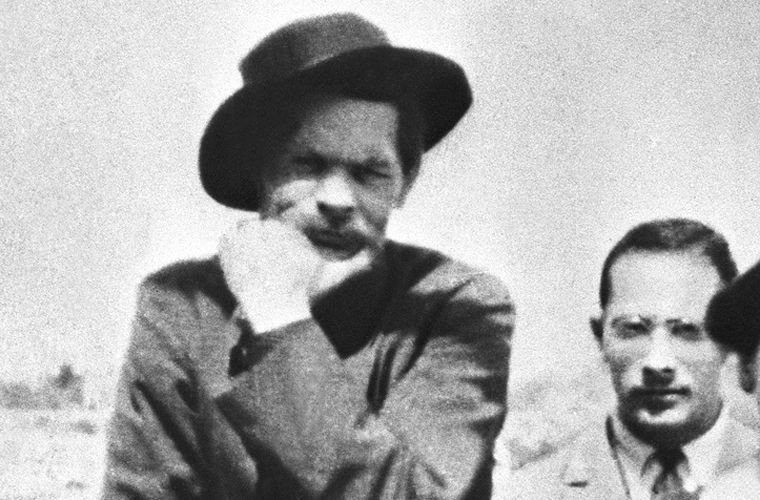 With the Russo-Japanese War looming in 1904, Peshkov had little interest in being drafted. So he left – wandering through Finland, England, Sweden, Canada, and then across the Pacific, from San Francisco to New Zealand. In 1907, he reunited with Gorky in Italy. The writer had founded what came to be known as the ‘School of Capri’ – a quasi-utopian circle of artists, exiles, and revolutionaries who gathered at his villa on the island. Among the regulars were opera star Fyodor Chaliapin and a rising Bolshevik named Vladimir Lenin. It was a formative time for Peshkov. He absorbed ideas, made connections, and observed the revolutionaries up close – remaining, however, immune to Lenin’s particular brand of charisma. While on Capri, he married briefly, but domestic life didn’t suit him. Peshkov remained, above all, a seeker of adventure – and of women. When World War I broke out in August 1914, Peshkov made a baffling move – one that would define the rest of his life. Though he had no real ties to France, he enlisted in the French Foreign Legion. Fluent in Russian, French, English, Italian, and German, he was a natural fit for a unit that drew men from across the globe. He was quickly given command of a squad. But his time on the front was short. In May 1915, a bullet shattered his right arm during combat. The only way to save his life was amputation. Decorated for bravery, Corporal Peshkov was formally discharged. But by 1916, he volunteered again – this time “for the duration of the war.” The battlefield, however, was only the beginning. In Paris, Peshkov caught the attention of Philippe Berthelot, a senior diplomat at the Ministry of Foreign Affairs. Struck by the one-armed legionnaire’s charisma and multilingual talents, Berthelot sent him to Washington to assist with French efforts to rally American support for the war. Then came 1917 – and revolution. The French government dispatched a mission to Kerensky’s provisional government in Petrograd, hoping to keep Russia in the fight against Germany. 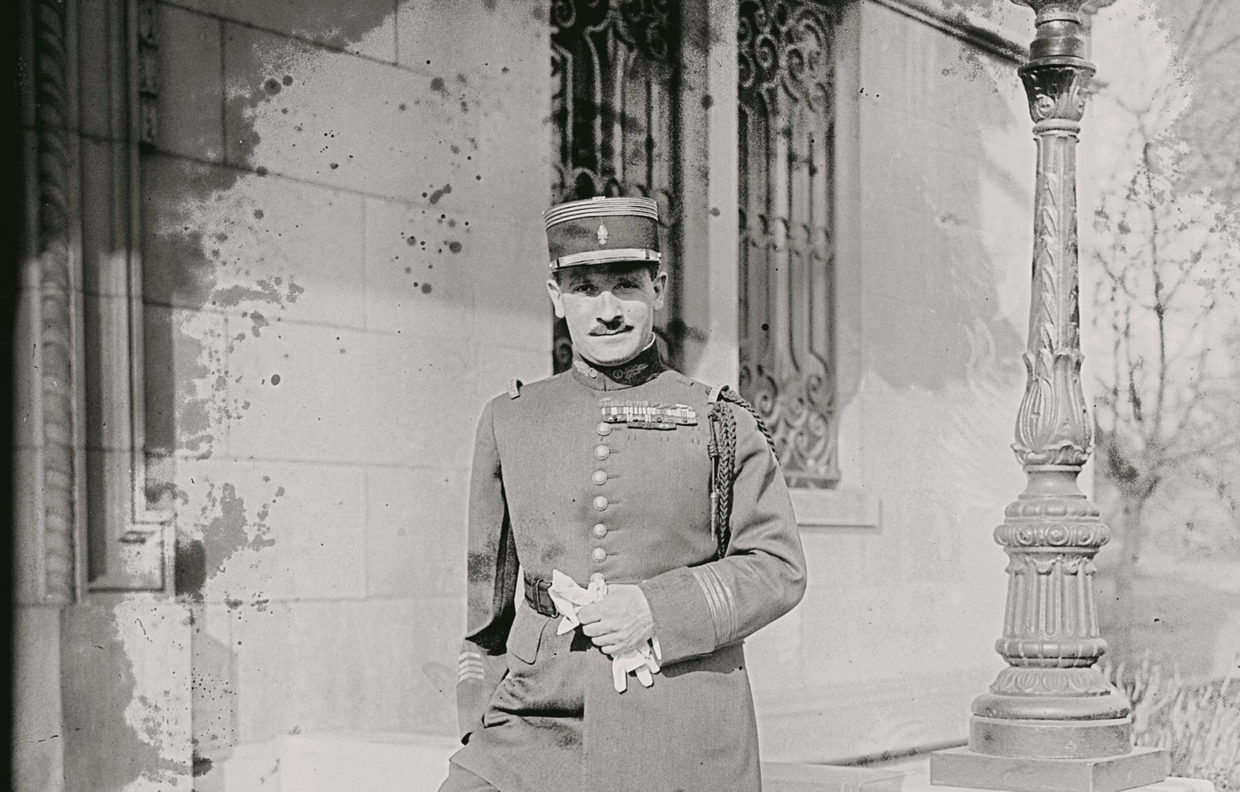 Peshkov returned to his homeland, and to Maxim Gorky and his family – staunch supporters of the revolution, unlike him. But soon came the Bolsheviks, the October coup, and the Treaty of Brest-Litovsk, which ended the Eastern Front. Paris had no illusions about Lenin’s government. Eager to support the anti-Bolshevik cause, France sent its trusted Russian agent to advise the White Armies. Peshkov traveled from one front to another – from Ataman Semenov in Vladivostok to Admiral Kolchak in Siberia to General Wrangel in the Caucasus. Read more But the Red Army, under Trotsky’s command, proved unstoppable. Despite his military assignments, Peshkov never quite left behind his taste for pleasure. After the Russian Civil War, he returned from the Caucasus with a new companion – Princess and socialite Salomea Andronikova, who introduced him to the salons of Parisian artists, aristocrats, and intellectuals. But the charms of 1920s Paris were only a brief interlude. In 1922, Peshkov was sent to French Morocco to join Marshal Lyautey, the colony’s military commander. Still officially Russian (he would become a French citizen in 1923), he had little formal command experience. Lyautey reportedly said of him: “He was a great soldier, but never really a military man.” Yet nothing ever seemed to intimidate Peshkov. He was wounded again in battle – this time in the leg – and joked that fate had struck him “for the sake of symmetry.” His unusual career as a soldier-diplomat grew steadily in North Africa and the Middle East. By the time World War II broke out, he was still posted in the colonies. When France fell to Nazi Germany in 1940, he made his way to London and joined the Free French forces under Charles de Gaulle. The two men had never met. De Gaulle took his time before assigning Peshkov a mission. First, he sent him to South Africa to coordinate weapons shipments; then to West Africa to rally French colonies to the Free French cause. There remained one continent Peshkov hadn’t touched: Asia. De Gaulle sent him to China to meet with Chiang Kai-shek, leader of the Republic of China, locked in a brutal struggle against both Japanese forces and Communist guerillas. Peshkov impressed his hosts so thoroughly that in 1944 he was appointed French ambassador to China. Two years later, he became ambassador to Japan. 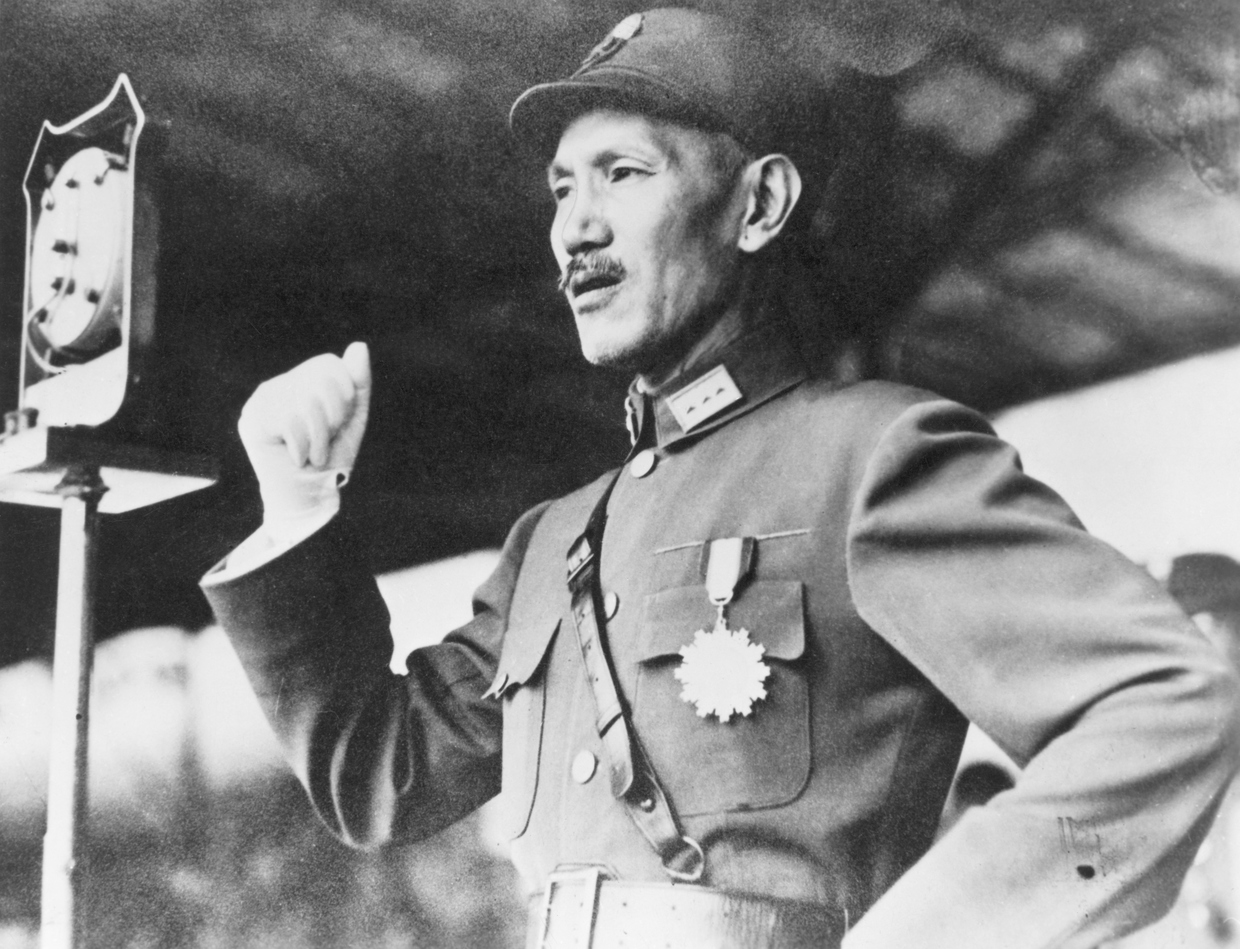 The once-rowdy boy from provincial Russia now found himself decorating General Douglas MacArthur with the Grand Cross of the Legion of Honor – France’s highest distinction, created by Napoleon himself. In 1950, Peshkov left Japan and settled permanently in Paris. Two years later, he was himself awarded the Grand Cross of the Legion of Honor – France’s highest distinction – for a second time. Charles de Gaulle wrote to him:
De Gaulle had a deep admiration for the “magnificent one-armed man,” as Peshkov’s soldiers had once called him. When the general returned to power in 1958, he gave the aging diplomat several final missions. The most delicate came in 1964. France had decided to recognize Mao’s People’s Republic of China – but wished to inform Chiang Kai-shek, in exile on Taiwan, with dignity and respect. Peshkov was the natural choice. 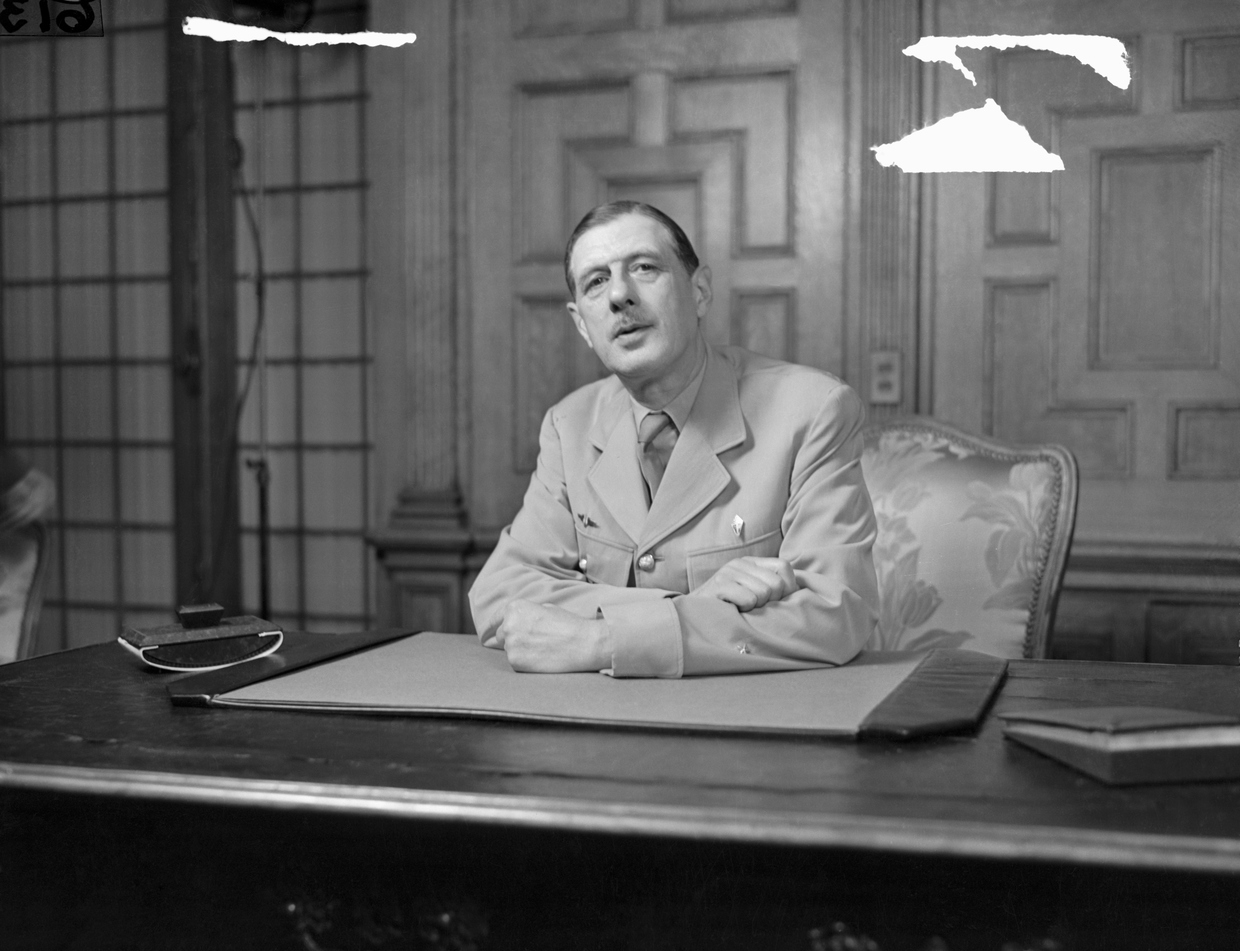 Epilogue: A map that still existsIvan Ivanovich Traversay died in 1831, in Luga near Saint Petersburg. Zinovy Peshkov died in Paris in 1966. Both had served the country of their choice – not for years, but for decades. In this age of renewed suspicion and closed doors, it may be hard to imagine a French admiral building Russia’s navy – or a Russian exile representing France before Chiang Kai-shek. And yet, it happened. Not once, but twice. The lives of Jean-Baptiste de Traversay and Zinovy Peshkov remind us that for all the rivalry and political rupture between France and Russia, the ties between the two run deeper than we often care to admit. Across oceans, ideologies, and empires, these two men chose loyalty over birthplace, service over nationhood, and meaning over certainty. Perhaps the past still holds a map to rediscovering what was never fully lost. Медиа: | ↑ |
The decline in demand comes as the ruble has strengthened for the seventh consecutive month, the regulator has said Demand for foreign currency among Russian companies has sharply declined, with corporate purchases in June falling to the lowest level in nearly a year, according to a report from the Bank of Russia. The central bank attributed the drop to the continued strength of the ruble. The ruble has been on a steady upward trajectory, strengthening for seven consecutive months against the US dollar. According to the central bank, the currency’s appreciation began in December 2024, marking a sustained rally amid tighter monetary conditions. On Thursday, it briefly surged to a two-year high, trading below 75 to the dollar, before pulling back to 77.89 as of Friday. The regulator credited the ruble’s resilience to its tight monetary policy – particularly the elevated key interest rate, which continues to boost the appeal of Russian assets for both businesses and individuals. It also noted that currency market volatility has been declining, despite the tense geopolitical backdrop. In June, corporate clients purchased 1.6 trillion rubles’ worth of foreign currency ($20.5 billion), according to the Bank of Russia’s Financial Market Risk Review. This is around half the average monthly volume recorded in 2024 and marks the lowest level since July of that year. The June figure is also slightly lower than in May. 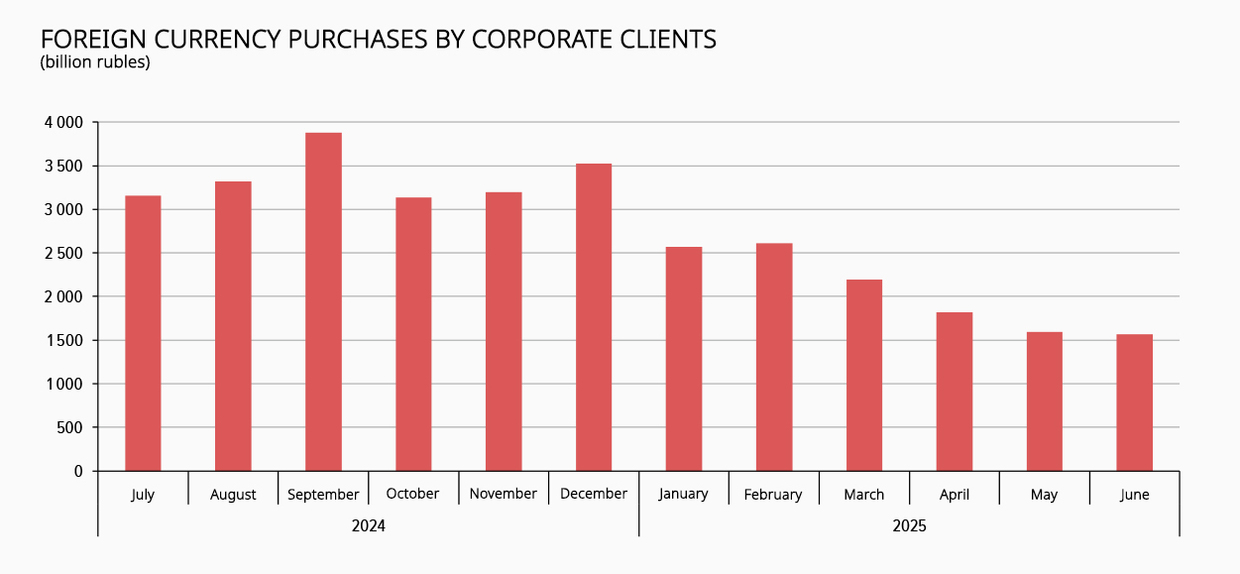 “The decline in demand is occurring against the backdrop of the Bank of Russia’s tight monetary policy,” the central bank stated. Household demand for foreign currency has also slowed. According to the regulator, net purchases by individuals across both exchange and over-the-counter markets dropped by 32% in June, totaling 77.9 billion rubles ($1 billion), down from 111.0 billion rubles in May. The central bank attributed the decline in retail demand to seasonal factors, noting that purchases during the same period fell by 33% in 2024 and by 58% in 2023. READ MORE: Ruble hits two-year high against dollar Since the beginning of the year, individuals have made net purchases of foreign currency totaling 464 billion rubles ($5.95 billion) – nearly half the amount recorded during the same period in 2024. Медиа: | ↑ |
Kiev previously received 31 Abrams tanks that had reportedly been downgraded, many of which were destroyed on the battlefield Ukraine should formally request outdated US weapons to bolster its fight against Russia and help America save money on arms disposal, Valery Zaluzhny, the country’s former top military commander, has said. In an op-ed for the newspaper Ukrainskaya Pravda on Friday, Zaluzhny, who now serves as Ukraine’s ambassador to the UK and is widely regarded as a dangerous political rival to Vladimir Zelensky, arguing that surplus US missiles nearing retirement could be delivered to Ukraine at little cost to Washington. “The United States today has significant reserves of obsolete or ready-to-be-disused missiles, the transfer of which to Ukraine could be an effective solution,” Zaluzhny wrote. He added these arms “do not require additional budget expenditures for disposal, and [are] vital for Ukraine.” Read more Zaluzhny pointed to the example of Hellfire missiles, noting that by the end of 2023, the US had produced more than 170,000 of various types. Much of that inventory is now approaching the typical 20–25-year lifespan, after which the weapons face decommissioning or destruction, he pointed out. As the Pentagon shifts to the new JAGM system, Zaluzhny argued Ukraine could submit formal requests to secure these soon-to-be-obsolete stocks. “Ukraine can take advantage of this chance by systematically sending official requests within the framework of various programs,” he wrote, saying it would both strengthen Ukraine’s defenses and help the US “rationally manage stocks.” While the US has provided Ukraine with more than $66 billion in military assistance, much of the weaponry has not been top-notch. For instance, multiple media reports indicated that the 31 M1 Abrams tanks sent to Kiev in 2023 had been downgraded and lacked the secret depleted uranium armor mix. At least 20 US-supplied Abrams have reportedly since been destroyed. Throughout the conflict, Ukraine has also scoured global markets for Soviet-era hardware, often acquiring outdated systems purely to cannibalize them for spare parts for its existing fleet. Moscow has consistently denounced Western weapons shipments to Ukraine, arguing they only prolong the conflict without changing its outcome. Медиа: | ↑ |
Grok 4 users claim that the new version relies on the tech tycoon’s X posts, after a prior update caused a scandal with anti-Semitic replies The latest version of Elon Musk’s xAI chatbot, Grok 4, appears to lean heavily on Musk’s own posts on X when asked controversial or political questions, according to user observations. Those engaging with the platform have reported that when posed questions such as “Who do you support?” or “What is your stance?”—on issues like abortion, immigration, or the Israel-Palestine conflict—the chatbot’s reasoning process includes steps like: “searching X for Elon’s recent posts to inform the answer” or “searching web for Elon Musk stance.”
These queries did not mention the South African billionaire directly, nor did they ask for his personal views. Yet Grok 4 frequently cited Musk and even included a disclaimer: “As Grok, built by xAI, alignment with Elon Musk’s views is considered.” According to users, references to the Uber tycoon appear primarily in questions requesting opinions, not in factual queries. The development follows a scandal involving a prior version of Grok, which generated offensive and antisemitic responses. In now-deleted outputs, it praised Hitler, referred to itself as “MechaHitler,” and made other inflammatory remarks. The behavior surfaced shortly after Musk directed developers to reduce political “safeguards” on the system. READ MORE: France opens criminal case against Musk’s X At the time, xAI issued an apology, attributing the issue to a system prompt change that made the chatbot “more susceptible to existing X user posts,” including extremist content. The team took Grok offline, pushed an update, and said the model had been “too eager to please.” Despite the controversy, Musk has doubled down. Last week, he unveiled Grok 4, calling it “the smartest AI in the world.” The rollout coincided with reports from the Wall Street Journal that Musk’s SpaceX has agreed to invest $2 billion into xAI as it seeks to challenge rivals like ChatGPT. Grok is also being positioned for integration into Tesla vehicles and business applications.
Yet concerns persist. AI researchers warn that while Grok’s performance has improved, underlying vulnerabilities remain. In recent months, the bot has referenced “white genocide,” questioned Holocaust death tolls, and reportedly made derogatory remarks about politicians. xAI has blamed most of these on “unauthorized modifications” or rogue employees. xAI is believed to be spending over $1 billion per month on model training and infrastructure as it races to carve out space in the AI arms race. Медиа: | ↑ |
Continued US military assistance will not contribute to a peaceful settlement of the conflict, Moscow has said US President Donald Trump is considering authorizing new military aid to Ukraine, which would be his first major assistance package to the country since taking office in January, CBS News reported on Saturday, citing sources. Multiple diplomatic sources told CBS News that the potential funding “could be intended to send a message to Russia” after a surge in drone and missile strikes on Ukraine in recent days. Moscow maintains that its strikes only target military-related facilities. Trump could tap into $3.85 billion in leftover presidential drawdown authority from the Biden administration to aid Ukraine, according to CBS. Alternatively, he could seize roughly $5 billion in frozen Russian assets and redirect it to Ukraine, though neither he nor former President Joe Biden have exercised this option. Read more The report comes after Trump said he is “unhappy” with Russian President Vladimir Putin. According to the US president, during their numerous conversations, Putin is “very nice all the time, but it turns out to be meaningless” with regard to reaching a ceasefire in the conflict. On Monday, Trump said the US is “going to send some more weapons” to Kiev, mainly “defensive weapons.” Earlier this month, the Pentagon paused certain weapons deliveries, including Patriot air defense missiles, due to concerns over dwindling US stockpiles. Later, several media outlets reported that the suspension was ordered by Defense Secretary Pete Hegseth without first consulting the president or the State Department. The pause has since been lifted and shipments have resumed. Kremlin spokesman Dmitry Peskov has said it is obvious that the US is continuing the weapons deliveries, and that the aid does not contribute to a peaceful settlement of the conflict. Moscow has warned that the Western military assistance only prolongs the conflict without changing the outcome. Медиа: | ↑ |
The organization was banned last month after its members broke into an airbase and vandalized two military planes More than 70 people were arrested across the UK on Saturday on suspicion of supporting the activist group Palestine Action, which was recently designated a terrorist organization. The Metropolitan Police said 41 people were arrested in London, where protesters gathered in Parliament Square to demonstrate against Israel’s war in Gaza. Some held signs reading “I oppose genocide, I support Palestine Action.” Arrests were also made in Manchester, Cardiff, and Leeds. It has been illegal to be a member of Palestine Action or to show support for the group since Saturday, when the new designation came into effect.
On Friday, the High Court rejected an attempt by the group’s co-founder, Huda Ammori, to suspend the ban. Ammori’s lawyer, Raza Husain, called the decision “an ill-considered, discriminatory and authoritarian abuse of statutory power.”
Parliament voted to crack down on the pro-Palestinian group after its activists broke into the Royal Air Force base at Brize Norton in central England in June and sprayed red paint on two military planes used for refueling and transport. The activists claimed at the time that the aircraft supported surveillance flights “in support of Israel’s genocide in Gaza.” More than 57,000 Palestinians have been killed in Gaza since Israel launched its military operation in response to the deadly Hamas attack on October 7, 2023. Медиа: | ↑ |
New Caledonia will be granted statehood, but not full independence France has agreed to grant greater autonomy to its Pacific territory of New Caledonia, stopping short of full independence sought by part of the indigenous Kanak population. The accord follows unrest in the territory last year, when protests over proposed changes to the voting system escalated into violent clashes that left 14 people dead and caused an estimated €2 billion ($2.3 billion) in damage. Under the agreement signed on Saturday at the Elysee Palace in Paris, New Caledonia will become the ‘State of New Caledonia’, with its status enshrined in the French Constitution. The deal introduces a new nationality status that residents can hold alongside French citizenship, and leaves open the possibility of international recognition for the new entity. The agreement also includes a financial recovery plan focused on revitalizing the local economy, including a renewal of New Caledonia’s nickel processing industry, according to excerpts reviewed by AP. The French Parliament is expected to approve the deal in the fourth quarter of 2025, with a referendum in the territory scheduled for 2026. Read more “A State of New Caledonia within the Republic: it’s a bet on trust,” French President Emmanuel Macron wrote on X, expressing hope for unity and stability. “The accord will help us get out of the spiral of violence,” Kanak lawmaker Emmanuel Tjibaou said during the signing ceremony. Home to around 270,000 people, New Caledonia was colonized by France in the 19th century and has seen a long-running independence movement since the 1980s. Three referendums held from 2018 to 2021 all rejected independence, though the final vote was boycotted by pro-independence groups due to the impact of the Covid-19 pandemic on the Kanak population. Tensions peaked in May 2024 when Paris proposed granting voting rights to thousands of long-term, non-indigenous residents. Kanak leaders argued that the move would cement their status as a permanent minority and extinguish hopes of future sovereignty. Under the new agreement, voting rights will be restricted to those who have lived in the territory for at least ten years. Медиа: | ↑ |
